#and character A's only two murders (that we know of) were family members heavily implied to have treated them very badly
Explore tagged Tumblr posts
Text
It appears I have once again failed to notice the obvious "villainous character may have been fake crying in impactful interaction with other character for manipulation" option, probably for autism reasons. However, I will maintain that I was also right to ignore it because it's less interesting than the alternative.
Like I get the whole "ooohh incoming plot twist/betrayal" intrigue but come on. Look me in the face and say that's more compelling than the "character who has before shown no convincing empathy is suddenly hit exactly in their empathy weak spot and has no idea how to deal." Especially a schemer character who is used to perfectly controlling themselves. Now they have a weakness! That's a problem for them! It throws a wrench in their plans and they have to adapt! That's more fun than the villain's plan going off perfectly, surely.
#Especially in this case where the “weakness” is around character B suffering through something similar to character A's childhood trauma#and character A's only two murders (that we know of) were family members heavily implied to have treated them very badly#it's framed like a pure power grab on the show#but if we believe that just having to recount their childhood (and watching another character have to face it) makes them actually cry#that adds layers to those first deaths#which again is more interesting than just waiting for a lie to pay off#also the lie theory doesn't make sense as they are pulling this alleged gambit in front of a character that mocks “weakness” in everyone#so affecting vulnerability makes sense with a character inclined to want to help others but not with a character inclined to sneer at them#it's a needless risk#A reason some people may assume evil characters are always faking emotion is because they think genuine emotion is for “good people”#and if one can understand why a character did something or acknowledges that the character has *some* people they don't want to hurt#that means one condones their overall behavior/likes them as a person#anyway the show is#house of the dragon#and the character is#larys strong#in that first scene he has talking to Aegon about living with a disability
8 notes
·
View notes
Text
Re: Blitzø’s self loathing and Apology Tour
tl;dr I hate when writing gets stupid and turns characters into assholes because the writers have to keep characters miserable for story purposes
I understand that part of Apology Tour is showcasing how mentally and emotionally exhausting it can be to continually try and prop up someone who is so determined to be self-defeating. But, while I appreciate the message, it kind of fell flat for me at this point in HB and I’m gonna tell you why because I’ve been thinking about this a lot:
Zero people outside of Cash and Barbie know all of the reasons that Blitzø hates himself, and the fact that Stolas acts like he understands is bullshit.
Stolas never met Cash, and he wasn’t privy to the conversation where his father bought Blitzø for $5 and a slim fit condom. The other members of I.M.P. know Blitzø was in the circus, but they might not even know it burned down, let alone how it happened. Fizz doesn’t know Tilla was killed in that fire, and might not even know that she’s dead at all.
Blitzø was sold like an object for “whatever Paimon’s butler had on him”, and then was emotionally manipulated into committing a crime that he would have been executed for if he was caught. He inadvertently caused that fire because he was extremely upset after watching his father (who clearly abused him at least emotionally and was constantly forcing him to prove that he loved his own family) give his best friend/crush a card that said he wished Fizz was his son (‘instead’ heavily implied). And no, this is no excuse for Blitzø’s behavior as an adult, but it is very clear that he was abused as a child and no one outside of his immediate family either noticed or cared.
And can we talk about the fire for a second? Obviously, the most tragic part is what happened to Tilla and Fizz; the fact that Blitzø believes he murdered his mother, one of the only people who has ever known him and loved him simultaneously, and mutilated his best friend because of some subconscious jealousy bullshit, is enough to break a normal person. But that isn’t all that happened. That circus was both the livelihood and the home of everyone who worked there. The fire completely destroyed the lives of everyone there. And what about the circus animals? How many of them died because the employees were too busy getting themselves and each other out to even bother with the animals who were likely locked in cages?
Don’t get me wrong, Blitzø needs to talk to someone about this. He needs therapy, very badly. But that isn’t what’s upsetting me.
The two things that are upsetting me are the fact that Stolas was so dismissive when Blitzø actually managed to admit he had self loathing issues (he didn’t manage to say it to Fizz), and the fact that Stolas treated Blitzø like he was being an asshole for not treating an annual party dedicated to hating him and burning him in effigy like it was proof people care about him.
During the first scene of AT, Blitzø asks if Stolas wants him to admit that he struggles with apologies because he hates himself, and Stolas says “well, yes” like this is old ground that they’ve trodden many times before. But it isn’t. Blitzø has had very few moments of emotional vulnerability in the show (crying on the couch in front of Loona, apologizing to Fizz, and confronting Barbie in front of Moxxie are the only instances I can think of). But the rest of the time, he presents himself as the most self-assured asshole you’ve ever met, someone who’s too full of himself and too arrogant to consider that other people might have feelings or that he himself could ever be wrong. And this is very bad, but Blitzø’s problems stem from the fact that everyone thinks he is the literal opposite of self-loathing.
The closest Stolas got to seeing real vulnerability from Blitzø was when he was terrified of going on camera, but that was stage fright, and Stolas never even asked why he stopped performing or became scared of doing it, and Blitzø got over it very quickly once he was out there (as is typical of performers and stage fright). The Full Moon was the first time Stolas saw that level of emotional vulnerability from Blitzø, and by the very next morning, he was acting like they’d already been through this a thousand times.
I don’t know what’s being suggested here, because they’re both kind of terrible. Either Stolas never noticed that Blitzø hates himself and, once Blitzø admits it, he doesn’t really care; or Stolas noticed before the admission, and he did absolutely nothing about it.
And, my god, fuck the sentiment of “this house is full of people who cared so much that they throw a party every year dedicated to hating you”. Not only was Blitzø’s point that he was struggling to believe royalty could care about someone as socially “low” as him (as well as someone like Stolas caring about someone who is as much of an asshole as Blitzø knows he is), there is nothing affirming about being hated. Some of the people at that party had interacted with Blitzø for, like, 30 minutes, and we know this because he made out with Dennis once and then rejected him and this was apparently enough to get Dennis to the party. If Stolas actually does care about Blitzø and knows that he hates himself, why would it be anything but a terrible idea to point out to him “yeah, your self-loathing is completely warranted, because this party is fucking packed with people who also despise you and they didn’t even need to know you for more than a few minutes to decide you were so awful that getting together every year for the express purpose of hating you was a good idea”?
Both Stolas and Blitzø were terrible in Apology Tour, but Blitzø was at least the same kind of terrible he’s been for most of the show, with the added benefit of seeing that it’s a mask that’s quickly cracking. And no, obviously, Stolas is under no obligation to either listen to Blitzø or forgive him, clearly. And Stolas was well within his right to go dance with or fuck that handsome incubus. But for Stolas to listen to his vulnerability and then dismiss it, for him to listen to Blitzø apologize and then ignore it, for him to refuse to acknowledge that Blitzø put himself in a very physically and emotionally dangerous position by coming to that party just to talk to Stolas, is bullshit. And, outside of the song in the episode, Stolas also seems to be doing absolutely zero self-reflection on what parts of the Full Moon conversation going wrong might have been his fault.
As someone who sometimes struggles with self-loathing, I understand that it can be difficult on my loved ones and I’m not saying Blitzø shouldn’t own the parts of this struggle that are within his control. But I really need Stolas to recognize that he doesn’t understand, he doesn’t know Blitzø the way he thinks he does, and that if he wants to have any chance of understanding he has to at least try and listen before Blitzø stops trying to open up to him.
I know this is a writing problem. I know the writers are trying to maintain the status quo of their breakup, and apparently the only way they can do that and still have them interact is by making both of them unbearable. But Blitzø confronting and dealing with his feelings about himself is one of the core themes of the show, and it’s infuriating to see his love interest be so flippant about it from the moment he even learns about it.
#helluva boss#helluva boss thoughts#helluva boss analysis#apology tour#helluva boss apology tour#helluva blitzo#helluva stolas#helluva stolitz
24 notes
·
View notes
Text
“UNDER”
Which way will you throw down your weight? To be the deceived, or the deceiver.
Let's have an objective conversation about the deceiver, the snake, the ever-self-absorbed masquerading as the selfless.
Shidou Kirisaki
I was discussing Shidou in private with @tsuwmya and the response I received encouraged me to post my objective thoughts on his character and actions.
First let's talk about Shidou when it comes to his relationship with children. Shidou is bad with children and Milgram has done everything in its power to display this fact.
In Throw Down Shidou's main and only focus is on saving one individual. Someone who is very clearly shown to be a fully grown adult or adult sized.

Outside of this portrayal of the individual in Throw Down looking adult sized which could be considered abstract in these instances. The bed we're shown in Triage is literally just a different bed entirely from this one-
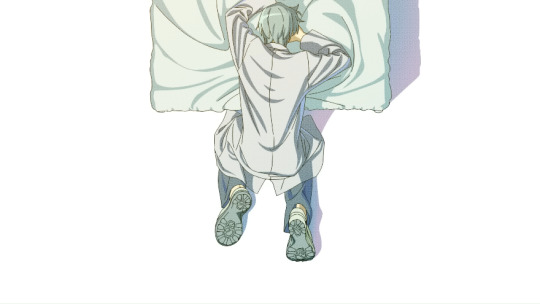
And Milgram does nothing to hide this information.
This is the sight we're shown when the death of a child is heavily alluded to. Clearly making these two separate instances and possibly two different family members.
This displays that the person in the first bed- The one he is trying to save throughout Throw Down is more than likely his wife and not either of the children. To take it even further the flowers meant to represent his victims throughout Throw Down are in full bloom and the food that represents them in Triage is ripe as well.
Further implying that most of his victims were adults or at the peak of their lives.

This imagery can allude to his victims being perfectly healthy as well as these things only wilt or rot after Shidou interacts with them. Because a plucked/cut flower can only live so long even if you put it in new soil.

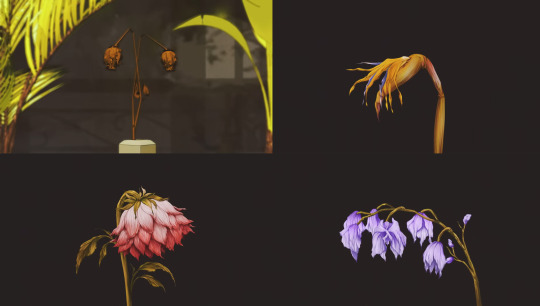
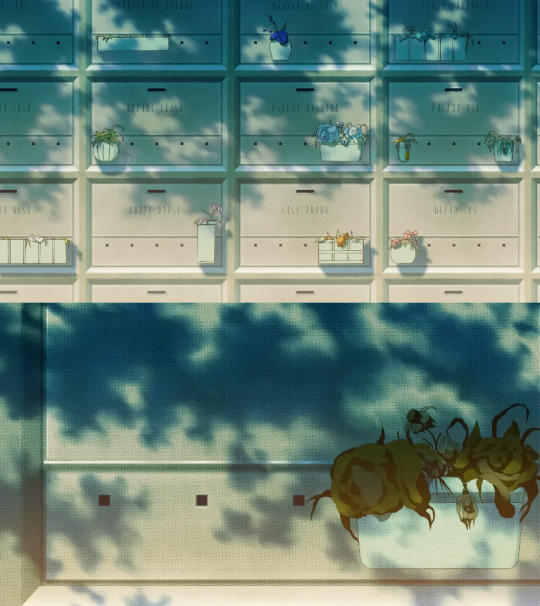
And no one can still have their cake and eat it too. Once it's eaten, it's gone. Once it's been cut into, it begins to spoil and lose its flavor.
"It becomes more and more diluted, it doesn’t have any flavor even if it’s chewed. If it’s not needed, I’m not interested."
Before we see his wife, before we see his kids, before any moments with family we see Shidou getting the necessities in Triage. We see him getting food. The food is highlighted before we even see his loved ones.

After it's alluded to that he lost his family in Triage something that should be a tragic scene where his kids or his wife should be the focus. The bed is empty, there's no one to be seen outside of himself/someone who may just look like him from behind. Either way we're just seeing him.
No wife, no kids, or kid.
Then immediately after this image of loss what do we see-
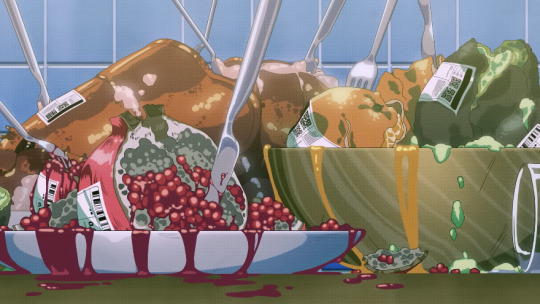
The food going rotten. It's spoiled now. Everything is ruined. It's gone to shit definitely but even when it has, his family is still an afterthought to him. They come after the food, after the dead flowers.
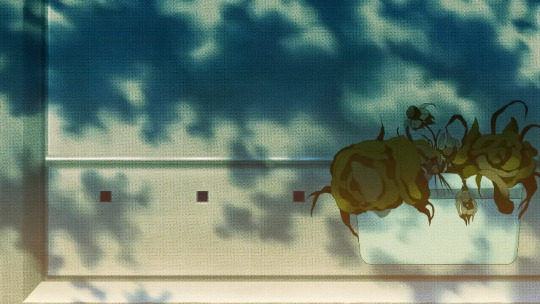
They always came after the necessities. They always came after his work. They were always a convenient excuse for his actions-
"Now slowly close your eye, put your regret on display wish for being there for someone."
Just like the feelings of Shidou's victim's families came as an afterthought to tack on when he saw Es had reservations about just finding him guilty immediately and killing him like he wanted.
"The death penalty is what I'm hoping for. Thank you in advance."-3:31 "If you want to hand down the correct punishment for me, then all you have to do is put an end to my life. It'll be over in the blink of an eye." You're being annoyingly persisten, Shidou- Know your place here! "Please listen to me, Es. I've killed people. Lots of them as well. It was for such a selfish reason too. I'm a fine specimen of what a murderer ought to be." I really don't... get you. "If you don't put me to death then neither the people I've killed nor their families will be at peace. Don't you think so too?" 4:39-5:10
From the beginning Shidou displays that dying is something that he wants. Something that he's seeking. Because he wants to be at peace he wants to be reunited with his loved ones. It's not because he genuinely feels remorseful about what he did, cares about the fact what he did was wrong, selfish, and hurt many people. No, it's still about him and everything he tacks on after is just there to justify him getting what he wants.
Milgram displayed from the beginning that Shidou wants to die but he doesn't want to take his own life. If his end goal is being able to reunite with the people, he cares about in the afterlife.
To be reincarnated and see them again-
Q.19 What do you think happens to people after they die? Shidou: I like the idea of reincarnation. I hope that’s what happens.
Then he cannot religiously commit suicide. The implication through the mention of reincarnation is that Shidou is either a Buddhist or Hinduist both religious beliefs do not condone suicide. Except for Hinduism which condones it only on the grounds of religious reasons which Shidou does not have. Both state that taking one's own life can impact reincarnation.
It's really funny to consider that Shidou is trying to get Es to kill him based on religious grounds that he's been fully open about yet for some odd reason the only person being persecuted for their religious beliefs and how they adhere to them is the child.
Shidou has also shown his desire to circumvent or skirt passed this rule- Very openly in the portal timeline.
20/05/26 Kazui: Ahh, this old man’s gonna go and smoke in the corner a bit. I checked with the guard, and apparently we can use our free time however we want. Man, I’m glad this place is so relaxed. Shidou: ……! Are…… we allowed to smoke……? Kazui: Huh…… Shidou-kun, was it? You smoke too? That’s kinda unexpected. Shidou: Ah, yes. ……I only started fairly recently though. I’ll go with you…… to smoke. Futa: Ahh, those old men really stink of tobacco. Are they idiots or something? They should know better at that age…… If they really can’t cope without relying on something like that then I worry about their sanity. Yuno: ……it doesn’t really matter does it? They’re making sure they’re staying far away from the people who don’t smoke. Personally I quite like the smell anyway. Futa: Huh!? What are you talking about? It means you’re more likely to get sick, it costs money, it’s a nuisance for everyone around you, what’s even the point. Our tax money is being wasted going towards paying for that, you know? If you were really smart, you’d know not to smoke at all! 20/06/20 Mikoto: ……oh, so you are here after all. Shidou-san, are you free? Let’s chat~ Shidou: ! Ah, just give me a moment…… Um…… I don’t mind talking, but you didn’t need to come over while I was smoking. Are you sure it isn’t too smoky for you? You’re not a smoker, right, Kayano-kun? Mikoto: Ah, you don’t need to put it out! That’d be such a waste!I smoke too occasionally. Though just vape. Like, the smoking room is a really good spot for communication, right? So I thought now might be a good opportunity to talk with you. Not like I have anything else to do. By the way, I’ve been wondering for a while, but do you always wear those gloves? Shidou: I don’t…… How to put it…… I suppose…… since I have my hands covered all the time, then when I take them off, it feels as though the feeling in my fingertips is even greater…… I know it’s probably all in my head…… but that’s how it feels. 20/08/04 Mikoto: By the way, why did you two start smoking? For me it was just a means for communication with people at work. Kazui: Hm? I don’t really remember…… It’s maybe changed nowadays, but in the past it was just natural for everyone to smoke. What about you, Shidou-kun? Do you remember? Shidou: ……I wonder. I suppose…… I just wanted to do something that was bad for me. Mikoto: Ahh, I kinda get that. It’s like eating instant ramen in the middle of the night. Q.20 What do you think about smoking? Shidou: I often get stopped and told it’s bad for my health. I smoke because I want to be unhealthy, though.
Shidou admits to only beginning to smoke recently and that he's only doing it to be unhealthy. He recognizes that smoking is dangerous and unhealthy not just for himself but those around him. Just as Futa points out.
This is indicated by how quickly he goes to put his cigarette when Mikoto comes over to the smoking area. The area literally designated for smoking which would mean anyone going to it would rightfully expect those to be ya know smoking. Even still he quickly attempts to put it out.
Showcasing just how new of a smoker he is along with the fact that he doesn't want to ruin anyone else's health but his. Then he just bluntly states when asked why he started smoking that he just wanted to do something unhealthy.
Because he is purposely trying to make himself sick and die. Because he believes that would be an indirect enough method for him to die by despite it being his choice to do this that it wouldn't technically count as suicide-
This guy is trying to pull a technicality on the fucking gods. He's basically going if the rube goldberg machine I built kills me because I purposely trigger it I'm still not technically killing myself. However, he doesn't just want to die. He wants to die with-
"Emotions with no color I wonder if I can die with it still left."
He wants to die indifferent to his behavior. He wants to die feeling nothing about what he's done and for that purpose he used Mahiru as an excuse for why he needed to be innocent.
"That’s right, there are lives that need safeguarding. So hey, prolong my life, I’m indispensable."
Because he's seen what a guilty verdict does. He's seen first-hand the mental stress it causes to people. The regret it drags out. He doesn't want to feel that. he wants to die not feeling that and from the beginning he's known-
"Hm... But this place does smell of the dead though. I'm sure that some sort of death will lie at the end of Milgram."
He's willing to wait for it and receive the regretless death he wants. In order to get that, he's more than willing to do the same thing he did to people before to someone Es cares about to change their mind.
"If you don't put me to death then neither the people I've killed nor their families will be at peace. Don't you think so too?"
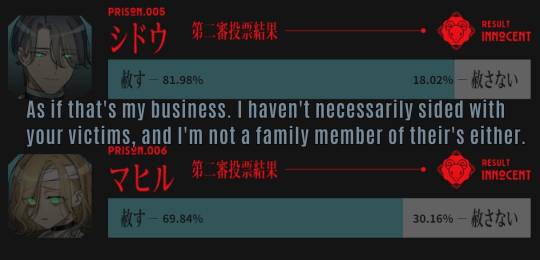
X
Well, moving on from that to the topic of him with children overall due to all that he's been through.
Shidou is bad with children that much is clear from how he interacts with Amane in the Portal Timeline. However, Triage just makes this more apparent with his interactions with his own children.
By that I mean the lack of them. Instead of seeing him spend time with his kids we mostly see him spending time with his wife. We see him cooking with her, going on walks with her, and outside of when he hugs his children upon getting home the only time, we ever see him with the kids after that is when they are all together.
It's after Shidou is shown thinking about the kids playing by themselves that he sings,
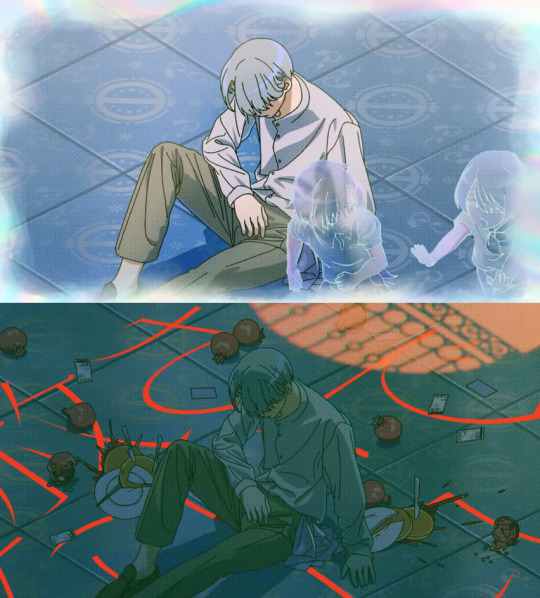
"I yearn to be found “GUILTY”."
However, when he thinks back to the time, he spent with his wife walking with her alone it turns into-
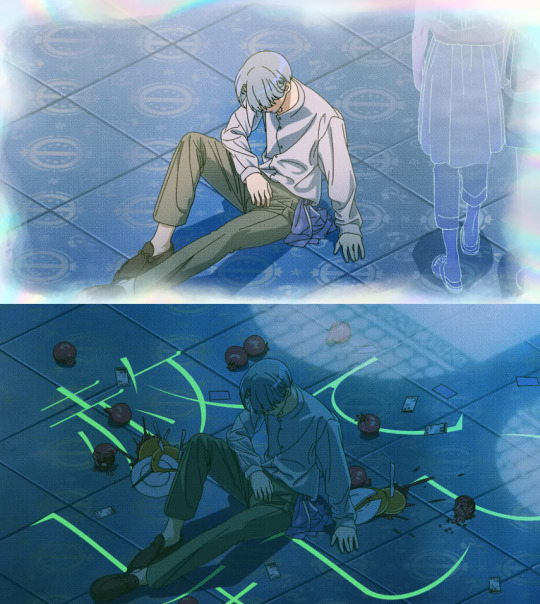
Showcasing what Throw Down put on full display that Shidou threw down his duties as a father in favor of trying to do everything within his power to save his wife. He neglected to watch his children properly in favor of working towards saving the love of his life and his kids ended up paying for it. He says so plainly in Triage-
"Those cards of promise I discarded were they retribution for my incessant taking."
And Throw Down goes even further to allude on this.
"“Throw down” connecting you with me. To keep you alive, you are still living. “Throw down” the invitation that I can’t take back. Lying, replacing with hope." "“Throw down”, someone’s value cannot be the same as another “Throw down” should choose between superiority or inferiority. Has come true, stabbing the despair to death."
Even his very first glitched character voice line-
"Ah, ha, ha, ha- Not dead... Yeah, she's definitely not dead... I finally understand the value of what I've been robbing people off."
Hell, here's all his voicelines in a resonable order from the first character voiceline trailer, second, and the second trial teaser trailer.
"Have you ever taken out a person’s insides? The weight of a human life, there’s no difference between people. And therefore…… I will save the lives I want to save. You're in my way...hurry up and die. Ah, ha, ha, ha- Not dead... Yeah, she's definitely not dead... I finally understand the value of what I've been robbing people off."
Shidou fuck them kids Kirisaki everyone. Both of his kids are male presenting the only she we see in his videos is his wife. His only focus was on saving his wife. This is why he says this from the beginning-
"I've killed people. Lots of them as well. It was for such a selfish reason too."
Shidou has perfectly illustrated that his understanding of children is that they should be seen not heard. Stay in line of sight, don't cause trouble, help out if you can, and be quiet. When he came into Milgram he was remorseful due to how his neglect led to the death of his children. How throwing himself into his work and trying to save his wife led to him losing not only her but both of their kids.
His family is important to him now-
Q.04 What is important to you? Shidou: Family.
Because he didn't appreciate them enough when they were around. He took it for granted thinking they'll always be there later. I just have to do this first it's important. I'll make time after this is done.
Q.07 Is there anyone you’d leave behind if you died? Shidou: Not any more. Q.08 Is there anything more painful than death? Shidou: The death of someone you love. Q.09 What do you want from a lover? Shidou: I want them to stay healthy. Q.14 If there was one person you could bring back from the dead, who would you choose? Shidou: I can’t choose.
Only no longer able to choose between superiority and inferiority in the case of choosing between people he loves. Because he now knows the pain of losing them. I guess doing things like that is harder when he actually humanizes the people he's doing it to, huh? Convenient.
This warped relationship with his own children is why his interactions with Amane are so stunted. Mainly focused on what children should like and how they should act instead of accepting that Amane is her own person. Because he was not responsible for taking care of his children's emotional needs. He was not the one consistently present for that his wife was.
Q.19 What was your partner like? Shidou: A strong person. I tend to be a bit careless in my personal life, so I was always relying on her.
This is also why Shidou's behavior does get to Amane in a way and we see him being given a seat in the counsel even if he does sort of just pop up uninvited. Because Shidou is like Amane's dad and she recognizes this.
Amane's father is out for work frequently trying to do something that he believes will make the world a better place. Doing difficult and demanding mostly underappreciated work and when he does come home he more than likely acts like Shidou.
Q.01 Why did you choose your current job? Shidou: I wanted to do something that would be of use to society. Q.15 Do you think you’ve made a contribution to society? Shidou: I used to think my work was a contribution to society. Q.02 Who do you look up to? Amane: My father. He’s been away on a trip for a while, but I think that’s very honourable of him. Q.13 Who do you want to see right now? Amane: My father. I want him to praise me for all my hard work. Q.10 What was your father’s job? Amane: After a lot of hard work, he became a lecturer I think it’s something to be proud of.
Dotting on Amane for the limited time he has with her when he is home from working. Because Shidou was like this before and it didn't turn out well he was trying to rectify his past mistakes by being their for Amane at the start of Milgram. Yet feel into the same old habits as soon as there were more important things to take care.
He's similar to Futa in that regard. Since he tries to be there for children more from the start of Milgram as well and has gone more into that it seems as a result of his verdict. While Shidou has fallen back into his own self-centered nature. Only using the safety of others to excuse moving towards his own goals.
With no real guarantee that he'll actually help them or not outside of trust me I'm a doctor. This isn't even touching on the fact that Shidou is not medically permitted to diagnose brain death and states as much in his second voice drama-
"This may be out of my profession, but her mental health is deteriorating as well."
He is literally not allowed to diagnose this on his own and neurologists are meant to be involved in some capacity when diagnosing this. Something that he is not.


"“Throw down” ethics is a delusion."
So, he would not know if they were actually brain dead or be allowed to pass down that diagnosis to family members at all. Because, again, he is not qualified to diagnose that on his own. However, pushing that to the side.
Shidou is not treating Amane differently because she is misbehaving right now, or because she's not the child he'd expected her to be, or even because he doesn't like kids. A person can like children and still be bad with kids. Shidou Kirisaki is just bad with children. He was bad with his own children and he's still bad when it comes to the children within Milgram. His behavior comes off as condescending and he stereotypes kids. Believing that if one kid likes something all kids will.
A very hit and miss way of dealing with children or anyone for that matter. Because one would not be treating the child as an individual with their own feelings and interests and due to that overlook or miss that child's individual needs entirely. He's inattentive in his personal relationships.
He takes them for granted, frequently tending to hyper-fixate on higher priority things just to end up straining or neglecting his personal relationships entirely. On top of that he's just objectively fucking evil and selfish. Never really understanding the value of what he was taking from others until it was ripped away from him. Then upon feeling that pain making it everyone else's responsibility to give him the ending he feels he deserves including another child like Es.
Because he can't handle living through what he made multiple other people go through and again he wants to meet them again in the next life so he can't really take himself out in this situation. I didn't vote Shidou Kirisaki Innocent this trial because I thought he would change. Because I trusted him to keep his word. I voted him Innocent beccause I wanted him to live with what he put other people through. I refuse to help him alleviate his pain and get out of the consequences of his actions.
If he wants to go so badly, he's going to have to do it himself instead of once again leaving the tab to other people. When I heard him sing this-
"So, this is unpleasant. So, this makes me sick. What do you mean INNOCENT? If this is my punishment- Now I see, this world is cruel and merciless."
I thought yeah you fucking live with that dick. You think you can just get a convenient out as the people whose family you admit to killing multiple times- have to live in a world without their loved ones. No, fuck you. Have a nice life with reaping what you fucking sowed.
52 notes
·
View notes
Text
FILM REVIEW: Five Nights at Freddy's (2023)
As a FNAF fan, this film finally getting released made my year. A comfy night me and my little brother spent using the movie tickets I won at a coffee cart raffle, eating candy and popcorn and then having Thai takeout to wrap the night up. A nostalgia trip for both of us.
WARNINGS FOR: heavy plot spoilers for the film and original games, mentions and descriptions of gore, child death, child abuse (physical) and blood
POSITIVES
And that's really what this movie is, a nostalgia trip. Because I want to make one thing clear. If you haven't seen anything about FNAF, especially the silver eyes trilogy of novels, you probably aren't going to enjoy the film. If you only know fanon information and nothing about the canonical lore you probably aren't going to enjoy this film either... that's two things (/ref).
The final 'twist' isn't well set up because that's not what they were trying to do. From the very start a FNAF fan knows that 'Steve Raglan' (played by THE Matthew Lillard! One of two original Ghostface killers!) is absolutely William Afton. The final fight is just fan service for us fans and not a well plotted, set up reveal. What's the point of it? Acting as if we don't already know?
The choice to make the characters like Mike, Abby, Garrett, the missing children, Vanessa, etc parallels of existing characters in the FNAF universe instead of new people or exact adaptations is something I actually liked as well. I've heard some people are confused about it or just don't like it but a lot of that comes from expectations before the film released.
A LOT of people had it in their heads that the movie was going to be some hardcore jumpscare and gore-fest because "FNAF is so dark!" when... let's be real here. The darkness of FNAF has always come from lore behind the games and not visual representations of it. The closest we've ever really gotten to gore is some red pixels during one of the FNAF 3 minigames depicting William Afton's death in the springlock suit.
It's 2023 we can like kids horror either out of nostalgia or genuinely thinking it's good. Plenty of adults like Goosebumps and whatever. This movie was never going to be an R16-R18 horror. Imagine cutting off a good 3 years of your fanbase for 'accuracy' that isn't even accurate! Knowing how trapped and lost the missing children are after having their lives cut so short by such a selfish monster is already dark and way more accurate to how the games handled the lore.
It probably doesn't help that Scott helped work on the film and considering he's a devout anti-abortion, donating to homophobic politicians in secret Christian I doubt he would've been okay pushing the gore too far.
If anything, the lighthearted tone touching on the missing children still being actual children and not just murder machines makes the few gore and blood scenes even more shocking. The aunt's team of vandals getting attacked, the babysitter getting CUT IN HALF and the springlock scene at the end of the film are all good at raising the tension in such a colourful environment focusing on a family focused story.
CRITICISMS
The only two things I could criticize are:
1) Elizabeth Lail's acting. As Vanessa, she's noticeably more... exaggerated than her other cast members who all try to come off as realistic as they can for their characters. And not in a Renfield or Jack Griffin type of way where they're just purposefully odd or straight up nuts compared to everyone else. Just some of her line deliveries are a bit 'off' or even a little cringy? It's not that big of an issue and you don't notice it most of the time but I thought I'd mention it.
2) The lack of context for Vanessa and William's father-daughter relationship. It's heavily implied that William abused Vanessa as a child. Seeing how he behaves around her even as an adult, treating her less like a person and more of a tool or a verbal punching bag and with his track record with his kids in other universes (slapping daughters and gassing sons with hallucinogenic gas really doesn't get you father of the year) and the fact he gave a dead kids toy to his own kid as some fucked up 'trophy', it's pretty obvious.
But we really don't get any deeper context for her behaviour during the film specifically. Vanessa constantly lies and hides information in the film and it comes off as very, very annoying for a while. We can see by the end that William put that behaviour in her as a child so he wouldn't be caught murdering kids because his daughter told people what he was doing. But we never get to see much of this other than the brief confrontation at the final fight so it's harder to sympathize with her almost getting Abby killed. The movie's pacing is good so I think they could've pushed a few extra scenes in with her and William without slowing anything down. We all knew who he was anyway and they didn't have to reveal she was his daughter before the end because in the games she's already a brainwashed follower of his ideals.
WOULD I RECOMMEND THIS MOVIE?
Yes! It's fun, colourful and good for people who don't like non-stop nasties for a movie night but are still interested in something tense. Just don't expect to love it nearly as much if you know nothing about FNAF or the canon lore ("why is Cassidy not a girl?" "why is Cassidy blonde?" tiktok comments are starting to get to me)
A fun watch for fans and light horror fans :)
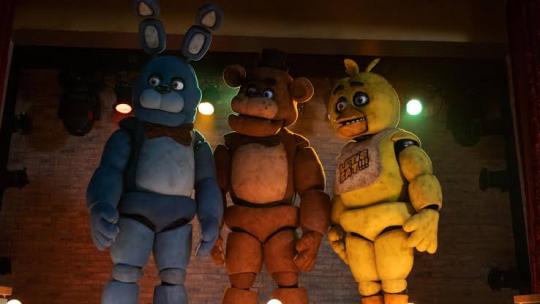
#horror film reviews (2020s)#horror film#horror movie#horror films#horror movies#film review#horror film review#fnaf movie#five nights at freddy's movie#fnaf#five nights at freddy's#horror#horror fan#horror blog#2023 film#2023 horror movies
5 notes
·
View notes
Text
Guardian rewatch: Episode 3
First of all, wow. When I decided to post those online, I was expecting that they would be read by two people, both of whom I personally know. It was in equal part surprising and terrifying that so many of you ventured here. Thank you for reading, I really appreciate it.
Episode 3 is probably my favourite case. It’s not perfectly strung together, there is little actual investigative work in it, but it’s a beautiful story of boundless love and devotion, which echoes through the relationship between our protagonists
Professor Shen is looking at some materials that are looking suspiciously like research into something supernatural, when Zhang Ruonan makes an appearance at his office, claiming that she is absolutely fine, while clearly being very far away from fine. This is something Shen Wei can certainly relate to, because he is the king of hiding his ailments from others.
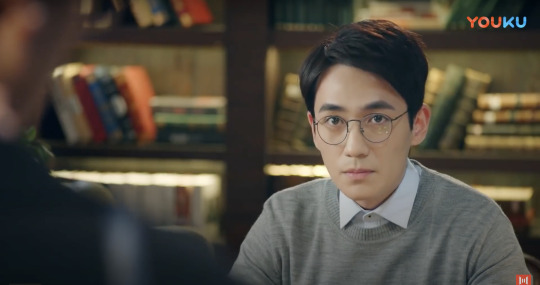
Zhu Hong’s one-sided affection for Zhao Yunlan starts to show already in this episode: while he has the cold, she nags him to take care of himself, shoves tissues into his hands, and presses him to drink his meds. It’s easy to imagine even this early on that she will be the woman drunk dialling him one day.
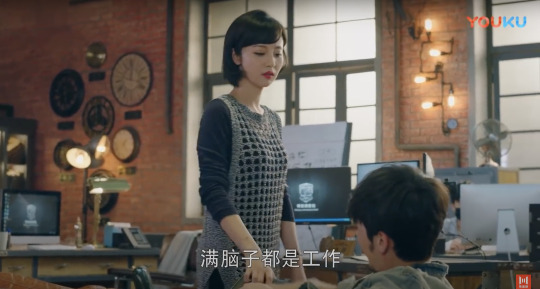
I know this could be seen as straightbaiting, but I honestly thing that the actual purpose it serves in the show is the opposite; I’ll talk more about it when we get there.

Zhao Yunlan spends a lot of this episode in Shen Wei’s office, starting with this scene, in which is obviously flexing. Not only does he sneeze all over the office, he goes to eat Shen Wei’s cake after specifically being told not to eat it. He also takes his opportunity to mix questioning with flirting, as is his usual way. He keeps eye contact while spooning cake into his mouth, as he explains, jovially, that another mysterious death on his campus cannot possibly be a coincidence. And, to be fair, he is not really wrong. We are meant to believe that this is all set in motion by Zhu Jiu, aka the least scary villain in the history of villainy, and an owner of your staple baby goth wig. I will not mention him again until the plot makes it impossible for me not to do so.
Zhang Ruonan comes in, and Zhao Yunlan introduces himself as Shen Wei’s good friend. Which is half-way between a flex and an act of kindness. On one hand, he could have said he was from the police - which would be absolutely true - and risk tarnishing the professor’s good name. On the other hand, he could probably look less pleased with himself. Shen Wei, at the very least, looks neither grateful, nor amused.
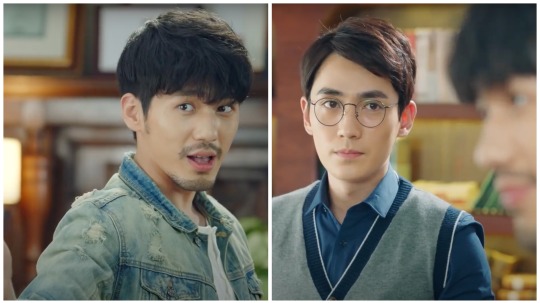
Zhao Yunlan asks her if she new the victim and she looks incredibly shifty as she flees. He is right to think that something is up, and he correctly assumes trauma, rather than guilt. We can now start to see that he is very very good at reading people. It must be equal parts thrilling and disconcerting for him to have met something who he decisively cannot read. Shen Wei vouches for the woman, partly, surely, because his Hei Pao Shi sense is tingling, letting him know that someone is eavesdropping.

Despite feeling uneasy, Shen Wei still offers Guo Changcheng, who is left to collect various paperwork from his desk, a little smile. He has a reason to like Xiao Guo, of course: he was the one to see the young man’s kindness and understanding, and he is already growing protective of him, way before he will start seeing members of the special unit as his people. This reminds me of how many months later, he will subtly, but decisively stop a barrage of verbal abuse against Xiao Guo by dropping a pair of chopsticks.
Zhao Yunlan is taking Xiao Guo with him on the case rather than anyone else, partly, supposedly, because of Guo Changcheng’s familial connections. The young man looks more sure of himself, asking correct questions, dutifully records answers. He also tries to look after his Chief by asking him to go home and rest. He does phrase it badly, but Zhao Yunlan has a thing against his own health and well-being, so he reacts extra poorly.
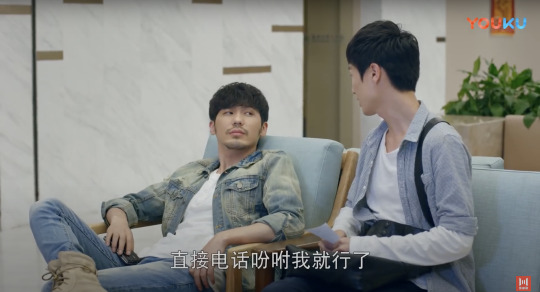
Soon after, Zhao Yunlan’s at Shen Wei’s office yet again, as Shen Wei tries his best to ignore him, in the hope that he… well, maybe not goes away, but does not ask him anything that will require him lying. Instead, Zhao Yunlan is asking Shen Wei why he is bad at reading people, which is a very strange thing to ask. Shen Wei answers his question with a question, “Will seeing through people really lessen the hurt and disappointment?” Adding, “Many tragedies were destined from the beginning”. He looks well.. like this as he says it.

This is loaded. On first glance, it’s a pretty good set-up to the way this story will unfold, as a tragedy of two individuals who let their devotion to each other nearly ruin each other’s life. A fragile human and a dangerous powered Undergroundian: what else is that, but a tragedy, waiting to happen? But this story - this one right in front of us - will not end tragically, at least not for the two people it enters around. It could do so, but it will not. Maybe, this truly is the first hint that this entire narrative, so carefully set up from the very first time Zhao Yunlan and Shen Wei meet, is destined to be a tragedy. Moreover, that it must be one, for some cosmic reason.
(… I apologise while I go have a little cry in the corner. Damn you, Guardian, why do you make me hurt so much?)
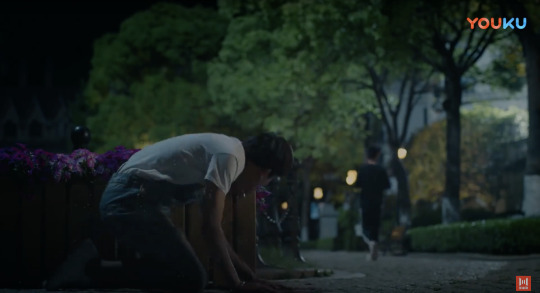
Da Qing inexplicably morphs from black cat to a human in white t-shirt while doing night shadowing, and promptly falls asleep on patrol. Why is he being sent to stake anyone out? He is least suitable for it. He is literally a cat. He sleeps 16 hours a day.

Surprisingly, when pressed, Zhang Ruonan comes clean very easily, revealing that she was a victim of the three students she failed (two of which are already dead and one one standing right next to them), who lured her out at night, which left her vulnerable to be attacked. Zhao Yunlan listens to this story, and instead of… oh I don’t know, perhaps asking her the identity of the third student, leaves to go find that out for himself. It is heavily implied that he does it on purpose, which is definitely not okay.
Moreover, he goes and... asks Shen Wei. This makes me suspect that he’s not really thinking with his head at this point. As he does so, he is brandishing a letter opener.
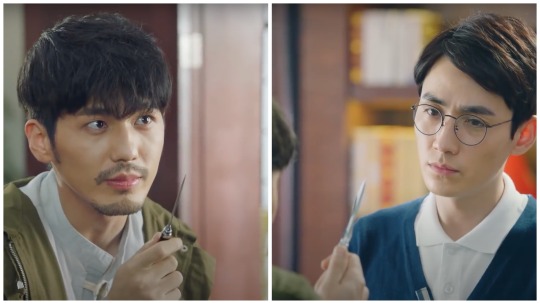
Shen Wei is looking even less impressed with him than he did during their last few conversations.
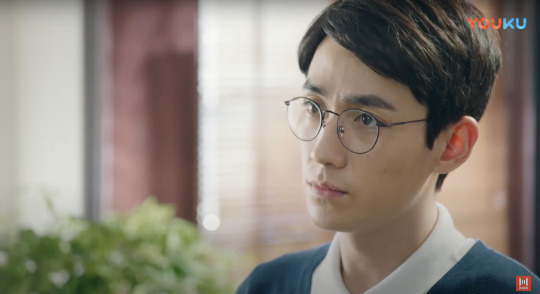
Zhao Yunlan is a little bit flippant when it comes to students’ lives this episode. And yes, they have done something really quite horrible to another human being, but that's not a very good excuse to let the last of them just die. As it happens, the situation Yunlan created - perhaps on purpose - did lure out Zhao Ruonan’s murder girlfriend, but it also cost a student his life. Which is far from ideal, but is somehow never even mentioned. Instead of being aghast, he sits on the table as he goes into full interrogation mode. (As he will continue to do a lot. Sometimes he crouches on tables instead. There is no further point here, apart from: I like this character quirk. It’s a nice character quirk.)
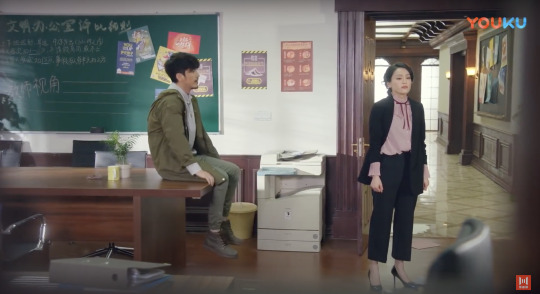
He brings some of his team in at this point, and asks Zhu Hong to continue interrogation. It would be a nice gesture is he did not interject two questions in.
“How do you regard your relationship with Wang Yike?”
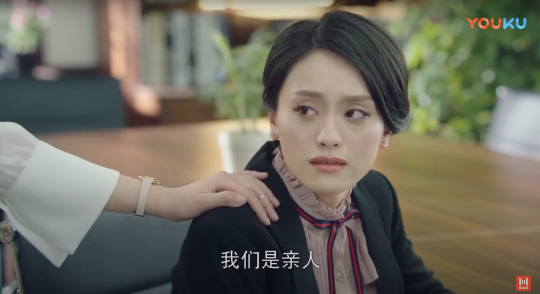
“We are family.”
They are definitely, decisively not going for sisterly bond here. Which is kind of incredible. This is one of the moments the amorphous being that show is looks at the censors, wiggles its battered low budget eyebrows at them, and then proceeds to flip them off. Well done, Guardian.
Wang Yike calls Zhang Ruonan, saying there is one more victim she needs to take care of, and Lin Jing traces the call back to campus. Zhao Yunlan, who did not even bat an eyelid at a dead student earlier, now looks decisively worried
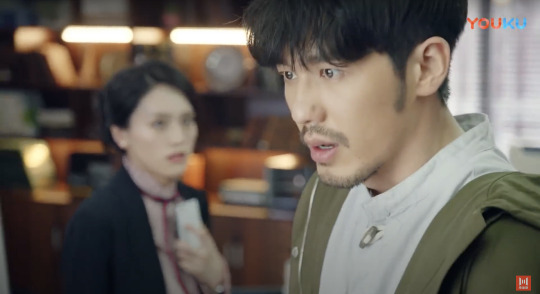
“Oh no. Professor Shen.”
The only reason Shen Wei is attacked is jealousy. Wang Yike does not know this of course, but trying to kill him is a bad move, because a) he has long ago given his heart away, and is definitely not interested; b) this is probably the only thing she could do to make the man on the case very very upset; c) Shen Wei’s immune to her powers.
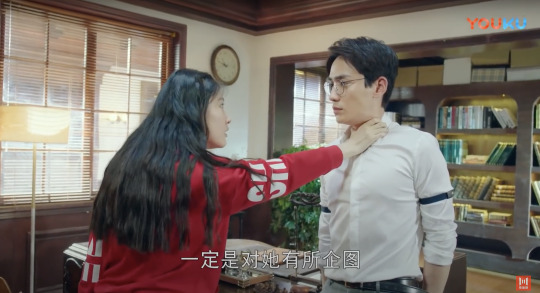
“Someone like you will never understand what she means to me!” Wang Yike shouts eventually. “As long as I can protect her, my life has worth!” And, even as Wang Yike has no way of knowing it, these are the words that ultimately save both her and her loved one. Because Shen Wei does in fact understand what Zhang Ruonan means to her. His own endless and ultimately self-destructive devotion is his main driving force.

Shen Wei pretends to be hurt, again, which earns him a half-hug from the object of his devotion. If Zhao Yunlan does notice that Shen Wei should really come out of this attack grey haired and dead, and not just mildly inconvenienced, he chooses not to say anything.
Worried about her murder girlfriend, Zhang Ruonan rushes in and accidentally touches her. Zhao Yunlan Freaks The Hell Out. Shen Wei does, too, but in his own, reserved, way. They are both emotionally invested in those two people, although for very different reasons: Shen Wei is acutely feeling resonance of his own past in their story, and Zhao Yunlan, I think, wants to fix it, he wants to be able to make it better. Instead, Shen Wei fixes it for him, turning the tide on this tragedy, and giving it a happy ending. He heals Zhang Ruonan right in front of the officers of SID, albeit with much subtlety. (“Have someone saved her right under our noses?” Zhu Hong will snort the very same evening, and she will be 100% correct.)

Shen Wei also lets Wang Yike go despite the undeniable fact that she did kill three people. Here, he is looking at the picture of this human/Undergroundian couple, surviving despite all odds, and touches his only reminder that Kunlun really was in his life.
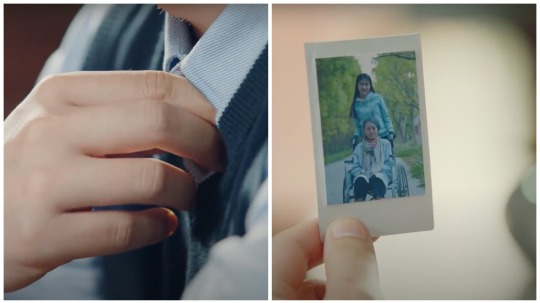
He then burns the picture as the only evidence that Wang Yike was not punished by him for her crimes.

In the end, Guo Chengcheng is making first of his many diary notes about the events, recounting a conversation between Shen Wei and Zhao Yunlan we had not witnessed, in which Shen Wei mentioned a relationship based on devotion that can last a thousand years, and Zhao Yunlan called such a relationship “guarding”. Finally, Guo Changcheng hopes that he can become a guardian of all.
And this is making me think that this absolutely should be a set-up for him becoming a wick of the guardian lantern, as per every single other decision that was made prior to the last two episodes. Right? This is a perfect foreshadowing, and mentioning it here, so early in the show would not make any sense if it were a deliberate subversion. So, was Guo Changcheng meant to become the wick after all before... what, some rewrites happened? What made the final episode be what it was in the end?
(This is a genuine question by that way, if anyone has any insight on the matter.)
The episode would end here, if this was a western show, with a familiar monster of the week structure, but it does not. At least, the way it ends is reminiscent of a cliffhanger, with Zhao Yunlan catching Shen Wei in a middle of a crime scene, and looking betrayed.
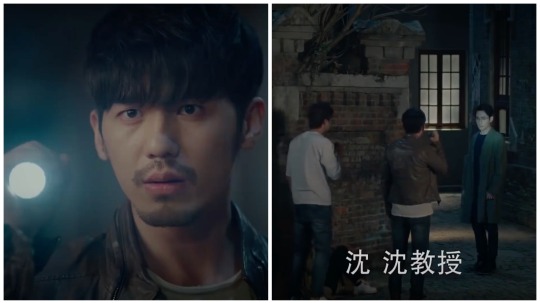
Next episode: Lynchian Nightmare, aka people without faces.
PS.
I did not have a seamless way to stick this in anywhere but... Shen Wei’s technological ineptness at the max: he does not know how to use a Polaroid camera. Help him, he is so lost.
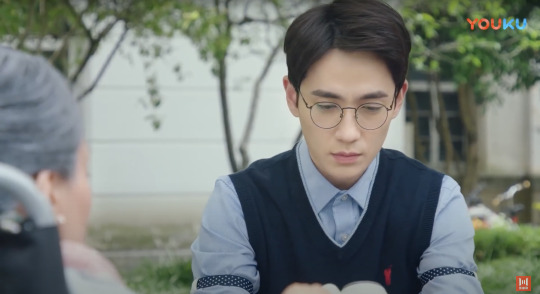
——
Second point of housekeeping to say a few things:
I don’t think I will be consistent with certain things being transliterated versus translated. I am more likely to use Hei Pao Shi rather than Black Cloak Envoy (because the later reminds me of Tuxedo Mask, which makes me inwardly giggle every time) but at the same time I am also more likely to use Underground/Undergroundian rather than Dixing/Dixingren. I am more likely to use Xiao rather than Little, but have called Chu Old rather than Lao before. I hope that’s not grating, but do tell me if it is
My recaps are Shen Wei-heavy. I have no real explanation for this, apart from.. I like Shen Wei.
I realise that there will definitely be things here that are head canon and speculation rather than flat observations; this show is a work of fiction and a work of art, which cannot be interpreted objectively. If you have alternate takes on anything I write in the future, let me know!
46 notes
·
View notes
Text
𝐀𝐍 𝐀𝐍𝐀𝐋𝐘𝐒𝐈𝐒 𝐎𝐍 𝐋𝐎𝐑 𝐈𝐑𝐄𝐋𝐈𝐀
( where yugen is so incredibly obsessed with this woman that she decides to rant about her )
on: her followers
to start us off, we’ll discuss the main event of irelia’s performance: her relationship with blossoming blade. they are very close with each other, and it can be interpreted as platonic or romantic. i only say this because they establish their relationship as teacher/student, a platonic/familial bond that can be as powerful as a romantic one. but i also digress, given the affectionate remarks they give each other such as:
irelia: i wish i could give you silks, but i must give you steel. blossoming blade: stay by my side. i cannot ask for more.
irelia: ionians into formation! blossoming blade: i’d follow you to the black heart of noxus itself.
&& there is so much more. blossoming blade is not confident in her ability to fight, much like irelia && her lack of confidence in her ability to lead, which might explain why irelia has some sort of connection to her. she sees her as a mirror of herself, and much like she needed at one point, blossoming blade needs someone to support her. so, she will give that plus much more. lastly, irelia’s reaction upon blossoming blade’s death; it is simply undeniable that they love each other.
i am a bit bothered by the lack of interactions between irelia && zinneia since it is implied that zinneia is her former mentor:
irelia: zinneia, you are a master at your craft. zinneia: and fate has sent you to give my craft purpose.
irelia: as a child, i watched you dance at the placidium every spring. zinneia: it was your bravery that brought me to the fight.
i was hoping to have more information on their relationship && the sort of impact zinneia had on irelia, but at the same time, it gives me the opportunity to fill in the gaps! given zinneia’s interactions with the rest of irelia’s followers, she is an elder ( we will not talk about how that isn’t reflected in her card art ) who leads the dance program at the placidium. while irelia’s o’ma taught her how to dance, zinneia perfected it with her lessons, and she became the mother/grandmother figure in her life once all her family members passed away. it assures me that irelia did have a support system ( even if a part of her might disagree. ) i will do a more thorough ( * headcanon based ) look at their relationship in another post.
when irelia said she is a warm && caring person, she really meant it. she cares a great deal for her followers as shown:
coastal defender: generations tended this land. i cannot leave. irelia: we must retreat for now, but i promise we’ll return.
ribbon dancer: stand behind me! they won’t hurt you. irelia: if they hurt you, i’d never forgive myself.
fighting for your freedom is important, yes but not so recklessly. if a battle isn’t turning out in their favor, irelia would rather retreat and keep her followers safe rather than dying in vain. her tone is mother-like, always worrying for them even though they are confident and determined to protect their home, and at their deaths, she is torn apart. she is both grateful ( ‘ your sacrifice mattered ’ ) && heartbroken ( ‘ so young . . . ’ ), which is why i emphasize her hesitance to believe in herself as a leader. she is responsible for their lives and for each that falls, she fails. she cannot fail them ( something she says herself upon the death of her card ); her people deserve to live to see the day of bittersweet victory.
on: noxus
as expected, irelia harbors a lot of hate towards them, and rightfully so. however, what i want to talk about is riot confirming my assumption on how deep this hate runs.
imperial demolitionist: for the empire. irelia: so young, already so wicked.
imperial demolitionist: remember the objectives. irelia: ‘murder the innocent’ and ‘destroy their homes’?
for those who don’t know, imperial demolitionist is a child. irelia is speaking to a child and not in a tone you would expect an adult would talk to a child ( especially one who was brainwashed to commit awful atrocities. ) this confirmed my headcanon of irelia’s white && black mentality: no matter who you are or how you came to be, if you are noxian, she will kill you. she will refuse to see you as anything but a tyrant, and she will continue to allow this hate to fester and dehumanize noxus as a whole. she won’t even refer to them by name! she has her reasons, given how much they have taken away from her, but it doesn’t make it right. as we all know, noxus has slaves, ranging from adult to children, and will send them to war whether they volunteered or not. they have to act in order to survive, but irelia can’t see that they’re trying to live; she sees them trying to kill her home, so in turn, she’ll kill them. && that is a flaw i will cover more on in another post.
even though the faith in herself wavers, the passion to protect ionia doesn’t with how confident she talks back to the noxians. she threatens them, promises to kill them, even when faced with their technology and their machinery. she has that much faith in her people and the land, and it’s admirable. no wonder why people follow her.
on: shurima
i never expected interactions between irelia and the shurimans ( especially with azir and nasus ), but it was a pleasant surprise nonetheless! azir && irelia are two fierce leaders, fighting tooth and nail to secure the safety of their homes; however, the difference between their idea of leading is evident within their interactions.
azir: a leader must see victory beyond each loss. irelia: my heart weeps for every fallen ally.
azir: war is an instrument that can make or destroy its leaders. irelia: instruments create beauty; war ends it.
from my perspective, azir isn’t so affected by the loss of lives in the war like irelia is ( it could be because he’s become desensitized after leading for so long or he truly doesn’t care ), and i could be wrong as i am not so familiar with azir. but with irelia, it is obvious that she is very sensitive towards the death of her people. whether they were close to her or not, as far as she knows, they were innocent souls, and they were dragged into this war unprepared. so many lives lost, so many deaths unjustified — it is simply unfair to her people, who have done nothing wrong. && no matter how many times she’s seen a body belonging to the first lands, it never hurts any less. she’s been able to mask that pain over the years she’s grown, but she still grieves, and it can be seen/heard whenever someone very close to her dies.
another difference i like to point out between the two leaders is their viewpoints on war: azir sees war almost like survival of the fittest. in the second quote, war is a way to create leaders, the best of the best while irelia sees it as destroying the beauty of life. war is a massacre, no matter which side wins, && even though she also strives for victory, she will only remember it as the day that peace died.
nasus: sorrow weighs upon you, but death could bring you peace. irelia: not yet, curator. i am far from done.
this made me snort because it’s basically nasus telling irelia, “k’ing yourself would make you feel better,” but i’m sure it isn’t meant to sound that way. rather, he understands her grief && how badly it is affecting her, so he is “testing” her will to see how strong it really is. if she had the opportunity, would she die && end her suffering there, or would she continue to preserve despite the agony she holds in her heart? irelia answers almost incredulously; if she dies now, ends her suffering now, who will lead her people to victory? certainly not anyone she knows/trusts. so, she cannot die. she will not die, not until she knows that her home is safe. ( this plays a bit into my headcanon that irelia doesn’t really fear death since she anticipates the day of reuniting with her family && ending her torment. )
there isn’t much to say about her interactions with the soothsayer && the voice of the risen other than she’s grateful for their aid in these trying times.
on: miscellaneous champs
lastly, i’ll be touching upon her interactions with in-game characters — which, suffice to say, isn’t a whole lot. it’s a bit disappointing. i expected more interactions with shen, karma, riven, and zed; i expected interactions with yasuo, yone, and lulu ( who is apparently in ionia?? ) but unfortunately, we weren’t given that. but i won’t say i’m heavily disappointed either because we did get some interactions with ionian && noxian champs plus extra.
shen: the balance requires a watchful eye. irelia: ionia needs brave hearts and able hands, too.
much like akali, irelia does not believe in waiting around && letting the land fight on its own. she even questions shen’s philosophy because of the slaughter that happened, which makes me theorize her faith in the spirit; clearly, she still believes in it but not so deeply like shen and the elders.
karma: ionia speaks through me. irelia: then tell me when this bloody fight will end?
she even questions the spirit of ionia itself, in a tone that is tired and desperate to end this terror. she is a lot nicer to karma in lor than lol, which confirms my suspicion that while irelia was initially frustrated with karma’s ( lack of ) action, she has come to understand her reasoning through the years that they’ve worked together.
zed: pledge yourself to the shadows. irelia: noxian tyranny has already forged our bond.
riven: [ dies ] irelia: irredeemable.
isn’t it crazy how irelia would rather side with the “evil” shadow master rather than the former noxian? of course, zed isn’t all bad, and riven isn’t all good, but it just further proves how she doesn’t treat noxians as humans at all; however, i would also like to point out her interaction with riven is if she’s against her. irelia would perhaps give her a chance if her quote in-game with her proves anything: “you want redemption? join me, and kill your masters!”
&& i’m still flabbergasted by her interaction with zed. she might not entirely agree with him, but she’ll work with him without hesitance. after all, they do share the philosophy of killing all noxians.
irelia: join us, prince jarvan. dance by our side. jarvan: i’m afraid i was born with two left feet. it’s a lightshield thing…
jarvan: noxus will pay for what they did to your people. irelia: yes, demacian prince. we will see to that.
so not only does she have shurima’s support but also demacia’s! a bit shocking since demacia is antimage and irelia is technically a mage, but i am glad to see that she and jarvan are on good terms.
irelia: my family...h-have you seen them? kindred: drifting between innocence and consequence.
STOP!! astra and i literally discussed this: if irelia was given the chance to talk to kindred, she would most certainly ask for her family && question why she was spared. of course, kindred would answer ominously, which in this interaction, makes me curious. between innocence and consequence? what do they mean? is her family stuck in limbo? are they currently being judged based on irelia’s actions in life? or are they waiting for irelia to join them? perhaps we’ll never know.
#˗ˏˋ⠀ 𝐡𝐞𝐚𝐝𝐜𝐚𝐧𝐨𝐧. ›› the day you died,you did not tell your body.#/ wow this is the most i've written for a character ever#/ three hours n i was just rambling nonsense at the end sfjdhsb
24 notes
·
View notes
Note
If you've got time to share, I'd love to hear more about your thoughts around Snape and Lupin.
@deathdaydungeon, here you are!
After a conversation with @frederick-the-great, I’ve been thinking about Lupin, Snape, and what they say about morality in HP. I’m not talking about the troublesome white hats, black hats morality, but am instead looking at from this angle: Lupin is nice and well-liked, but often lacks a backbone, whereas Snape is mean and disliked, but incredibly brave. Which is more important? I find Harry’s last sacrifice to be a useful point by which we measure their impact.
Lupin and Snape useful to compare on several important fronts.
As foils for each others’ teaching methods
The way they deal with social disadvantage
Their connections to Harry’s father and how they pass on James’ legacy
1) They both teach at Hogwarts, and are foils for each other in many ways. Snape is mean and takes away points. He’s seen as selfish. His classes are hard and unpleasant for Harry. He’s mean to Neville, and rather than encouraging him, mocks him and belittles him, which just adds to the overall disaster of Neville’s poor self-esteem mixing badly with potions class.
However, even Umbridge admits that Snape’s teaching methods work, and she’s working for Fudge who doesn’t like Death Eaters and has been defied by Snape in GoF, so we know he’s effective for a lot of people, if not Neville.
Yet, for all that, Snape saves Harry’s life multiple times. On top of that, Snape wants to keep the fact that he saved Harry’s life a secret.
“Very well. Very Well. But never--Never tell, Dumbledore! This must be between us! Swear it, I cannot bear...especially Potter’s son...I want your word!
My word, Severus, that I will never reveal the best of you? Dumbledore sighed, looking down into Snape’s ferocious, anguished face. “If you insist...”
DH 679, The Prince’s Tale
Conversely, Lupin is nice and rewards points. He’s seen as generous. His classes are fun and interesting for Harry. He’s kind to Neville, and expresses confidence in him that leads him to succeed and do well. That confidence is a huge part of Neville’s character development. I doubt he’d grow into the resistance leader in DH if not for the many times teachers expressed confidence in him, like Dumbledore in PS, Lupin in PoA, Fake!Moody in GoF, and Harry in OotP. Harry certainly approves of his methods:
“You’re the best Defense Against the Dark Arts teacher we’ve ever had!” said Harry. “Don’t go!”
PoA 424, Owl Post Again
However, it’s worth noticing that Hermione does worse on his exam than we ever see. She fails the Boggart test, and she and Harry were the only two people not permitted to experience the Boggart in class. Lupin’s teaching methods aren’t foolproof. Despite that, he’s overall seen as a nice guy and good teacher.
Yet Lupin endangers Harry’s life. The secrets he keeps are dangerous: his secret to keep is that he’s a werewolf and actively endangered three students lives with his negligence, as well as the fact that he hid a secret about a believed and convicted mass murderer to save face with Dumbledore.
“That was still really dangerous! Running around in the dark with a werewolf! What if you’d given the others the slip, and bitten somebody?”
“A thought that still haunts me,” Lupin said heavily. “And there were near misses, many of them. We laughed about them afterwards. We were young, thoughtless--carried away with out own cleverness.
“I sometimes felt guilty about betraying Dumbledore’s trust, of course....he had admitted me to Hogwarts when no other headmasters would have done so, and he had no idea I was breaking the rules he had set down for my own and others’ safety. He never knew I had led three fellow students into becoming Animagi illegally. But I always managed to forget my guilty feelings every time we sat down to plan our next month’s adventure. And I haven’t changed...
Lupin’s face had hardened, and there was self-disgust in his voice. “All this year I have been battling with myself, wondering whether I should tell Dumbledore that Sirius was an Animagus. But I didn’t do it. Why? Because I was too cowardly. It would have meant admitting that I’d betrayed his tryst while I was at school, admitting that I’d led others along with me...and Dumbledore’s trust has meant everything to me. He let me into Hogwarts as a boy, and he gave me a job when I have been shunned all my adult life, unable to find paid work because of what I am. And so I convinced myself that Sirius was getting into the school using Dark Arts he learned from Voldemort, that being an Animagus had nothing to do with it...so in a way, Snape’s been right about me all along.”
PoA 355, Moony, Wormtail, Padfoot, and Prongs
Plan is emphasized because those trips that ended in “near misses” weren’t some impulsive romp. They were planned and coordinated in advance.
“I just saw Hagrid,” said Harry. “And he said you’d resigned. It’s not true, is it?”
“I’m afraid it is, said Lupin. He stared opening his desk drawers and taking out the contents.
“Why?” said Harry. The Ministry of Magic don’t think you were helping Sirius, do they?”
Lupin crossed to the door and closed it behind Harry.
“No. Professor Dumbledore managed to convince Fudge that I was trying to save your lives.” He sighed. “That was the final straw for Severus. I think* the loss of the Order of Merlin hit him hard. So he--er--accidentally let slip that I am a werewolf this morning at breakfast.”
“You’re not leaving because of that!” said Harry.
Lupin smiled wryly.
“This time tomorrow, the owls will start arriving from parents ....They will not want a werewolf teaching their children, Harry. And after last night, I see their point. I could have bitten any of you...That must never happen again.
“You’re the best Defense Against the Dark Arts teacher we’ve ever had!” said Harry. “Don’t go!”
PoA 424, Owl Post Again
What strikes me about this conversation is how Lupin shifts the blame around. This doesn’t start with an admission of guilt. He’s not leaving because the parents are right. He’s not leaving because he’s seen how dangerous he can be, or because he owns up to making an incredibly dangerous decision. He’s leaving because Snape forced his hand. If Snape didn’t do that, he would do the same thing he’s always been doing: sweeping his misdoing under the rug and promising himself privately that he’s going to change, but never doing it.
It’s always someone else’s fault for Lupin. That’s a neat tie in to the next point of comparison:
2. Lupin and Snape both experience marginalization in wizarding society, but in very different ways. Lupin faces socio-legal** marginalization and Snape faces socio-economic marginalization.
Lupin’s a werewolf. We see how prejudice affects his life, from his inability to find a job and his worn out clothes to his people-pleasing nature. He’s always acting nice and harmless. He does nothing to play into the condemning stereotypes he’s faced since childhood. Despite that, he still can’t find a job. Nobody will hire him, and people are scared to interact with him. From the way he talks about werewolves, it’s implied that this prejudice is held blindly across Wizarding society. Both Ron and Hermione are horrified to learn Lupin’s a werewolf. *** Later on, he’s legally limited in the kinds of jobs he holds and the kind of magic he’s allowed to perform. Lupin has no control over his transformations, and did not choose his condition.
Lupin’s not really wrong when pities himself. The odds really are stacked against him when he’s treated as if he’s a wolf 24/7, not just a few predictable times a month. His prospects are honestly awful.
The problem is, his condition is dangerous. Thus, the issue of victim blaming is particularly thorny for Lupin. He can’t just accept that he’s a monster for something he has no say over, and yet he can’t escape the fact that sometimes he is monstrous for reasons out of his control. He feels guilty for the people he could have hurt, but also seems to resent that people blame him for something that’s not his fault. The problem is that he carries that lack of accountability into spheres where he should be accountable, like not taking his medication and endangering children because of it.
Snape’s story is very different. He is poor in both the wizard and muggle worlds, and half-blooded, and was sorted into Slytherin as a child. He doesn’t have one condition against him, but checks boxes that make it hard for any one side to accept him. He’s too impure and poor to survive on his own for the Slytherin, but is a Slytherin with Death Eater friends and housemates interested in dark magic, which means he’s never going to fit in with the Order of the Phoenix crowd, especially when some of its members torment him at school. ****4
This essay makes a convincing point that the wizarding world is not a meritocracy, and that people like Snape need powerful patronage to advance if they don’t have the money to support themselves.
I don’t consider the sorting a proper choice. I know Harry does, but I’m of the opinion that at age 11, very few people have been taught how to analyze different perspectives and make an informed decision. Most 11-year-olds are trained to obey their parents and accept their family’s ideology. Harry’s choice rests on very little evidence--most of what he knows is what Hagrid told him, and that he doesn’t want to be sorted into Voldemort’s house along with Draco Malfoy, someone who reminds him of Dudley. I don’t think Snape was very informed either (I’d love to know why), because he doesn’t realize why it Lily wouldn’t be sorted into Slytherin.
“You’d better be in Slytherin,” said Snape, encouraged that she had brightened a little. DH 671, The Prince’s Tale
Either the pureblood rhetoric just wasn’t strong in those days, or his mother didn’t tell him about that.
...“Where are you heading, if you’ve got the choice?”
James lifted an invisible sword.
“’Gryffindor, where dwell the brave at heart!’ Like my dad.”
Snape made a small, disparaging noise. James turned on him.
“Got a problem with that?”
“No,” said Snape, though his slight sneer said otherwise. “If you’d rather be brawny than brainy--”
DH 671-2, The Prince’s Tale
It seems that most people just follow familial preferences. As to why Snape wants to be in Ravenclaw over Slytherin, my preferred interpretation is that he had a family legacy, knew that Slytherin rewarded the ambitious and clever, and that Slughorn, the head of Slytherin house, had a knack for making the kind of connections that a poor, clever boy would need to succeed.
Nevertheless, once Snape was in Slytherin, the odds were stacked against him. The house in that era was full of people who would later be Death Eaters. “Dark Magic” wasn’t frowned upon among his housemates, and siding with Voldemort wasn’t yet widely acknowledged as a transgression by wider society.
“No, no, but believe me, [Sirius’ parents] thought Voldemort had the right idea, they were all for the purification of the wizarding race, getting rid of Muggle-borns and having pure-bloods in charge. They weren’t alone either, there were quite a few people, before Voldemort showed his true colors, who thought he had the right idea about things.…” OotP 112
Additionally, people like Bellatrix were in the years above him, and given how Fred and George acted with younger students, I think it’s highly likely younger students had to find a place in the hierarchy or be the target of ‘pranks.’ He was a halfblood, after all, and dirt poor.
Snape knew these people. He ate with them, slept with them, and went to class with them. It is so much easier to understand and befriend someone you spend time with. I’d say that most people who subscribe to problematic ideologies aren’t just awful to be around all the time, or else these movements wouldn’t gain any traction. They’re likely funny and nice to be around if you’re not on their bad side.
In addition to strong peer pressure to befriend the people who would be death eaters, he was also bullied four to one. His bullies received protection from the headmaster when he was nearly killed or permanently maimed. They were popular and well liked.
The best analogy I’ve heard to describe Snape's Hogwarts situation is that he’s a kid in a rough neighborhood who joins the local gang. It provides protection and the hope of social mobility, and from his perspective, the other gang fights just as dirty (his treatment by the marauders). He doesn’t stop to think that the system is flawed, or that the gang’s very existence indicates the failure of authority and threatens its members. He just sees himself as a kid with nothing who needs help with protection and advancement. We know that Voldemort hasn’t shown his true colors, and it’s possible he showed different faces to different people.
‘Now, yer mum an’ dad were as good a witch an’ wizard as I ever knew. Head Boy an’ Girl at Hogwarts in their day! Suppose the myst’ry is why You-Know-Who never tried to get ’em on his side before ... probably knew they were too close ter Dumbledore ter want anythin’ ter do with the Dark Side.
‘Maybe he thought he could persuade ’em ... maybe he just wanted ’em outta the way. All anyone knows is, he turned up in the village where you was all living, on Hallowe’en ten years ago. You was just a year old. He came ter yer house an’ – an’ –’ (“The Keeper of the Keys”)
Dumbledore’s cited as the reason they turned him down, not their blood status. I think there’s evidence that the wholesale anti-muggleborn campaign wasn’t a huge part of the first wizarding war, and wasn’t implemented until the second, even if there was anti-muggle propaganda. (Muggle=/=muggleborn). It’s implied that Tobias is abusive and that Snape hates him for what he did to him and his mother; it’s implied that faced class prejudice by the muggles around him as well:
“I know who you are. You’re that Snape boy! They live down Spinner’s End by the river,” she told Lily, and it was evident from her tone that she considered the address a poor recommendation.
DH 665, The Prince’s Tale
When you read stories about people who are able to escape cycles of gang violence and poverty, there’s almost always someone who lifts them out. There’s someone who pushes them, or extends a hand, or believes in them. There are community outreach programs, or churches, or an English teacher that pushed them to do better and try out for a scholarship. That person is usually someone who knows what it’s like and knows how hard it is to get out.
Snape doesn’t seem to get that support anywhere. Slughorn doesn’t seem to notice him, for whatever reason. Lily doesn’t approve of his friends, but also doesn’t understand at all what the pull is--that it’s hard to swim against the current of what everyone else is saying, despite the fact that she feels the same pressure to end her friendship with Snape.
“… thought we were supposed to be friends?” Snape was saying. “Best friends?” “We are, Sev, but I don’t like some of the people you’re hanging round with! I’m sorry, but I detest Every and Mulciber! Mulciber! What do you see in him, Sev, he’s creepy! D’you know what he tried to do to Marry Macdonald the other day?”
DH 673, The Prince’s Tale
In the very same conversation, the fact that Snape is not allowed to share what happened to him with Lupin and the werewolf incident means that Lily will never be able to understand what Snape is facing: That the leader of the good guys makes excuses for and protects people who recklessly endanger the lives of others.
“And you’re being really ungrateful. I heard what happened the other night. You went sneaking down that tunnel by the Whomping Wollow, and James Potter saved you from whatever’s down there--”
Snape’s whole face contorted and he spluttered, “Saved? Saved? You think he was playing the hero? He was saving his neck and his friends’ too!...”
DH 674, The Prince’s Tale
Later in the year after SWM, she tells Snape this:
“None of my friends can understand why I even talk to you.”
DH 675 The Prince’s Tale
She expects him to reject all of his classmates and stand against the tide, despite the fact that she knows how hard it is to do that and can’t comprehend why he sticks with his classmates. She expects him to be grateful to James Potter as if what he did was altruistic, because the Headmaster swore Snape to secrecy and he keeps his promises, despite the fact that someone else was spreading the story. (The fact that she says she heard it instead of talking about it like its common knowledge implies that she heard it from a friend, so our friends the Marauders likely weren’t keeping their lips zipped even if Snape was.)
I don’t say this to shift the blame away from Snape to Lily in regards to Snape joining the Death Eaters. I just want to point out that Lily wasn't someone who could help him break the cycle. He didn’t squander some chance she offered him. She just wasn’t enough to break him out--not empathetic, motivated, or well-informed enough. (I think the fact that they were peers plays a big role in that).
Ultimately, Snape did choose to join the Death Eaters. He did yield to peer pressure. He did obey his assignment and report the prophecy to Voldemort. He spent his youth yielding, following the path in front of him, and choosing what was probably the easier choice: stick with your group, find powerful friends, do what they want, and don’t ask too many questions about their methods. That’s what makes his decision to betray Voldemort so powerful to me.
Here’s part of the passage when Snape betrays Voldemort:
...The adult Snape was panting, turning on the spot, his wand gripped tightly in his hand, waiting for something or for someone...His fear infected Harry too, even though he knew that he could not be harmed, and he looked over his shoulder wondering what it was that Snape was waiting for--
Then a sliding, jagged jet of white light flew through the air. Harry thought of lightning, but Snape had dropped to his knees and his wand had flown out of his hand.
“Don’t kill me!”
DH 676, The Prince’s Tale
He was terrified. He knew he was caught between the world’s two most powerful wizards, but it was worth it if he could save his childhood friend.
Then when Lily dies:
“Her son lives. He has her eyes, precisely her eyes. You remember the share and color of Lily Evans’s eyes, I am sure?”
“DON’T!” bellowed Snape. “Gone...dead...”
“Is this remorse, Severus?”
“I wish..I wish I were dead....”
“And what use would that be to anyone?” said Dumbledore coldly.
DH 678, The Prince’s Tale
Whatever motivation Snape had before is gone. A person’s life who is not his own is worth more than his own, and he’s drowning in guilt. From now on, Snape works to be useful in saving Harry’s life, and later many lives, at risk of death. His choices are a black mark on his record, likely making it difficult for him to get a job when he’s been tried as a Death Eater, and all of his wizarding connections are Death Eaters or their associates. He has no money or influence. Dumbledore hires him.
So Lupin has a single ailment and faces constant social and legal discrimination. He constantly tries to undermine people’s expectations about werewolves by being mild, but unfortunately is too afraid of rejection and its consequences to stand up against bad behavior or take full responsibility for his failings. He has friends who support him, but do it by engaging in risky behavior. He does not stop them. Perhaps he fears exposure and expulsion. Perhaps he just likes belonging for once. Either way, he does not come clean until forced to.
Snape is different; instead of facing outright rejection, he’s from a poor background and grows up surrounded by peers who join something somewhere between a gang and a cult while being bullied by people groomed by a rival organization. The headmaster of his school supports the rival organization and swears him to secrecy about an incident when they endangered his life, sending the message that his life is worthless. That same group continues to publicly bully him. He continues down this path until he realizes that it endangers something he cares about, and makes a decision that puts him at risk of being killed by the two most powerful wizards alive. He changes course.
Snape seems to view his problems as challenges facing him, whereas Lupin sees his problems as part of who he is, and not something he can change. Lupin seems to accept what happens to him in a fatalist kind of way. He sees what happens as inevitable and somewhat out of his control, whereas Snape never seems to blame his circumstances for him becoming a death eater, even though they clearly limited his options. I think that attitude matters. However, because Lupin’s facing a fictional magical malady, it’s difficult to fully blame him for that attitude.
Both Lupin and Snape have to react to powerful societal pressure that makes it difficult for them to succeed. Comparing them is apples and oranges at best, because their circumstances were so different. I don’t think you can judge either’s morality based on group identity, though.
3. Finally, they both act as a window on James: who he was, and what he means to Harry, who never knew him. That means in some way, they help pass on his parental legacy to orphaned Harry.
Hogwarts is Harry’s home, which means that the teachers are more than just teachers, but play a symbolic parental role in his life.
Hogwarts was the first and best home he had known. He and Voldemort and Snape, the abandoned boys, had all found home here.
DH 697, The Forest Again
You can’t understand Harry without realizing what he lacks: a loving home and living parents. He’s always looking into the past to find his parents, and is saddled with a legacy he struggles to understand--why did he live, who were his parents, and what does he need to do now?
Lupin and Snape also share a connection with Harry that goes beyond a normal teacher-student relationship, unlike McGonagall or Flitwick. Snape and Lupin are more personally connected to Harry than the other professors because they know Harry’s parents and went to school with them. I will mostly focus on James from here on out since we know so little about Lily personally and Harry mostly tries to emulate or avoid his father’s behavior and legacy.
They’re also the last people who knew James to survive, and they die almost at the same time. They’re the only teachers apart from Dumbledore who give Harry private lessons. More importantly, these lessons are all tied thematically to Harry’s past. Harry’s experience with dementors and the patronus charm are his first re-encounter with his parents and his past.
Terrible though it was to hear his parents’ last moments replayed inside his head, these are the only times Harry had heard their voices since he was a very small child. But he’d never be able to produce a proper patronus if he half wanted to hear his parents again.
PoA 243, The Patronus
In the end of PoA, Harry sees himself and mistakenly thinks it’s his father.
“Come on!” he muttered, staring about. “Where are you? Dad, come on--”
But no one came. Harry raised his head to look atet he circle of dementors across the lake. One of them was lowering its hood. It was time for the rescuer to appear--but no one was coming to help this time--
And then it hit him--he understood. He hadn’t seen his father--he had seen himself--
Harry flung himself out from behind the bush and pulled out his want.
“EXPECTO PATRONUM!” he yelled.
PoA 411, Hermione’s Secret
So the patronus itself is linked up with Harry’s past, and his coming-of-age. He doesn’t rely on others to save him, but must do it himself. (Though Harry’s never really trusted the adults to save him.) It’s interesting to note that Harry actually learns the Patronus charm under Lupin’s tutelage.
On the other hand, Snape introduces Harry to the unpleasant side of his father’s legacy. Through Snape, we see that James wasn’t just a little cocky, but a bully.
“Apologize to Evans!” James roared at Snape, his wand pointed threateningly at him. “I don't want you to make him apologize,” Lily shouted, rounding on James. “You're as bad as he is.” “What?” yelped James. “I'd NEVER call you a--you-know-what!” “Messing up your hair because you think it looks cool to look like you've just got off your broomstick, showing off with that stupid Snitch, walking down corridors and hexing anyone who annoys you just because you can--I'm surprised your broomstick can get off the ground with that fat head on it. You make me SICK.” She turned on her heel and hurried away.
....
He had no desire at all to return to Gryffindor Tower so early, nor to tell Ron and Hermione what he had just seen. What was making Harry feel so horrified and unhappy was not being shouted at or having jars thrown at him; it was that he knew how it felt to be humiliated in the middle of a circle of onlookers, knew exactly how Snape had felt as his father had taunted him, and that judging from what he had just seen, his father had been every bit as arrogant as Snape had always told him. OotP, Snape’s Worst Memory, emphasis added
It’s interesting note that Harry fails to learn Occlumency from Snape. (In fact, we never see Harry use magical skills he learned from Snape apart from Expelliarmus, which is...important). At the same time, he gains an important perspective.
You can’t have James without this part of him. However kind James was to Lupin, however brave James was when he saved his wife, he was neither kind nor brave when he bullied Snape. It’s uncomfortable and awkward, but it’s important.
When he had finished, neither Sirius nor Lupin spoke for a moment. Then Lupin said quietly, “I wouldn’t like you to judge your father on what you saw there, Harry. He was only fifteen —”
“I’m fifteen!” said Harry heatedly.
OotP
Harry rejects the idea that actively bullying someone is just folly of youth. He knows what it’s like to be disenfranchised. Regardless of what Snape and James’ relationship was, he didn’t deserve that kind of humiliation. And Lupin watched, and defends him. Harry has to grapple with that.
Ultimately, Snape and Lupin do more than just connect him to his past. They also teach him his two signature spells, Expelliarmus and Expecto Patronum. One saves his soul, and one saves his life and frees the wizarding world from Voldemort because of Voldemort’s fractured soul.
Snape and Lupin as moral counterpoints
How do we evaluate this:
“I’d never have believed this,” Harry said. “The man who taught me to fight dementors--a coward.”*****5
DH 213, The Bribe
and this?
“Albus Severus, you were named for two headmasters of Hogwarts. One of them was a Slytherin and he was probably the bravest man I ever knew.
DH 758, Seventeen years later
Ultimately, I don’t think it’s really that useful to pit two people with different backgrounds against each other. At the same time, they represent two different halves of a question: when it comes down to it, should we try to be kind or brave? I don’t think you have to pick one, but when pursuing the two, there are bound to be moments of conflict.
I always come back to the lyrics to Last Midnight from Sondheim’s Into the Woods.******6
You're so nice You're not good You're not bad You're just nice I'm not good I'm not nice I'm just right I'm the witch You're the world
Snape doesn’t care about being nice. I think this is where most non-Snape fans start pulling out the pitchforks and torches. Snape isn’t nice, and he’s not nice to kids. He’s not nurturing.*******7 He’s abrasive, allergic to coddling, and petty when he can get away with it. In fact, most of the people he’s ‘nice’ to are significantly more powerful than him, or someone he needs to be on good terms with.
Lupin is nice. He’s mild. He’s often kind. However, he often picks being liked over standing up for something.
What does that result in? He doesn’t stand up for Snape. The bullying continues and keeps Snape firmly on his path. He wins the respect of the Gryffindors with the Snape Boggart incident but loses whatever credibility he had to tell Snape to ‘put their past behind him.’
On the other hand, Neville’s bravery in DH was nurtured by Lupin’s confidence. Neville kept hope alive and led a rebellion. Lupin is one of the few adults that Harry fully respects and trusts up until the Grimmauld place confrontation. (He likes Hagrid and Molly, but doesn’t necessarily trust them to make decisions in their best interest, while he usually respects Lupin’s judgement). Harry loves him, and it’s because he loved him and watched him die that he needs to act and fight back against Voldemort.
Ultimately, Harry’s relationship with James and the adults who pass on his legacy is one of the most important symbolic relationships in the book. The thematic resolution of the series is Harry’s act of sacrificial love.
He did not know what to feel, except shock at the way Snape had been killed, and the reason for which it had been done....
...He could not bear to look at any of the other bodies, to see who else had died for him. He could not bear to join the Weasleys, could not look into their eyes, when if he had given himself up in the first place, Fred might never had died...
He turned away and ran up the marble staircase. Lupin, Tongs...He yearned not to feel....He wished he could rip out his heart, his innards, everything that was screaming inside of him.
To escape into someone else’s head would be a blessed relief....Nothing that even Snape had left him could be worse than his own thoughts.
DH 660-662, The Prince’s Tale
He rushes to the headmaster’s office to escape into Snape's memories. His memories convince Harry that sacrificing himself is the expedient thing to do, and he heads to the Forbidden Forest. To enable is last sacrifice, he uses the Resurrection stone to witness his parents and his father’s friends. Their combined testimony is enough to ameliorate his personal fears about following through with this final act.
Lupin and Snape leave entirely different legacies behind. Lupin encourages and inspires. As an authority figure, he gives people like Neville space to grow and his compassion towards Harry gives him the strength to face his demons. Harry’s decision in DH to die must have something to do with the kindness he was shown, and the sacrifices people who loved him made for him, of which Lupin is a part. Despite what he saw in Princes’ Tale, Snape wasn’t one of the people who’d make an appearance with the Resurrection stone.
Yet Snape sacrificed his life for Harry and the wizarding world, entities that Snape didn’t seem to like and that certainly weren’t kind to him. His form of bravery is about endurance, tenacity, and willingness to do what is right even when you hate your allies and no one else is going to credit you for what you do. And that’s very Harry. Even if he hates Draco, he’s not about to let him die if he can help it. Harry has much more in common with Snape than Lupin, I think.
Since this is about souls, let’s return to the Patronus charm. Snape’s not the kind of person who typically inspires that kind of emotion required to cast a Patronus in others, at least from what we see in Harry’s perspective. Yet because he has experienced that love, he can cast it and shows Harry what needs to be done. Snape enables Harry to dive under the ice. Lupin’s the kind of person who can inspire a patronus, but isn’t the one to make the sacrifice play until after Harry confronts him about his duty to his family. Ultimately, though, they both sacrifice themselves in the Battle of Hogwarts.
* Ever since I realized how blatantly tangential Order of Merlin must be to Snape’s character motivation, that line has frustrated me to no end. There’s no way frothing-at-the-mouth PoA Snape just really coveted that Order of Merlin. He’s often petty, yeah, but if Lupin believes it’s just about that and has nothing to do with Snape’s real conviction about how dangerous Lupin’s actions were, he’s deluding himself. I hate that he passes it on to his students.
**Yes, I am making up words today. Lupin’s faces prejudice and discrimination on a social level enforced by increasingly powerful discriminatory laws.
*** It’s worth noting that if we take every book as equally valid canon, then there’s either widespread ignorance towards lycanthropy, as Lockhart convinces everyone he was able to “cure” the Wagga-Wagga werewolf, and as teenage Horcrux!Riddle said Hagrid raised werewolf cubs under his bed, or else lycanthropy is actually a wide range of conditions under a wolfy umbrella ranging from treatable to incurable. Lupin is our primary source for lycanthropy: he’s the one who tells us about Greyback, for example. If we hold the first two books as equally valid, then perhaps we only know about Lupin’s particular type of condition. That’s the Watsonian analysis, anyways.
****4 These footnotes are getting ridiculous. Basically, there’s no consensus on what Dark Magic is, and on what basis it’s Evil. This essay goes into things that are labelled as curses. I’m inclined to believe that the vast majority of Dark Magic is just Magic We Don’t Like for Reasons.
The definition of what is and isn't considered Dark Magic is never explained: often it just seems to mean "a curse I don't approve of". Even "curse" has never been satisfactorily defined, but we can certainly say that not all curses are regarded as evil, since some appear to be on the Hogwarts curriculum, and are certainly performed without censure.
*****5 While I paired the quotes at the top of this section together for dramatic effect, it’d be a shame not to look at the context of the Lupin fight.
“I thought you’d say [that your mission was top secret],” said Lupin, looking disappointed. But I might still be of some use to you. You know what I am and what I can do. I could come with you to provide protection. There would be no need to tell me exactly what you were up to. Harry hesitated. It was a very tempting offer.
Hermione then asks about Tonks.
“I’m pretty sure my father would have wanted to know why you aren’t sticking with your own kid, actually”... ...“I’d never have believed this,” Harry said. “The man who taught me to fight dementors--a coward.”
...“Parents shouldn’t leave their kids unless--unless they’ve got to.”
...“I know I shouldn’t have called him a coward.”“No, you shouldn’t,” said Ron at once. “But he’s acting like one. “ “All the same...” said Hermione.
“I know,” said Harry. “But if it makes him go back to Tonks, it’ll be worth it, won’t it?”
He could not keep the plea out of his voice. Hermione looked sympathetic, Ron uncertain. Harry looked down at his feet, thinking of his father. Would James have backed Harry in what he had said to Lupin, or would he have bene angry at how his son had treated his old friend?
DH 213, The Bribe
Harry feels personally betrayed that someone who has a family and child would abandon them. Here he is unyielding and accusing to someone he cares about in the hopes that they re-evaluate what matters. It’s a rather Snape-like tactic, actually. Or else a Dumbledore one.
I love the dialogue in this scene, but have some major issues with how Harry’s internalization drops out the window for shock value. JKR does the same thing when has Harry pull the Veritaserum trick in HBP. I don’t like it.
******6 The witch and Snape aren’t perfect analogues, since she’s decidedly more amoral in my opinion, but they’re both contractually-motivated characters whose humanity is shown by their (platonic/familial) love for a more “innocent” character and the guilt at the innocent character’s sacrificial death. Guilt doesn’t lead the witch to do anything productive, and for Snape it does, which is where they diverge on the character path.
*******7 Draco may be an exception to this. However, watching Snape struggle to build rapport with Draco in HBP leads me to think that while Snape’s been on Draco’s side, he’s still not “nurturing,” or in other words, good at cultivating trust and encouraging the strong and wholesome parts of someone’s personality to grow.
#hp meta#snape#pro snape#severus snape#remus lupin#i haven't figured out how to make this appear above the cut...
325 notes
·
View notes
Text
The Dos and Don’ts of Writing Smart Characters
Since I started this blog, one of the most common questions I’ve received has to do with the portrayal of intelligent characters. This is also one of the most difficult to answer -- excluding questions about characters with specialized knowledge sets, which are fairly easy to answer with source compilations. Most of the questions have to do with: how do you portray a smart character believably? How do you make the audience relate to them? Can I still make them likable? How do I avoid the pitfalls of popular media?
Well, I’m finally here to answer, utilizing examples from some of my favorite (and occasionally, not-so-favorite) media. Let’s jump in to the dos and don’ts of smart characters!
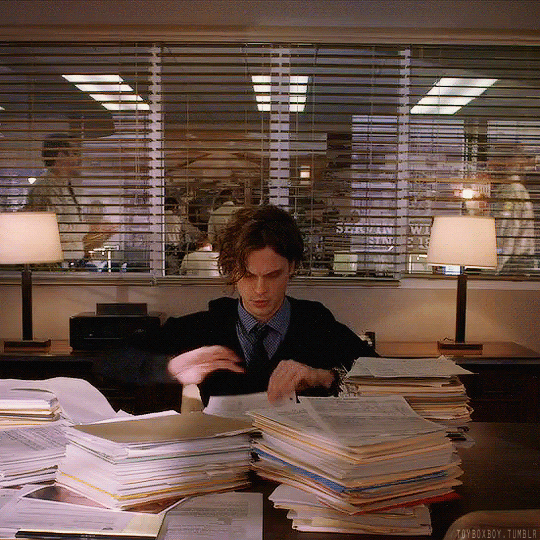
1. Do let the audience follow the character’s thought process.
As demonstrated by: Tommy Shelby from Peaky Blinders
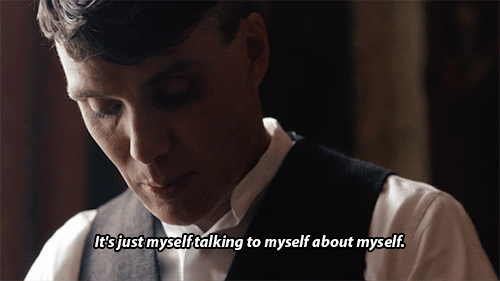
Albert Einstein allegedly once said, “If you can’t explain it to a five-year-old, you don’t truly understand it.” And the sentiment rings true: true genius doesn’t need to dazzle with big words and technobabble. Instead, it makes the complex appear simple.
The same rings true for brilliant characters. BBC’s Sherlock (more on that later) ceased to satisfy in its later seasons because it began to rely too heavily on visual glitz to avoid actually explaining its mysteries and how they were solved. Similarly, the biggest complaints with block buster franchises -- Star Wars, The Avengers, Game of Thrones -- is that they became obsessed with “subverting expectations” cleverly instead of leading the audiences to their most logical and satisfying conclusions.
Meanwhile, the smartest and most satisfying media dazzles not by staying over the audience’s head, but by illustrating how simplistic the solutions can be.
Let’s start with my boy Tommy Shelby, the charismatic, swaggering protagonist of the charismatic, swaggering crime drama Peaky Blinders. Using only his intelligence (and complete disregard for his own life/suicidal tendencies, but that’s not the point here), Tommy claws his way up from the near-bottom of the social ladder (an impoverished Romani in early 20th century Birmingham) to being a decorated war hero, to being the leader of a feared razor gang, to dominating the race track business, to becoming a business mogul, to becoming a member of parliament and trying to assassinate the leader of the fascist party. He’s also one of the paramount reasons why I’m bisexual.
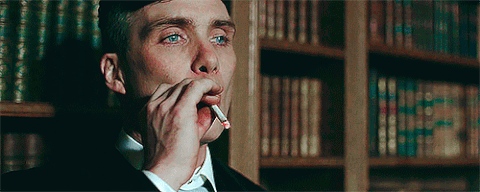
So how can such a drastic social climb be conveyed believably? Because Tommy -- as the viewpoint character -- is placed in seemingly inescapable situations, and then proceeds to demonstrate that the solutions to those situations have been there the whole time. I recently watched a brilliant video on how this is done, which can be viewed here.
Early in season one, for example, he responds to aggressive new methods by the police by organizing a mass-burning of paintings of the king, and uses the press this garners to publicly shame the methods of the chief inspector who’s been antagonizing him. In the next season, he talks his way into a deal by bluffing that he planted a grenade in his rival’s distillery. My personal favorite is in season four, when he responds to being outgunned by a larger, American gang by contacting their rival -- none other than an Alphonse Capone.
All of Tommy’s victories are satisfying, because they don’t come out of nowhere -- we have access to the same information he does, each victory is carefully foreshadowed, and we are reminded at every turn that failure is a very real possibility (more on that later.) So when he wins, we’re cheering with him.
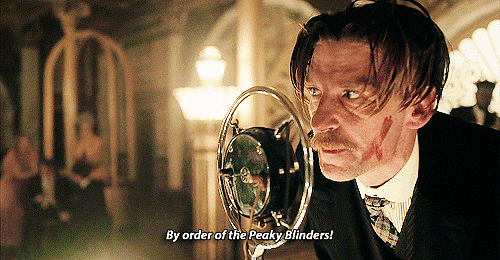
Other examples: Mark Watney from The Martian, who explains science in its most simplistic terms and with infectious enthusiasm. He would make every character on The Big Bang Theory cry.
Also, Miss Fisher from the AMAZING Miss Fisher’s Murder Mysteries. The dazzling, 1920s, female Sherlock Holmes of your dreams. I cannot recommend it enough.
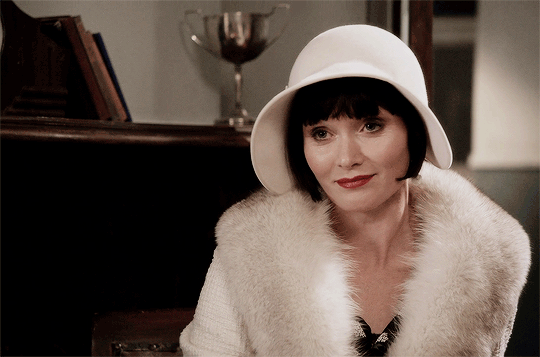
To apply this to your own writing: Remember you won’t dazzle anyone if you smack them in the face with a “brilliant” plot twist. They want to take a journey with your character, not be left in the dust.
Also, for everyone in my askbox concerned that they’re not smart enough to write intelligent characters, just remember how simple the problems confronting smart characters can be. Put them in a difficult situation, and provide them with a means of getting out. Then, just let them find it.
2. Don’t assume the audience is too stupid to keep up (or try to make them feel too stupid to keep up.)
As demonstrated by: Sherlock Holmes from BBC’s Sherlock.
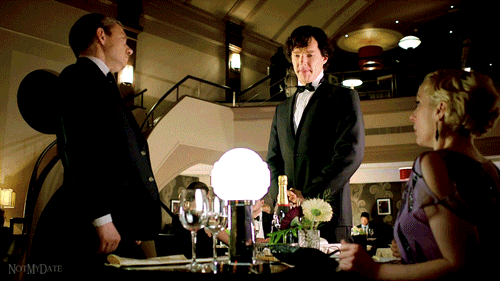
Say what you will: there were reasons why everyone was so captivated by this show during its first two seasons. It felt fresh. People had yet to become frustrated with the inescapable thirst for Benedict Cumberbatch. The writing was sharp, and the editing clever. And it wove a tantalizing web of mysteries that demanded solution. The problem was, there weren’t any.
The most frustrating for many was how Sherlock faked his death at the end of season two, after which devoted fans spent two years creating intricate theories on how he might have pulled this off. The creators responded by mocking this dedication in the opening episode of season three, by showing a fan club spinning outlandish theories (one of which included Sherlock and Moriarty kissing.) This might have been laughed off -- at the time, many seemed to consider it quite funny -- if the creators had bothered to offer their own explanation of how Sherlock survived. They didn’t. And so began a seemingly endless loop of huge cliffhangers that promised -- and consistently failed to deliver -- satisfying answers.
The most egregious examples occur in season four, which provided answers to questions no one asked, and withheld answers for things everyone wanted to know. For example, did you know that the real reason Moriarty engaged Sherlock is because he was hypnotized by Sherlock’s secret evil sister? The same one who killed Sherlock’s best friend, whom Sherlock convinced himself was a dog? Yes, that was a real plot point, in the climax of the series. It’s an effort to befuddle the audience with brilliant and unexpected writing, but instead pulled them out of a story they were already invested in and made them far more critical of its pre-existing faults.
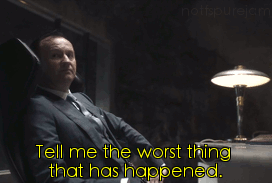
It’s pointed out in the brilliant (if bluntly named) Sherlock Is Garbage, And Here’s Why that Moffat can be a great writer, but is a consistently terrible show runner, because he’s more interested in dazzling the audience with cleverness than actually telling a satisfying story. The video also points out that the show often implied Sherlock’s brilliance, without ever letting the audience follow along with his actions or thought-process in a way that DEMONSTRATED his brilliance.
I highly recommend giving the aforementioned video a watch, because it is not only a great explanation of how Sherlock Holmes can be best utilized, but about how writing itself can be best utilized.
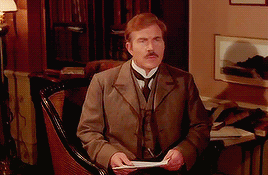
Other examples: The Big Bang Theory. As Wisecrack points out in their wonderful video on the subject, the punchline of every joke is “oh look, these characters are smart nerds!” which is repetitious at best and downright insulting at worst.
How to avoid this in your writing: Treat the audience as your equal. You’re not trying to bedazzle them, you’re trying to take them on a journey with you. Let them be delighted when you are. Don’t constantly try to mislead them or hold intelligence over their head, and they will love you for it. Also, cheap tricks do not yield a satisfying story: readers will know when you went into a narrative without a plan, and they won’t appreciate it.
3. Do remember that smart people can be kind and optimistic!
As demonstrated by: Shuri from Black Panther.
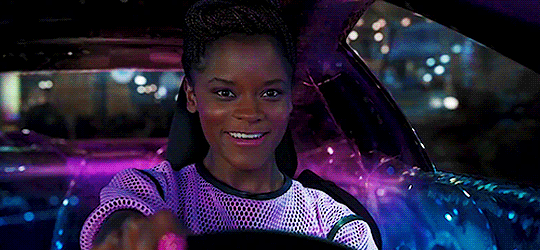
Yes, brilliant people can be unhappy and isolated by their intelligence, or rejected by society. But remember that intelligence isn’t synonymous with a cantankerous attitude, or an excuse to be a pugnacious ass to those around you!
Part of the reason why Shuri of 2018′s Black Panther was such a breath of fresh air was the fact that she subverted almost all preconceptions about how a genius looks, acts, and regards the world. And it’s not just the fact that she isn’t a sullen, middle-aged white man that makes her stand out: Shuri has an effervescent attitude, and genuinely loves contributing to her country and family. She referred to sound-proof boots as “sneakers” (and then explained the pun when her brother didn’t get it.) She’s fashionable. She teases her older brother, and cries when he is apparently killed. She’s up on meme culture. This makes her unlike pretty much every other genius portrayed in the MCU.
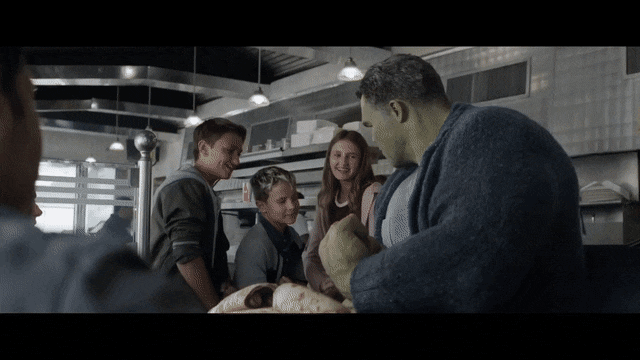
Except maybe the Hulk. He can dab now.
Shuri is also allowed to take pride in her genius, and can be a bit insufferable about it, which makes her more enjoyable and rounded. But she is an excellent example of how genius can be explored and portrayed in fiction, and I will forever be embittered that she was underutilized in Infinity War and Endgame.
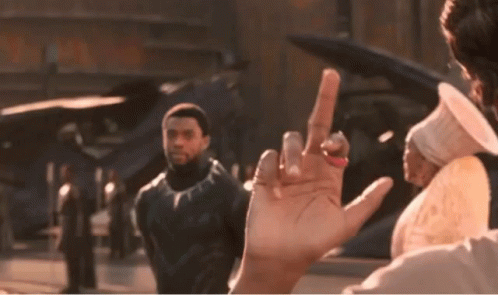
Why, for example, are all geniuses portrayed as arrogant misanthropes? Albert Einstein battled depression, but he is also said to have enjoyed blowing bubbles and watching puppet shows. He was kind to those who knew him. Similarly, Alan Turing behaved little like his fictional counterpart, described as “shy but outgoing,” with a love of being outdoors. Nikola Tesla fell in love with a pigeon. Why do we have to portray these people so damn gravely?
Other examples: Spencer Reid from Criminal Minds. Also an excellent portrayal of an intelligent person on the autism spectrum, as he struggles to interface socially but cares profusely for his fellow human beings. He is brilliant, and completely precious.
Also, Sherlock Holmes -- the original version, and all faithful adaptations thereof. Anyone who thinks Sherlock is an austere, antisocial jerk isn’t familiar with the original canon. He blushed when Watson complimented his intelligence, for God’s sake.
Then there’s Elle Woods from Legally Blonde and Marge from Fargo. Brilliant, upbeat, optimistic geniuses.
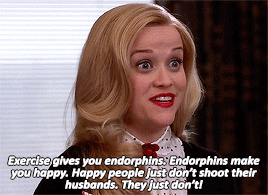
To apply this to your own writing: If you have a smart character who hates everyone around them for no identifiable reason, ask yourself why this is necessary and what this adds to the plot. Are they angry about injustice, towards themselves or others? Are they frustrated with an inability to relate to people? Do they want to protect themselves or their family at all costs, including politeness? If not, question why your brilliant character can’t also be kind to those around them.
4. Don’t make your character perfect at everything they do.
As demonstrated by: Wesley Crusher from Star Trek: The Next Generation.
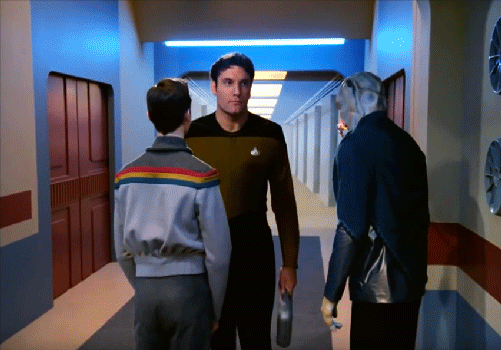
Ah, Wesley. Some call him the original Mary Sue, and it’s one of the only times I’ve seen the term applied with some accuracy. He is somehow the most gifted and least qualified person on The Enterprise. He’s Hermione Granger without the charm, jumping in to answer questions before any of the trained officers in the room have the chance to, always in the right. His only obstacle? Why, the boorish adults he’s surrounded with simply don’t understand his brilliance!
As early as the series’ very second episode, Wesley -- inebriated by an alien illness -- forcibly takes over the ship from Captain Picard, only to later save it from a threat with a reverse tractor beam of his own design.
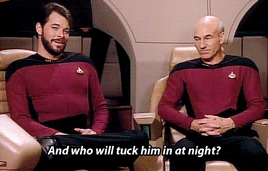
Wesley was obviously inserted as a means of attracting younger viewers, but failed egregiously, because he was too annoyingly perfect for kids to relate too, and not cool enough for them to be invested in. I binge-watched the various Star Trek series in my youth for Spock, Data, and my wife Seven of Nine, not to watch seasoned military and scientific officers get lectured by an adolescent. Even Wil Wheaton, who had the misfortune of portraying this character, expressed a dislike for him.
Precocious children are great, if you get them right. But get them wrong, and they can easily become your most annoying character, marring the face of otherwise great media. The most important thing you can do for a brilliant character is endow them with weaknesses and flaws -- even something as small as Shuri’s fondness for teasing her older brother made her enjoyable, as anyone with siblings could relate to their dynamic.
But, what if you want a supernaturally talented character who not only fails to be a ray of sunshine, but is something of an arrogant, antisocial jerk? Can they still work, especially if they also happen to be a child?
Yes, under one extremely important condition:
5. Do keep your characters out of their depth!
As demonstrated by: Number Five from Umbrella Academy.
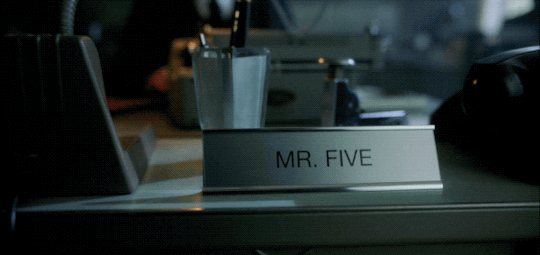
Okay, he’s not exactly a child. He’s a fifty-eight-year-old trapped in a child’s body, who’s traveled back in time from a post-apocalyptic future to warn his siblings of an incoming Armageddon. In other news, Umbrella Academy is a weird show. Unlike the comics, however, the apes don’t engage in prostitution.
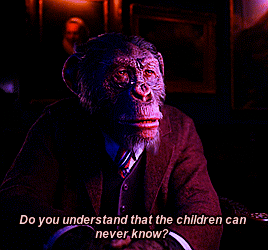
The effect, however, remains the same: a preternaturally talented child who talks down to everyone around him, including his (apparently) older siblings. So why does he work while Wesley fails so egregiously?
For one thing, it’s demonstrated early on that Five has the skills to back up his sanctimonious attitude, with the delightfully ultraviolent Istanbul (Not Constantinople) sequence. It also helps that he lacks Wesley’s squeaky-clean moral code, to the point at which he can get drunk in public or kill without remorse.
But: the element most vital to his success as a character is the fact that he’s kept completely, and consistently, out of his depth. He knows the world will end in eight days, but he doesn’t know how this will transpire or how to stop it. Ultimately, he fails again to stop the apocalypse, and must travel back in time with his siblings for another chance.
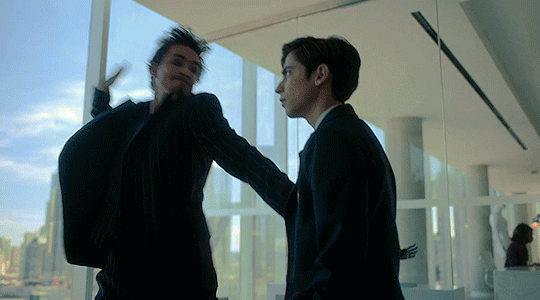
Most authors have the impulse to demonstrate a character’s brilliance by allowing them to succeed against insurmountable odds, but the Umbrella Academy writers show tremendous wisdom in allowing Five to fail. This allows the audience to empathize with him, and countermands the effects of his arrogant attitude.
This advice isn’t just true for pint-sized prodigies. Look back over this list, and take notes of how often the most successful characters are allowed to fail, to have flaws, and to ascend past their comfort zone.
Other examples: Virtually every successful example on this list.
Tommy Shelby, a character of limitless ambition, conducts a new, perilous climb outside of his social rank each season, which almost always puts him in positions of mortal danger. He faces threats both external (rival gangs, evil priests, and rising fascists) and internal (hello PTSD, suicidal tendencies, and crippling addiction) but either way, we understand that his fast-paced climb is not for the weak-willed or faint-hearted.
Mark Watney is a brilliant scientist who has been stranded in an utterly impossible situation for which absolutely no one could be adequately prepared (spoilers: it’s on Mars.) We are drawn in by his plight, and how he could possibly escape from it, and there we come to admire him for his courage, optimism, and humor.
Shuri, though not the main character of Black Panther, is allowed to show off both tremendous gifts and vulnerability, as she is powerless to stop the apparent death of her beloved older brother. She watches Wakanda’s takeover both as an innovator and a young woman, and a large reason for her success is that she is allowed to be both.
How to apply this to your writing: When portraying intelligent characters, take stock of how often they fail, their level of control over their surroundings, their vulnerability, and their flaws. We don’t want to read about flawless deities. We want to read about characters who embody and personify our humanity. So remember they need to fall down in order to pull themselves up.
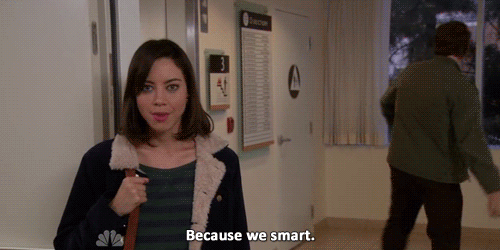
Happy writing, everybody!
#long post for ts#writing tips#writing smart characters#peaky blinders#tommy shelby#mark watney#the martian#miss fisher's murder mysteries#shuri#black panther#spencer reid#criminal minds#legally blonde#fargo#number five#the umbrella academy#star trek#star trek: the next generation
923 notes
·
View notes
Text
Alpha Trion: An Analysis of the Wizard of Bots
Hello, Transformer fans. Today, we pay our respects to the elderly by doing a character analysis of the Autobot who no matter how much we come to know about him, the more mystery there is behind his character. Let’s delve into the history, facts and all around definitive traits about the Autobot sage Alpha Trion.
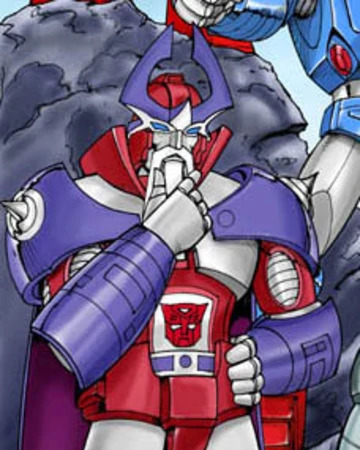
Alpha Trion was first introduced as the mentor of Optimus Prime as well as the keeper of all Autobot knowledge that is written, contained in the Matrix and beyond in the G1 cartoons. He is also in many ways a father figure to Optimus Prime and Elita One who he watches over on Cybertron. While this is still up in the air, it is heavily implied by his colouring, traits and the appearance of his wife Beta (more on her later), he is the biological father of Elita One and therefor, the father-in-law of Optimus meaning they are in fact all family. Alpha Trion’s demeanor is that of a wise old man with a lot of life and war experience who comes across as perpetually calm, but with a slight hint of mischief and a liberalism. His trademark appearance is of an elderly bot with the doll type frame, his armour is red and blue while being the first and so far, only bot to sport a cape, he has a long beard and (while we don’t see it) long white hair beneath his helm, his alt mode is a hovercraft and he was the first bot in the Transformers lore to wear actual glasses.
In his case, he wears them not only because his optics aren’t what they used to be. They actually help regulate his psychic powers as he is a very powerful diode (a psychic Transformer) and has abilities that would be considered as magic even by other bots which explains how he survived on a Decepticon dominated Cybertron dying only of old age in the original G1 cartoon. To be precise, his glasses keep him from using his powers automatically and he has a plethora of them; clairvoyance, hypnosis, aura reading, telekinesis and telepathy. And for the record, those are just the psychic powers we know of. With such a long list and taking into account how powerful he is, Alpha Trion needs those glasses to keep his powers in check so they don’t overload his mind or uses them on someone he didn’t mean to use them on.
Another thing about Alpha Trion is that like Optimus, the “Trion” in his name is actually a title. In Autobot culture, there is always one Trion who serves as the religious figure, the head archivist, the sage, the second in command of all Autobot kind and the keeper of all sacred data including that which is exclusive only to the Trion to know. Unlike being a Prime in which you become one by assignment by the previous Prime or it was literally in your code to begin with, being a Trion is a spiritual thing so the selection is done by divine intervention. As soon as the current Trion passes on, the divine Trion protocol gets passed onto the Autobot who Primus deems worthy though in some cases, if the current Trion has a good guess of who will be their predecessor, they will take time to train them. A Trion’s special abilities by default are being a powerful diode with a plethora of psychic abilities though the bot usually had them to begin with as well as other spiritual abilities. In the case of Alpha Trion, he has some powers the whole time, but they were nowhere near what they became when he became ordained. Another thing that is worth noting about Trion’s is that they are not actually fighters and seem to take an oath of pacifism of which they are not allowed to commit any direct act of violence though they are allowed to help provide tools or assistance during war.
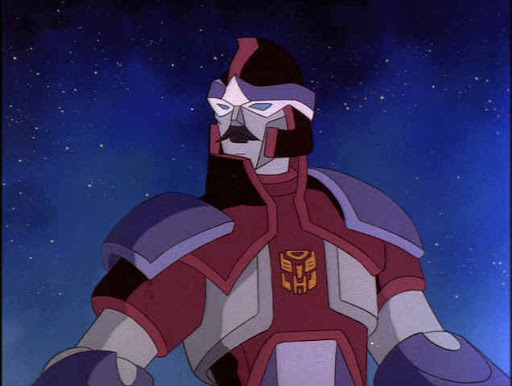
Going back to Alpha Trion specifically, his life’s story begins when he fought in his own war though his was a little different. Back in his day, the Autobots fought to free themselves from their slavers the Quintessons. During this time, he went by the name A3 though he still sported facial hair and a pair of glasses. He also proved to be quite the fighter and rebel with a personality that was a similar to Rodimus’. Like Optimus, he had a wife who fought alongside him who went by the name of Beta Maxx or simply Beta. While she was dressed in green, we can see that she still has a striking resemblance to Elita One and even A3′s armour style back in the day was a lot like Elita’s which further hints that they are her parents.
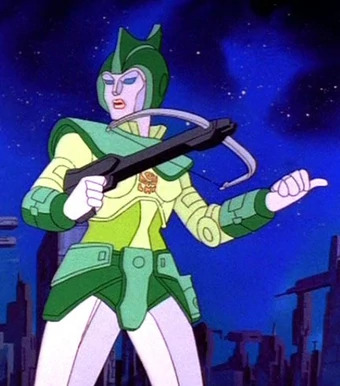
After the war was won, we can assume that the two of them lived very peacefully and happily on Cybertron and quite possibly had their daughter. It was also during this time where A3 was ordained and was now took on the name of Alpha Trion. It is not known who the previous Trion was though it is heavily implied by Alpha Trion’s disciplined behaviour and extensive knowledge that he had a chance to be trained before getting ordained. It is also not known who the Prime during this time was though it is most likely that it was one of Orion Pax’s parents. When the Decepticons attacked one day and both Orion Pax and Ariel were injured, Alpha Trion rebuilt them into warriors known as Optimus Prime and Elita One. It isn’t known what became of Alpha Trion’s wife though a lot of evidence suggests that she was one of the casualties in the war between the Autobots and Decepticons. As the war went on, true to his duty and oath of pacifism, Alpha Trion acted as a guardian to Vector Sigma and would only assist the Autobots on Cybertron in their war. He was also an unofficial member of Elita One’s team by acting as a strategist and an adviser. When Elita One got captured, he had a hand in freeing and helping her before once again going into hiding. While Alpha Trion managed to elude the Decepticons and never even got taken prisoner, he sadly did not live to see the long awaited peaceful era as he died of old age near the end of the war appearing only as a ghost yet still offering help even from beyond. In the G1 cartoons, it is has never been confirmed who the new Trion was after him.
According the the comics, Ultra Magnus was his predecessor and faces the same struggle that Rodimus does as Prime; he has a very big pair of shoes to fill and often questions if he can do the job. In the War for Cybertron cartoon, Ultra Magnus was implied to be the new Trion in secret after Alpha Trion was murdered by Megatron and after he was killed, Bumblebee became spiritually ordained with the Trion protocol appearing before him in the form of Alpha Trion. In the Animated series, Alpha Trion appears once again as a sage figure though the extent of his role and title is not explored. However, it is heavily implied that his influence and rank goes far beyond that of a Prime. In the Prime series, Alpha Trion died in the war though it isn’t known if he was killed or died of old age. Before he did pass away, he passed the key to Vector Sigma to Optimus for safe keeping and appeared to Optimus in spirit when he was close to death to help him join the Allspark. It isn’t known who took up the Trion mantle after Alpha in Prime though. In the Michael Bay movies, Alpha Trion did not make an appearance, but Sentinel Prime was modelled after him in appearance though his personality could not be more different.
While Alpha Trion is not a mech of action, his legacy is definitely comparable to that of Optimus’ in that we can picture no one else with his role, but the wise old mech. Despite not appearing often in the cartoon, he made quite an impression that lasted and cemented itself in the lore. If Optimus Prime is to Autobots what Papa Smurf is to the Smurfs, then one can say that Alpha Trion is what Grandpa Smurf was to them. He has a similar role to Optimus, but is the one person who surpasses him in terms of wisdom and has an incredibly different view of the world for it. It has been confirmed that Optimus is very conservative whereas Alpha Trion is in fact liberal hence why he not only allowed his beard to grow out, he flaunts it which is unusual in Transformer society as hair is usually not considered as a desired trait for mechanical beings. And while that side of him was not very explored, Alpha Trion has a mischievous side and was at times known to be defiant. It is kind of a shame that he never got a chance to meet Rodimus because I imagine the two of them would have gotten along well. As a side note which I find amusing is that Alpha Trion from his youth to his silver years was always consistently handsome according to sources because he was athletic. Well, you don’t live THAT long unless you stay in shape and in his defence, anyone who can sport a superhero style armor while being able to show that much leg at that age must have aged well. I do hope that in the next era, he will be showcased more as a regular character rather than just a background one because he really is one worth showcasing not just as the Trion, but just as himself.
Anyway, what is your take on the Autobot elder?
If you have a Transformers theory or character analysis you want explored, please let me know in my ask box. And please, support me through Patreon or Ko-fi if you want me to make Transformers merch and videos. Or if you want a commission of your favourite bot, let me know in my shop. All links are on my profile page.
Thank you for reading and please, stay safe.
#transformers#tranformers fandom#transformers alpha trion#alpha trion#a-3#elita one#transformers elita#elita#elita 1#transformers optimus prime#transformers prime#vector sigma#ultra magnus#fan theory#character analysis#transformers animated#tfa
32 notes
·
View notes
Text
Killing Eve: Episode Analysis
*SPOILERS*
Season 3, Episode 5 - Are You from Pinner? [Part 1]

This episode, like S3E4, follows a comletely different format to all the other episodes, as it focuses solely on Villanelle’s time with her family in Grizmet and doesn’t include any other storylines from any of the other characters in the series.
We begin with Villanelle’s arrival at Grizmet, where we get a scene of a huge logging truck beeping it’s horn at a completely oblivious Villanelle, as she’s walking along listening to music. This lack of awareness in her surroundings is highly unusual for Villanelle, who’s success in her profession hinges on her being constantly alert and highly astute. Previously the only other instance where we have seen Villanelle not being on top form; is in S2E4, when she takes drugs and almost kills a girl for no reason, after she thought Eve had lost interest in her. Making the point of showing us how she’s not as alert as usual, displays how Villanelle is distracted and not able to focus at the thought (and pressure) of being reunited with her family.
Villanelle also has her hair out, illustrating how she’s willing to open, and immerse herself, into her family that she’s going to be reunited with.
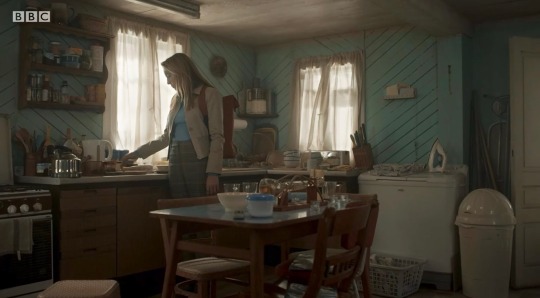
On arriving at the family home, Villanelle enters the house and examines the kitchen. She looks at all the little mundane objects like the sugar bowl, the food cooking on the stove and some knitting supplies. As Villanelle’s looking at these things, we can see that she’s considering what her life could have looked like, and how different it would have looked, if she hadn’t been left at the orphanage.
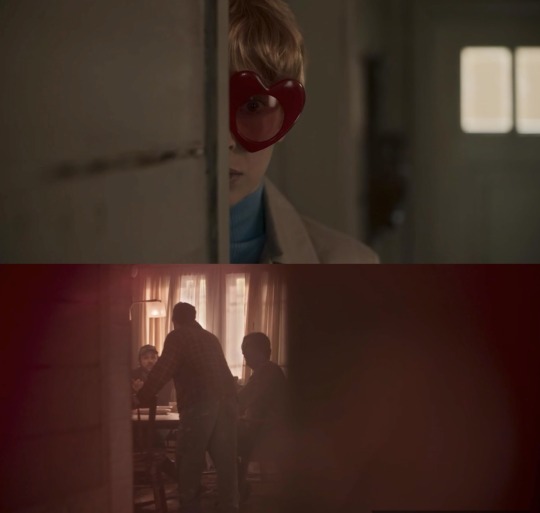
After Villanelle has met most of the members of her family (she’s yet to meet her mother, Tatiana), we see her sitting in Bor’ka’s bedroom as she talks to him about the best foods to eat in the various countries that Elton John has visited. When asked about Vienna, Villanelle tells Bor’ka that there is “great ice cream in Vienna”, which is a nice little reference to the very first scene of the whole series, when we first meet Villanelle eating ice cream in Vienna after a kill.
During her conversation with Bor’ka, Villanelle puts on some red heart glasses with pink-ish coloured lenses in them, an accessory that Elton John is famous for wearing. We get a shot of her looking at her family with the glasses on, as well as a shot of her view of her family through the pink lenses of the glasses. In the first shot of Villanelle as she looks at her family with the glasses on; through the imagery of this shot we are shown how Villanelle is watching her family with literal ‘heart eyes’ - just like the apron she wears at the end of the episode, she is putting her whole heart out and offering it to her family to try and find the place of belonging she has been looking for.
Similarly in the shot of Villanelle’s point of view through the tinted lenses, we are shown how Villanelle is watching her family through literal ‘rose-coloured glasses’, the definition of this idiom is “a happy or positive attitude that fails to notice negative things”). In this way, through the chosen imagery in both of these shots, we are being shown how Villanelle is letting herself be carried away by her heart, now she thinks she’s found her family and finally found a place where she feels that she belongs - she is looking at her family unrealistically and putting an impossible optimism them for what she hopes to gain from her visit home.
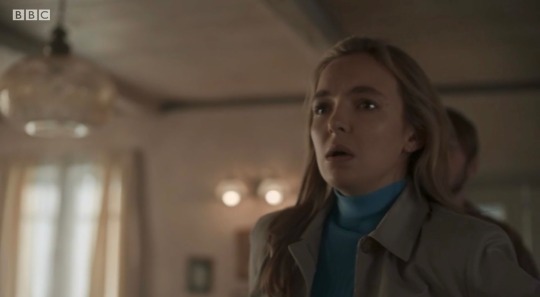
As soon as Villanelle finds out that her mother, Tatiana, has arrived home, we see one of the only times Villanelle has been in pure terror and distress. Villanelle fully panics when she finds out Tatiana is back and she frantically runs around the living room, trying to find a way out. The only other time we have seen Villanelle display this level of anxiety was in S1E2 when she being held prisoner by Julian and was incredibly weak after being stabbed by Eve.
As Villanelle is running around trying to escape, ‘Bumble Bee’ by LaVern Baker is played over the scene. The lyrics that can be heard are:
“I'm gonna have to put you down,
You been treating me like a clown,
You know you've hurt me once before,
You'll never hurt me anymore,
Shoo-ee, you hurt me like a bee,
A bumble bee, a evil bumble bee”
Although we haven’t been told yet what happened between Villanelle and her mother, the lyrics of the song accurately reflect what is soon revealed to us. The lyrics of the song, together with the information that we are later given - that Tatiana was a terrible mother to Villanelle, who she thought had “a darkness” - is the reason for the frantic panic that Villanelle reacts with, when she realises that she has to confront her mother again after all this time. When Bor’ka says that “mum” is home, Villanelle suddenly remembers how her mother “hurt [her] once before”, and most likely how she doesn’t want her to “hurt [her] anymore”.
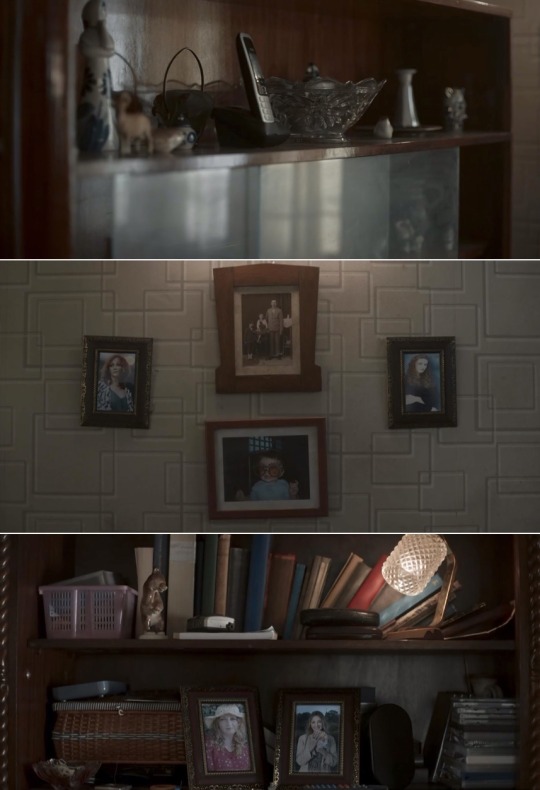
When Tatiana enters the house she drops her shopping bags, she walks over to Villanelle to hug her and then starts crying, calling Villanelle “my Oksana”. It’s left fairly ambiguously as to whether this emotional reaction from Tatiana was genuine. However, the three separate close-up shots that follow the hug, suggest that Tatiana was not being genuine.
We are shown two shots of Knick-Knacks on bookcases and one shot of some family pictures on the wall. Interestingly, within these three shots, there are a total of four framed photos of Tatiana on her own, with no-one else in the pictures with her. The choice to show shots of the Knick-Knacks suggest that Tatiana is not being sincere, as we are being shown how she attempts to hide her “darkness” by putting on this facade of being a good wife and mother, which we (and Villanelle) later see starts to slip.
The individual photos of Tatiana also suggest that she is not reacting genuinely to seeing Villanelle, as we can see that she’s clearly a narcissist and so makes as effort to put out a particular image of herself - in this case she’s putting on a show for the other members of her family, so that she can maintain the image that she’s spent so long building up: the loving mother who was forced to give up her child and is finally being reunited with her, after thinking she was dead for all thee years.
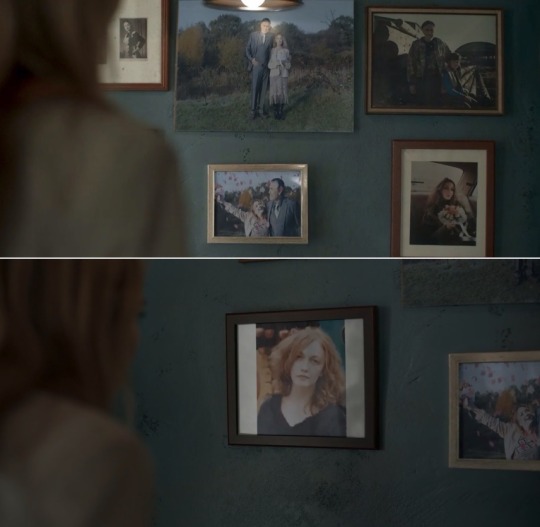
It’s further shown how Tatiana tried to bury her old life and start a fresh one (she started again by getting a new husband, a new house and new children), when Pyotr brings the photo album with the childhood pictures of Villanelle. He brings out the album and says that he found it “in back of loft”. Tatiana has plenty of family photos in the house, and a great number of them are of herself; so to not have any pictures up of Villanelle, and the fact that the album was found pushed away in the back of the loft, shows how she tried to hide away any remnants of Villanelle after she left her at the orphanage.
Even more notable is that there is no pictures of Tatiana’s husband, Villanelle’s father, anywhere. As Villanelle is looking through the photo album she says “where is Dad? There has to be one of him before he died”. Again it’s been heavily emphasised that there’s a lot of photos in the house, and there’s even quite a few pictures of Villanelle even though they were hidden away. So for there so be absolutely no pictures at all of the father, it’s insinuated that Tatiana and the father’s relationship wasn’t good before he died, or it wouldn’t be out of the realms of possibility to assume she’s lying and the father left her - or perhaps even, given that Tatiana has a darkness akin to Villanelle’s own darkness, that she killed her husband.
Following Tatiana’s arrival back home and her reunion with Villanelle, she says to Villanelle, “I used to like dressing up and you always wanted my clothes, so I would make costume from old curtains for you”. By Tatiana saying this, it is implying that this is where Villanelle began her love of clothes and dressing up in different disguises.
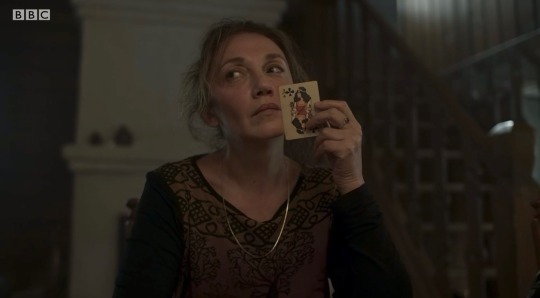
The next scene we get, is of the whole family playing a card came, called Mafia/Werewolf, together. Fyodor accuses Villanelle of being Bor’ka’s ‘killer’ in the game, but he gets it wrong and Tatiana reveals that she was in fact the ‘killer’. Villanelle is the literal ‘killer’, however in the game it’s Tatiana, which signifies how Tatiana actually has more darkness than Villanelle, but she tries to conceal it.
The card Tatiana holds up is also the Queen of clubs, which further emphasises how she is the queen/matriarch of the household.
In this scene, we also get our first glimpse at Tatiana’s cruelty. Bor’ka says “mum you murdered me”, and Tatiana replied that “I had no choice Bor’ka” and he says that “you could have murdered the others”. He’s right, why would she choose to ‘murder’ Bor’ka when he’s the youngest one playing and is still only a child; she picks on him unnecessarily, just like how she picks on him at the Harvest Festival by telling him that he was “stupid and embarrassed her”.
We are also shown the complete control and power that Tatiana, being a narcissist and as the matriarch, has over the family - she only needs to say “eh” and tap on the table while Pyotr and Fyodor are arguing, to get them to stop.
Tatiana’s narcissism is additionally shown, when she makes her speech to the rest of the family. She says “I like to make speech. This night is very, very special for me. My girl, my little girl”. Tatiana’s repeated use of the personal pronouns “I” and “me”, demonstrate how her focus is all on herself, not on Villanelle or the rest of the family, but on how important and special this is for herself.
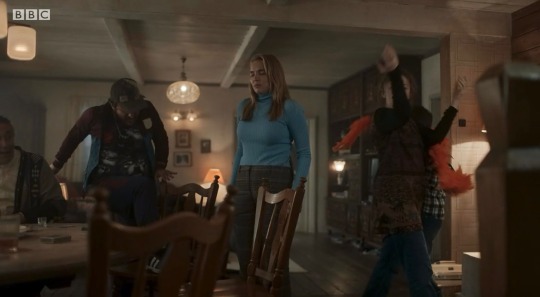
The scene continues to give us another instance of dancing, which Villanelle is uncomfortable with, just like in S3E1 with Maria. However unlike with Maria, where Villanelle just sort of stands and looks at Maria, while she’s trying to dance with her, Villanelle actually makes an attempt to partake in the dancing with her family.
She gets up with them and bobs up and down a bit, and we even see her start to sing the chorus of ‘Crocodile Rock’ by Elton John, with them before the scene cuts. Although she’s clearly uncomfortable, the fact that Villanelle makes a conscious effort to dance with her family, shows us how much effort and how desperately she wants to belong in the family. However, the fact that she’s still uncomfortable and it’s still not coming naturally foretells how although she is trying, this still isn’t the right fit for her or what she’s looking for.
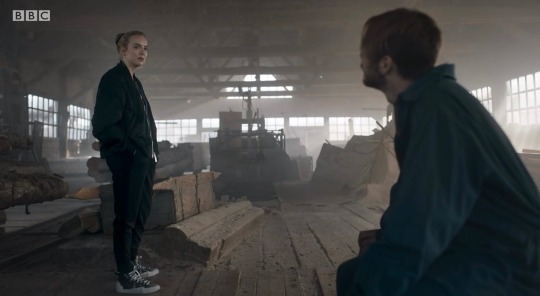
Going onto the next scene, we see Pyotr taking his anger out on an old sofa and Villanelle comes to visit him. She’s wearing a mostly black outfit and has her hair up now, unlike the day before when she arrived; her appearance is reflecting how she’s closed herself off more now, and to show that she’s focused (like when she’s on a job). Villanelle is focused because she uses the day to speak to each of the members of the family, to find more information about what happened in the time while she wasn’t there and also to find out more information about her mother.
While Villanelle is speaking to Pyotr she says “you always wanted to be a firefighter, right?” and Pyotr says to her “you remember”. As Tatiana said earlier, that “the orphanage phone me and say you burn place down”, it’s most likely that Villanelle burned down the orphanage in the hope that her brother (who she knew wanted to be a firefighter) would come with the fire brigade to the orphanage to put out the fire; and in turn, come and find her there as well and rescue her.
The description that Villanelle’s gives to Pyotr of her father, that he was “funny, strong, taught me how to fight”; just like Tatiana and the clothes, we can see that Villanelle has taken these characteristics from her father: Villanelle tells Gabriel in S2E1 “yes, I am funny”, later on in this episode Yula’s friend says “she’s funny” and it’s clear that she’s strong and can fight.
Pyotr goes on to ask Villanelle “how they say we die”, and she replies only by saying “car crash” - another foreshadowing for the end of the episode. Villanelle’s family may not have died from an actual “car crash” when the orphanage told her they did, but they do end up dying at the end of the episode because her visit to her family was a metaphorical “car crash”.
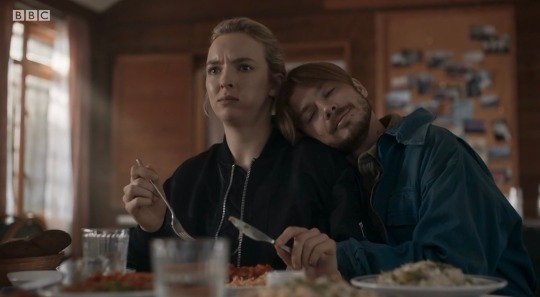
In the next scene, when Pyotr and Villanelle are eating golubtsy, Pyotr says that “she’s [Tatiana] not a bad woman, people here say she is saint” and Villanelle says that “people here don’t know her”. This confirms what had up until this point just been alluded to, that Tatiana got a new husband, a new family and a new house (presumably in a different town) to try and hide her previous life and create a new image for herself.
*TO BE CONTINUED IN PART 2 OF ‘ARE YOU FROM PINNER? Episode Analysis’*
You can read my previous Killing Eve posts here:-
First Introduction to Villanelle
First Introduction to Eve
S1, E1 - Nice Face
S1, E2 - I’ll Deal With Him Later
S1, E3 - Don’t I Know You?
S1, E4 - Sorry Baby
S1, E5 - I Have a Thing about Bathrooms
S1, E6 - Take Me to the Hole!
S1, E7 - I Don’t Want to Be Free
S1, E8 - God, I’m Tired
S2, E1 - Do You Know How to Dispose of a Body?
S2, E2 - Nice and Neat
S2, E3 - The Hungry Caterpillar
S2, E4 - Desperate Times
S2, E5 - Smell Ya Later
S2, E6 - I Hope You Like Missionary!
S2, E7 - Wide Awake
S2, E8 - You’re Mine
S3, E1 - Slowly Slowly Catchy Monkey
S3, E2 - Management Sucks
S3, E3 - Meetings Have Biscuits
S3, E4 - Still Got It
S3, E5 - Are You From Pinner? [Part 2]
S3, E6 - End of Game
S3, E7 - Beautiful Monster
S3, E8 - Are You Leading or Am I? [Part 1]
——————————————————————————
#killing eve#killing eve season 3#killing eve episode analysis#3x05#ke#villaneve#eve polastri#villanelle#killing eve analysis#killingeveedit#movies#film#cinematography#tv reviews#reviews#good tv#tv recommendations#killing eve spoilers#killing eve discussion#ke analysis#killing eve 3x05#killing eve S3E5#phoebe waller bridge#jodie comer#sandra oh#fiona shaw#scene breakdown#carolyn martens#lgbtq#killing eve are you from pinner?
35 notes
·
View notes
Text
ancient names, pt. xi
A John Seed/Original Female Character Fanfic
Ancient Names, pt xi: what kind of man
Masterlink Post
Word Count: ~8.2k (I’M SORRY)
Rating: M for now, rating will change in later chapters as things develop.
Warnings: Gore/violence, Still Under The Influencer of drugs, uhhhh blood. There's a lot of mentions of blood and death and what have you. Elliot has a meltdown (surprise). Joseph is creepy (surprise pt. 2 electric boogaloo). People are confused about How To Feel. I don't understand how laws work and so I'm just literally out here trying my best, you know? Don't @ me.
Notes: I wanted to start off by saying THANK YOU everyone for your feedback! I was having a real hard time hitting my stride with the last chapter but all of your kind words has given me life. There's some still in these old bones yet and I really hope that you enjoy this one.
Anyway I'm a clown and I'm sorry this chapter took so long. Joke's on you, it's always clown hour here! Thank you forever and always to @starcrier for being the best proof-reader and somehow managing to make my incoherency readable?? Manageable??? You're an angel and ily! Also, @empirics , my writing aspiration forever, and @baeogorath who makes me cry literally every time I read anything they have to say about my writing. Thank you thank you thank you!
John had never seen a person’s head blown in with a shotgun, and he wasn’t sure that he really needed to.
Ase’s blood had splattered when Jacob fired the shotgun at what he was sure could be considered point-blank range, the spray of it nearly catching them in the process. But no, it was mostly on Elliot, like she was some Carrie at her first prom, a real tried-and-true Scream Queen.
“I knew you’d find a way to fuck it up,” Jacob said, no absence of venom in his voice as he stepped away from Ase’s dead body like she was nothing—and sure, she was nothing, and John didn’t necessarily have any qualms with getting rid of her (he had blown a shell straight through her spine), but that wasn’t what was making him nauseated.
It was Elliot. Baby-blues eaten away by her pupils, blown wide with hallucinogens, drenched in blood, making a noise something close to a rabbit that thought it was going to die.
He didn’t have the energy to tell Jacob that the blow to her skull had been unnecessary, that there was no way someone could walk away from their entire stomach being blown through by a shotgun. That Jacob’s idea of “fucked up” was greatly, massively warped if he thought that Ase hadn’t been finished after shot number one. Even if he’d had the energy it wouldn’t have mattered, because the next words out of Jacob’s mouth were, “You put Faith at risk going back for her.”
The eldest Seed didn’t need to say what it was he meant; John knew. The words were “you put Faith at risk going back for her”, but what he meant was, Joseph’s going to be furious when he finds out.
“Get your pet,” Jacob bit out, “and let’s fucking move.”
John’s limbs moved of their own volition, kneeling down in front of Elliot and turning her face away from the grisly scene laid out next to her. If she recognized him, it didn’t show; she trembled, and her eyes never stayed fixed for very long, as though everything in the entire world was assaulting her senses at every second.
“Elliot,” he said, pulling her to her feet as the sound of voices rising in the distance peppered the air, “we have to move.”
Some kind of guttural sorrow welled up and out of her as he pulled her along and down the hill, her feet stumbling. Around them, the night hummed with gunfire and shouting. John was certain that he heard something like grief wracking the air at the hilltop above them, and he couldn’t bring himself to look back, afraid of what he’d see—that redheaded monster of Ase’s bent over her nearly-decapitated corpse, or worse: coming after them.
He kept one hand on Elliot’s arm and the other out in front of her case she tried to plummet headfirst down the hill—whether by chance or accident—and by the time they had reached the bottom, the strange agony sounds that had tried to burrow out of her had mostly ceased; her gaze was still glassy and dark, and there was an odd sway about her, but she looked only shell-shocked now.
Oh, John thought, absently, if that’s all.
Joey’s dark gaze darted between the two of them. He released Elliot to her without a word, his hand dropping from the blonde as Joey fussed over her. Faith swayed dreamily just a few steps away from Joey, humming a song mostly to herself; beyond her, Jacob stood, his arms crossed over his chest while he toted the shotgun in one of his hands, before he apparently got tired of waiting and grabbed Faith’s hand.
“If you want to stand around down here and chit chat, that’s fine,” he said, tugging Faith—clearly still drugged, clearly unaware of the carnage occurring around them—off to the trail that led away from the lake. “ We’re leaving.”
“Jacob—” John started. It was too late. The redhead had set for himself and for Faith a brutal and punishing pace to return them to wherever it was Joseph waited, and though he was loathe to admit it, Jacob was on the right track; pretty soon, the members of Eden’s Gate that had been sent up to wreak havoc on the Family would be dead, and he was certain that once Ase’s death was fully recognized, someone would want revenge.
“Are we going home?” Faith asked, giggling as she toddled after Jacob, barely able to keep herself upright. “That lady said John was going to come and rescue me.”
John’s chest tightened at the sound of her laughter. She was so completely unperturbed by everything—everything she had been through, had seen. He wondered how heavily they’d had to drug her, and if she would even remember half of it come the moment that she sobered up.
He exhaled, glancing at the top of the ridge above them where the lights of the cabins and flashlights and whatever-the-fuck-else those monsters had at their disposal glimmered.
“When,” Elliot said, the word grinding out of her mouth haltingly, “when... did Jacob-”
“Drink some water,” Joey murmured. She uncapped the half-drank water bottle and pushed it into Elliot’s hand and added, “And we’ll talk about it later, but right now we need to move, Elli.”
Elli, John thought, and felt a faint glimmer of amusement at the absurdity of such a soft, round nickname for a girl who was only sharp edges. Well, but she wasn’t so sharp now, was she? As he led them along the dark trail, her fingers brushing his on occasion, he would glance over at her and find her staring at him like he was a stranger, like she didn’t recognize him. Maybe she didn’t; he wasn’t familiar with the drugs they’d put her on, anyway.
“What the fuck happened up there?” Joey hissed, her hand firmly rooted in Elliot’s as she tugged her along—not unlike the way Jacob was pulling Faith. She had taken the water bottle back when it became apparent Elliot wasn’t interested in it. “Why is Elliot covered in blood —”
“She’s alive,” John snapped, “isn’t that what’s important?”
“I suppose you’ll be wanting a fucking award.”
“Stop it,” Elliot managed out. “Stop arguing. You both are so fucking loud.”
Joey’s lips pressed into a thin line. They ducked into the treeline far below Sacred Skies Camp, picking their way as quickly as they could through the underbrush, but the journey was slow and arduous; guiding Elliot through the trees had, in the last twenty minutes, become no easier than guiding a toddler. A blind, deaf toddler, who spared no interest in staying upright, and also had a metric fuck ton of psychotropic drugs in her system.
The walk there seemed to take much longer than it had going up, but John was sure that was his own adrenaline crash happening. He’d been stressed—about getting Faith out, about what he’d find, if he’d find anything at all or if they’d have done away with Elliot seconds after getting her.
Fuck . The thought filtered through his brain with dismay at the realization that he had been worried about her. Jacob was right; he’d really only needed to get Faith. But Elliot had been—she’d gone in there for them , and Joseph wanted her alive, and—
“Tired,” Elliot said, her voice hoarse and cracking with exhaustion as she took agonizing step after agonizing step. “I’m so tired, J—”
“I know,” John and Joey said, both cutting Elliot off and overlapping each other at the same time. Of course, John already knew what it was like to handle Elliot like this. They’d toddled through one field with Elliot clutching him like an anchor, drugged to the gills, once already; this was new territory for the other deputy.
Joey gave him a dark, turbulent look—the kind that implied murderous intent—and John turned his attention back to the task at hand: getting the fuck out of there.
As soon as the truck came into sight, running with the lights off, John let himself breathe a sigh of relief. He hadn’t thought Jacob would really up and leave them, but it also wasn’t impossible that he would have insisted and said fuck off if Joseph had protested. His eldest brother had been notorious for pushing back, for picking fights, and maybe—just maybe—he was pissed enough to follow through this time.
“About time,” Jacob said from the driver’s seat. Joseph did not give his input, which only served to further John’s personal unease as he opened the tailgate of the truck. Joey climbed in first, swaying just a little. He’d noticed that her pupils looked blown, too, though not quite as much as Elliot’s, so it must not have been fully out of her system yet.
John glanced up the hill absently. The sound of Eden’s Gate members still echoed. Not quite done yet, he thought absently, and then said, “Alright, Deputy, let’s get a move on.”
“Too high,” Elliot sighed, and he wasn’t sure if she meant the tailgate or herself. John turned her around from trying to clamber into the back and gripped her hips; her hands fluttered unsteadily before holding onto his arms.
“Don’t throw up on me,” he said.
She looked tired. Each second her eyes spent open seemed to demand more and more energy from her. “Expensive shirt, huh?”
“That’s right.”
He hoisted her into the back of the truck; she sat on the tailgate for a second only, and swayed forward like she was going to tumble right off; she steadied her hands on his shoulders, fingers gripping his shirt and bleeding warm against his skin.
“You did it too fast,” Elliot muttered, her voice verging on spoiled brat. Resisting the urge to roll his eyes, John climbed in after her as she scooted to the farthest spot away from the tailgate. Jacob didn’t wait for the tailgate to close before he pulled out of the brush; the truck hit the dirt road with a heavy thunk that had his teeth rattling around in his skull. Fucker, he thought, slamming the tailgate shut before the dust kicked up beneath them.
Elliot had her back pressed against the window into the truck. Blood covered her face and matted strands of her hair where they’d stuck to her cheeks; the vicious edge to her was dulled, whittled down to the bone until she was just a small girl folded up into the side of Joey Hudson.
When her eyes had fluttered shut and the night had settled a chill over them, Joey’s gaze flickered across John for a moment before landing on his face. She was silent, studying him—in a most infuriating way, wordlessly —before she finally said, “What happened?”
John glanced out at the Montana wilderness stretching out behind her, late into the night; he thought about the way Elliot had balked at the sight of the treeline, like there was something in there only she could see, something horrible.
“Well, the boys and I thought it’d be a nice night to go out,” he replied flatly, cocking his head before looking at Joey. “It’s been a while since we’ve done anything fun, you know, so it was nice to get the gang all together again for a little fun .”
The brunette’s expression flattened. “The devil rebuking sin.”
“I shot the psycho and I got Elliot out of there,” John bit out. “What did you expect?”
“You, to leave her,” Joey snapped. “That’s what I would have expected out of you.”
The words shouldn’t have stung. They were coming from Joey Hudson, after all, the only person that Elliot really cared about and so clearly the only person that John could use against her. But these facts were minor details to him now, carefully pinned out somewhere in the back of his mind—always accessible, but no longer important. Hudson had stopped being very important at all when she stopped being something to dangle in front of Elliot. Now they stung for a different reason, something that John couldn’t put his thumb on.
That’s not very true, something in him said, rattling against the bones of his rib cage. You know exactly why that bothers you.
“Well, that’s on you, isn’t it?” John replied, keeping his voice sickly sweet. “I’ll have you know I took very good care of your hellcat.”
“Yeah,” Joey ventured dryly, “having her shoved into a cult that shot her so full of poison it was coming out of her eyes really showed some TLC.”
“I’m sure she told you the plan was different,” John bit out.
“She tried. Which is why I’m wondering why you even fucking came back for us at all, Seed.”
Though Joey’s voice was soft so as not to rustle Elliot, it was pounding with venom. Hatred. That was to be expected, he thought; after all, in the short time that she’d been his ward, he’d done his very hardest to lure Elliot in with her fear and then passed her off almost immediately to Faith. But still, the wording struck him—it was the same sentiment that Jacob had flung in his face after blowing Ase’s brains out.
You put Faith at risk going back for her.
I’m wondering why you even fucking came back for us at all.
It was never the plan to save Elliot. It was always: get Faith, get out, and if you can get the deputy too—sure. Why not? She’d be indebted to them. Even more so if they got Joey out with her. But Faith should have been the absolute priority first, and he’d left her down at the lake to go back up into the middle of a firefight to get Elliot and Joey out.
If we’re partners, you have to trust me.
“I don’t know why it bothers you so much,” he managed out, trying to keep his voice as clipped as he could. “Normally, when people are rescued, they’re thankful. ”
“You did kidnap me,” Joey snapped, “so you’re closer to us being equal than my being grateful, and even that’s pushing it. I just don’t know if the rescuing still counts as a good deed if you only did it for yourself.”
John stared at her, eyes narrowing and jaw setting, tense and tight until pain radiated up into his skull. “I don’t know what you’re insinuating, Deputy Hudson —”
“Then you’re a bigger idiot than I thought.”
Elliot stirred, eyelashes fluttering. She coughed into Joey’s shoulder—the gesture not lost on the brunette, who grimaced a little—and when her eyes landed on John there was an eerieness about them, like she was trying to pull him open and peer inside, peel back the vibrating tension and hostility that Joey Hudson’s interrogation brought of him.
“What?” John asked, barely masking his irritation. It shouldn’t have bothered him so much, but it did because he couldn’t get the way she’d said, John? out of his head, small and wounded so very afraid, with Ase’s blood drenching her.
“Just trying to figure out which John you are,” Elliot replied, her voice slick with exhaustion and the words rolling out of her mouth in something close to a slur. They sent an uneasy jolt through him. It was the drugs, surely—she probably said all kinds of weird shit while she was high. He didn’t know what she was seeing, anyway.
(—fucking hate you, John Seed, John Duncan, whatever the fuck your name is, whoever the fuck you are—)
The blonde sighed again. The breath sounded like some kind of exertion for her; she squirmed and tried to get more comfortable against Joey’s shoulder, the blood on her face staining the forest-green of the deputy’s shirt. John’s head ached. The memory of Joseph, silent while Jacob debated the logistics of getting a killing shot through Elliot, flickered through his mind, venomous.
(—should see yourself whenever Joseph says anything. You practically fall over to kiss the ground he fucking walks on—)
“Well,” he replied, settling more comfortably in his spot across from the two women, “let me know when you find out, why don’t you, Rook?” He let his head loll back against the lip of the truck bed, a dark, cloudless night spreading out above him. He wanted to brush aside the way Elliot looked at him, but he had learned long ago that was the quickest way to underestimate her.
“I’m just dying to know.”
━━━━━━━━━━━━━━━━━━━━
The truck came to a halting stop. John hadn’t realized he’d fallen asleep until the strange inertia-pull of the truck stilling rustled him from his sleep. It was hard to say how long they had been on the road, but if he had to guess—and, taking into consideration how Jacob liked to drive—he’d wager it had been only thirty minutes.
Across from him, Elliot was awake, murmuring something to Joey that he couldn’t hear over the sound of the engine giving one last kick before Jacob turned it off. There was a higher clarity about the blonde, now, one that implied that sleep had done her well—though the pupils of her eyes stayed wide, there was now a sliver of baby blue that he could see, if he looked close enough.
He grimaced as exhaustion burned through his body, and for a brief second, their eyes met; like before, they pried at him, tried to see something that maybe he didn’t want her to.
As he lowered the tailgate of the truck and slid out, John turned around and instinctively reached to steady Elliot as she tried to climb down.
“I’m fine,” she said, more biting than he anticipated. Just coming down, John thought absently, his hands only remaining in the air for a second after her assertion before dropping to his sides again.
“Oh, yeah,” John replied, “I forgot that you’d rather I let you eat shit than keep you from falling over.”
She’s always been willful, he mused. The thought occurred as though John had known Elliot for a long time. In a way, he supposed that he did; fuck, he’d tried every goddamn trick in the book to lure her in, and she’d still spit her venom into her walkie at every chance she’d gotten. There was nothing that John didn’t try and dig up, nothing that he hadn’t racked his brain for in the brief moment that they’d visited all those years ago. And still— and still, and still —she—
“Hudson,” John said, offering his hand to her because he was a gentleman and certainly not because he enjoyed the way the gesture made her squirm.
“Fuck off, John,” Joey replied tersely, sliding off the truck bed as well. John smiled dryly.
He said, the needling coming to him like second nature, “So nice to have both of you here at one time. It’s what I always wanted, you know.”
Elliot shot him a look, one that sucked the wind right out of his sails. It was a wounded look, like he had suddenly reminded her of the things he had done, and John felt an uncomfortable twist in his stomach. He didn’t know why the words came out—a force of habit, maybe, or the way that Joey Hudson’s animosity (and closeness ) to Elliot made his hackles raise. As though Joey’s presence made a choice immediately clear for her, and she chose Joey.
The clench of his jaw sent pain radiating up into his skull. He thought that things had been much simpler pre-Joey Hudson, and he was regretting having helped her.
“I knew you’d come and save me,” Faith said, her voice breaking him out of the turmoil of his thoughts. She smiled at him, and it would have almost been endearing if her pupils weren’t absolutely blown to hell, reminding him that they’d probably done more than just drug her with some weird hallucinogen—the way she’d been acting when he’d seen her on the road had been something more akin to the kinds of things Faith had partaken of before.
He reached up, pulling her into a one-armed hug. “Yeah?” he replied. “You listened to those crazies?”
“They’re not crazy,” Faith sighed. Her voice bloomed with something like affection, and when she looked at him, there was a startling clarity about her expression—keen, and a little sly. Not so innocent, our Faith, he thought absently. “Just different, John. And you came, didn’t you?”
A prickling sensation crawled up the back of his neck. John glanced away from Faith, his gaze meeting Joseph’s from where he stood in front of the car; per usual, his expression was unreadable, obscured behind a mask of tranquility that provided no insight on what his brother was thinking or feeling.
“Go on,” John said, patting Faith’s back, “get some sleep. You’re going to feel like hell in a few hours, you know.”
She laughed, like maybe she didn’t quite hear what he actually said, and slid out of his half-embrace to wander around to the front of the car where Joseph was waiting. He turned his gaze away, swallowing back the feeling that he’d somehow failed a test—something that only Joseph knew the meters and results of, that he’d have to sweat until he found out about.
Elliot had already started walking away with Joey, taking her back to the same bunkhouse that she’d been holding up in prior to their little excursion. They spoke in low voices to one another; Elliot’s expression was even soft, softer than it had been when he’d found her sobbing into the grass in the field, when she’d been terrified out of her skin. Softer than when she’d had Ase’s brains splattered all over her.
John sucked his teeth, pushing the tailgate of the truck up until it latched. The adrenaline crash was starting to hit him hard, now. Every muscle in his body ached with the effort of moving, as though they’d all tensed and held for hours at a time; maybe they had. Gunfire and screaming still echoed in his head, while corpse after corpse, and Ase’s shattered head, lingered just behind his eyelids. They didn’t bother him, these images of glory and gore—but he couldn’t shake the way that Elliot had looked at him from the ground, drenched in blood, terrified.
Terrified of him.
“It’s always going to be like that, you know.” It was Jacob’s hard, steely voice that pulled him now, like his siblings wanted to take turns interrupting his train of thought. “She’s always going to pick Hudson over us.” His brother leveled him with one swift, hard look. “Over you .”
“Funny,” John muttered, “I didn’t realize you were a psych professional, Jacob.”
“Faith could have died because you went back for that girl,” Jacob bit out, his voice low but vibrating with something more venomous. “I know you know that, you aren’t stupid. And you went back for her anyway. So—”
“So, what?” he interrupted, trying not to let the frustrated venom from watching Elliot take Joey’s hand and walk off bubble out of him. “Faith’s alive, that crazy bitch is dead. What else do you want?”
“For you to get your shit together,” Jacob snapped. “Like I said, I know you’re not stupid, but do yourself the favor and prove it to me anyway. That girl —”
That girl, Jacob said, like the words didn’t suddenly fill John with some kind of poison. The eldest Seed gestured toward the bunkhouse, where inevitably, Elliot and Joey were conspiring; to leave, to kill. At this point, John wasn’t sure, and he didn’t think that either would surprise him.
“—is nothing. Don’t let nothing fuck everything up for us.” Jacob’s words were hard and cold. He gripped John’s shoulder and added, “Don’t let nothing fuck everything up for Joseph.”
That’s what it really boiled down to at the end of it all: that Joseph had seen like he always did, because nothing went without Joseph’s seeing, and maybe he wasn’t sure that Elliot was really worth the trouble anymore. Before, Joseph had wanted her to add to their little collection of misfits, just like he’d added the sheriff’s receptionist, just like he’d picked up Faith when she was Rachel, just like when he let Jacob tap into the worst parts of him for use, just like just like just like . Joseph was hard-pressed to find a vicious misfit that he didn’t want for himself, and Elliot Honeysett had been no different.
But a hard-to-break will cost time, and resources, and maybe with these locusts in their garden, that just wasn’t going to cut it anymore. Not for Joseph. Not right now. Where was this, anyway, back at the start of it all? Back when John had wanted to do things his way?
“Whatever Joseph’s opinion on the usefulness of the deputy, Burke’s gone,” John said after a minute. Jacob’s hand still sat heavy on his shoulder; he passed a hand over his face and sighed. “That marshal, the one that was—”
“I remember.”
John grimaced. “He was with Faith, and Hudson, but he wasn’t at the camp that I could see.” He paused again. “Jacob, if he got out and he made it out of Hope County, he’ll be a problem.”
The red-headed nodded once, brisk. “A big fucking problem.” Another pause, and then: “Tell me you’ll get this whole issue with the deputy wrapped up.”
John’s jaw clenched. Tell me you can do this, Joseph had said. Tell me you’ll get this whole issue wrapped up. Hadn’t he proven he was capable of handling her? Hadn’t Joseph himself said that?
“There’s no issue,” he replied flatly, stepping around Jacob and heading to the church. “Never was.”
“Good.”
It was easy to say, and harder to believe. He knew—the rational part of his brain, somewhere inside of him—knew that he was jealous of Hudson. That he knew exactly what Hudson thought of him, and he hated that someone who hated him had Elliot immediately trailing after her like a puppy, as though the last three days—all of those moments hadn’t meant—
And what was he supposed to think, then, about the way that her lashes had fluttered when his fingers brushed her skin, the way the heat crawled under her freckles when he slid into her planetary pull? That it was just—passing? Nothing?
Does it matter?
━━━━━━━━━━━━━━━━━━━━
Elliot was having a hard time.
That was to say, there were a lot of conflicting emotions that were welling up inside of her, crashing down like tidal waves. Normally, she’d be able to bottle those pesky things up and bury them deep inside her, to access later (which could be minutes, or days, or years—whenever); but with the drugs still wreaking havoc on her, she felt like all of her normal defenses were crashed and battered, maybe even beyond repair. Maybe even permanently decimated.
It was lucky that she had Joey, she supposed as she closed the bunkhouse door behind them, letting the noise of it soothe her over-worked senses; lucky, because Joey had always been her lighthouse in the times that she needed it the most.
“We have to get out of here,” Joey said, and the words immediately exhausted Elliot further. She took in a long, suffering breath and sat down on the edge of one of the bunk beds, rubbing her hands against her face. She was far from out of the woods; she thought maybe she was starting to come down, or even crash, because it felt like electrical pulses kept ricocheting through her body and they wouldn’t stop.
Elliot managed out, “I’m in no shape to go anywhere, Joey, you know that I—”
She saw the look on Joey’s face. Distress. John had kidnapped her, and terrorized her with whatever it was he had originally planned to do to her, and now they were here, in the compound, where it had all began. And yes; John had kidnapped Joey, and her, and yes, he was a fucking psycho, and—
And yes, he knew her well enough to shove a cigarette in her hands when she was stressed, and he didn’t complain when her nails dug into him when she thought the world was going to split in two around her, and yes, he did come back for her when he didn’t have to, and yes and yes —
‘And yes’ what? A nasty voice inside of her head said. A man so much as looks at you and all of a sudden you’re on the other side?
“I can try,” she offered weakly. “I can try, if you want to go now, but I don’t know where Boomer is and everyone from Hope County is—hopefully—already gone. I don’t have anything.”
When the words came out of her mouth, she felt the last thread holding herself together snap. I don’t have anything, the words echoing hollow inside of her, reminding her that everyone was gone, maybe they were dead, that she didn’t know where her dog or her mama were and maybe that meant that she didn’t have anything left inside of her, either, nothing left to give. That she had scraped and scraped to the bottom of the barrel and now she’d have to start breaking herself into pieces to have anything worthwhile to give anyone.
“I don’t have anything, Joey,” she said again, her voice wobbling and wet and fuck, she hated it so much, the burning of her eyes stinging against blood and viscera collecting in the tears. “I don’t, I’m sorry—I’m really sorry—”
Joey crossed the small space of the bunkhouse to crouch in front of her. She pressed her hands into Elliot’s shoulders, and she was saying something, but Elliot couldn’t hear it over the pounding of blood in her head.
She pressed the heels of her palms against her eye sockets, but the gesture brought no comfort; each time she closed her eyes, she kept seeing Ase, skull caved in. Surely, one shot had been enough? Surely, the second shot to her head was just—
Just John being himself.
“God, he fucking—he mutilated her, Joey,” Elliot managed out, her voice breaking on something like agony as the panic started to set in. Her hands trembled and she pushed the hair from her face, a movement that she was sure was just packing the dried blood in. She couldn’t get her eyes to focus on anything; everywhere she looked, she thought she could see the dark flicker of Ase’s clothing, the haunting corpse come to finish what she started. “She was dead—all of her, just falling—spilling out of her, like she’d been gutted, and I thought that he was done, and we’d go home, but then he shot her again—God, fuck, Joey, she’s all over me—”
“Hey,” Joey said firmly. “El. Take a breath and look at me.”
“I am.”
“A bigger breath,” Joey insisted, taking her hands away from her face and pulling her to a stand. “Just one.”
She did. I see, she thought and failed. I smell, I hear, I feel, but nothing came. She was drowning in it, whatever it was; Ase’s blood and guts on her, the memory of her glassy eyes as Ase reached for her, the feeling of Kian’s hands on her neck, the horrific monster lurking in the woods, and…
“Take another,” Joey reiterated. “Just one more.”
Elliot knew this trick. It was the oldest trick in Joey’s book. Just ask for one, and then just one more, and then just one more, until she was breathing like normal. She did as the brunette bid her anyway, and because her normal grounding methods had failed her, she instead thought, I’ll just count to ten. If I can make it for ten more seconds… And then another ten…
“You’re still sweating hallucinogen,” Joey murmured, squeezing her hands to help bring her back down. “You should take a shower. Come on.”
The journey between the main room of the bunkhouse and the felt both like it took years and happened without her knowing, as though she’d blinked and suddenly found herself standing in the bathroom, the fluorescent on the ceiling digging into her irises.
Her gaze flickered up to the mirror hanging over the sink. The person that looked back was a stranger to her; blood splattered every inch of her skin, matted in her hair, staining her in dark, carmine gore. Elliot thought about the strange voice in the woods, crackling and snapping and trying her on for size as it slid under her skin.
As the glass of the mirror seemed to pulse and stretch, the sound of running water snapped her attention elsewhere, hands limp at her sides. Joey pulled the knob that turned the water into a shower and said, “Okay, Elli, you call if you need me.”
“Okay,” Elliot murmured tiredly.
“Okay,” Joey repeated, watching her for a moment. And then she pulled her into a tight hug, and whispered, “For the record, I never doubted you’d be able to get me out. From John, or from the other place.”
The words didn’t offer her any comfort, but they were nice, nonetheless. She nodded her head and waited until the brunette had left the room before she started to undress, her movements methodical but unsteady; it wasn’t until water hit her skin and she saw the streams of thinned blood touching down on the floor of the bathtub that she finally felt some relief.
Even if it was only a little.
I don’t have anything, she thought tiredly, her eyes closing as she ducked her face under the stream of the shower. I don’t have anything left. What am I supposed to do now?
She had Joey. She didn’t have any idea of how to find Boomer. Hope County was gone, if they were lucky, and dead if they weren’t. She hadn’t heard from her own mother in--weeks? Or was it days? How long had this been going on?
It felt strange, to not be able to trust her own memory—to not know when the last time was that she got a full night’s sleep, or the last time that she curled up in her own bed, or the last time that she spent doing something that she enjoyed. As Elliot scrubbed the blood off of her face and out of her hair, staining her fingernails rusted-red, she thought that the idea of continuing on , of doing more, was so very exhausting.
They didn’t hurt you? John had asked, his fingers brushing the bruises on her throat where Kian’s fingers had gripped. It bothered her, when people touched her—grabbed her like they owned her, like she wasn’t in control of her own body—but when John did it, it was different. Even when he’d dragged his finger under her collarbone and said, I think it’ll fit nicely right here, don’t you? Just over your heart.
John was only doing what he was meant to do all along: draw her in, keep her there, and Ase’s gruesome death was just a reminder of the person that he really was. She had forgotten that.
But she wouldn’t again.
━━━━━━━━━━━━━━━━━━━━
The night felt sticky, sitting like a second skin on him. When John stepped into the church to find Jacob and Joseph talking in low voices, he felt a strange sensation prickle down his spine. It was anticipation, he realized, nearly a moment too late; by the time he was bracing himself, Jacob had turned and walked out the side door, leaving himself and Joseph alone.
“How is our deputy?” Joseph asked, his voice light and mild. John tried to lessen the tension in his jaw.
“Which one?” he replied dryly. “She’s fine.”
Joseph said, “You were worried about her.”
“Well, I did work really fucking hard not to kill her,” he bit out, and then sighed at the way Joseph’s brow arched, a visible change in his expression even in the dim, intimate lighting of the chapel. “Look, Jacob already gave me the whole speech about—”
“I think you’re doing a great job with the deputy,” Joseph interrupted, firm but not unkind, “and I want you to continue.”
John stopped. Maybe it was the adrenaline crash, or the way that he’d come into the conversation at what appeared to be the end of it, but he couldn’t wrap his head around what Joseph was telling him; especially after what Jacob had said to him.
So he said, very intelligently, “What?”
“Our friend the marshal got out,” Joseph supplied. “Hope County has evacuated, if they’re lucky. But you know, John, even if they come for us—even if they arrest us—there are…”
A pause lingered between them, just long enough for something close to dread to knot and writhe between his ribs.
“... ways,” his brother continued, placing each word meticulously, “to make a legal case like this one fall apart.”
I don’t know what you mean, John wanted to say, but the words wouldn’t come out of him. If Hope County was on the run, they might not ever look back; if the U.S. Marshal brought his buddies back, that would make Elliot the key witness in their case, while the other members of Hope County and the Resistance were…
“It’ll be all of them testifying against us,” John said after a moment. “I appreciate your confidence in my abilities, but—”
“You can convince people not to talk,” Joseph replied. He paced away from the table at the center of the chapel’s front room, absently scratching at his jaw, as though he were only just coming up with this idea; John knew that wasn’t the case. It wasn’t ever the case with Joseph. Nothing went without careful deliberation. “There are particular brands of persuasion that work better than others. But we’ll need more than just silencing our neighbors. We’ll need…”
Positive testimony, John thought, when the words didn’t come out of Joseph’s mouth.
“Yeah,” John murmured tiredly. “I know.”
“Good.” Joseph gave him a small smile. He reached out, gripping John’s shoulder. “I’m proud of you, John.”
He stared at the wood paneling of the floor. Maybe he was tired; maybe it was the exhaustion from the last few hours, but Joseph’s words didn’t strike the same match in him that they had before. If Joseph noticed—and he almost certainly had—he didn’t let it show; rather, he let the distance between them grow, hand dropping from his shoulder as he walked for the door.
“You were going to let Jacob kill her.” The words came out of John’s mouth before he could think to stop them, before he could say to himself, it’s not worth the fight. He’s your brother, John. He gave you everything. Don’t you always say that you waited your whole life for something to say yes to?
He felt, more than he saw, Joseph pause in the doorway leading out of the chapel. A strange silence stretched between them; it was one where John thought he might have felt the scrutiny of his older brother’s gaze on him.
And then, in a voice casual and light, Joseph said, “You’re tired, John. You’ve had a long day. Get some rest, won’t you?”
John was tired. Tired enough to think that he might fall asleep standing up if he wasn’t careful. “You’re right,” he said after a moment, turning his head to look at Joseph over his shoulder with a small smile. “I will.”
“Goodnight, John.”
━━━━━━━━━━━━━━━━━━━━
Night passed more quickly than he would have liked. By the time morning had arrived, he thought maybe his conversation with Joseph was a dream; that he’d hallucinated the whole thing. Maybe some of the Family’s weird drugs had rubbed off on him while he was in there.
By the time early morning had rolled around, he’d dragged himself through a shower and into cleaner clothes. He half expected to find the bunkhouse completely vacated by Elliot and Hudson by the time he walked out with an armful of clothes, pleasantly surprised that Elliot was leaned against the door. Smoking, naturally.
“You look more like yourself,” John said as he approached. Her gaze flickered over him absently. She looked tired, but had since washed the blood and guts off of her face and out of her hair; as she took a drag of her cigarette and tapped the ash out of the end of it, her eyes turned away from him. Weird, he thought. He added, “I know you’ve got the whole blood-stained look, but I thought you might like to get into some clothes that are a bit cleaner.”
Elliot smoothed her boot over some ash on the ground, waiting for a heartbeat longer than normal before she said, “Thanks.” She sounded sour , like John’s mere existence was a chore for her, and not the way that it had been before—like she really meant it.
“You’re welcome,” he replied, watching her curiously. Despite the dark circles under her eyes, and the sickly rasp in her voice—it had probably felt nice to be high in that regard—she looked clear-headed. Normal. “How are you feeling?”
“John,” Elliot sighed, “let’s not.”
“Fine,” John snipped. “Where’s Hudson?”
“She went to walk the perimeter to try and call Boomer,” Elliot replied tiredly. “And then we’re leaving.”
Fuck, he thought, remembering his conversation with Joseph. Fuck fuck fuck. “Well, isn’t that lovely.” The biting venom welled up in his voice. There was a strange panic setting in now. She wouldn’t look at him, not for longer than a second, and her tone rang hollow and empty. He swallowed thickly, teeth clenching as he continued, “And how do you intend to leave, then? On foot? You sure seem like you’re in peak physical condition to be walking cross-country, Elliot. But I suppose if you have Hudson, then it won’t matter, because Hudson rescued you from those cultists and—”
“I don’t know, John ,” Elliot bit out, a real flex in her voice this time. It was comforting, to have her be anything—anything but ambivalent, anything but absent from their conversation. “I think I could get pretty far if I decide to start blowing people’s fucking skulls in with a shotgun, don’t you?”
John stared at her. “Pardon?”
“Oh, fuck off,” the blonde snipped, dropping what remained of the cigarette and stomping it out with her shoe. “Don’t give me your fucking clothes. If I change out of these I might forget that you splattered me with that woman’s brains.”
She turned and opened the door to the bunkhouse, going to close it, but John shoved his foot in the doorway to stop her, tossing the clothes onto the bed the second he got inside.
“I didn’t ,” John seethed. “Maybe you were too fucking high out of your mind to tell—”
“Oh, I’m sorry.” Elliot’s voice was flinty. “It completely slipped my mind that you’re incapable of taking responsibility for yourself. Remember, John, that time you rubbed it in my face that your fucking family made me into a murderer? Because I do, and the pure fucking irony —” She jabbed a finger into his chest, the anger seeping out of her now. “—of you trying to make me feel like shit for killing your idiotic little cultists and then obliterating a woman’s skull onto my face is palpable!”
“Are you deaf?” John snapped, snagging her wrist before she could turn and try to walk somewhere else again. “I didn’t shoot Ase in the head, Jacob did. I put both my fucking hands on you to get you off the ground. How am I going to do that holding a fucking shotgun, Elliot?”
“I don’t know!” she replied furiously. There was a reckless, high-color in her cheeks, her voice cracking and breaking on something that John couldn’t quite pin down, couldn’t quite get his hands on. Even now, he thought, even when she was spitting her venom she was so —
“I don’t fucking know, John, you do—crazy fucking things all the time,” she insisted, and there was an uncomfortable wobble in her voice as her lashes fluttered. “Half the time I don’t know which John is going to open his fucking mouth—I don’t know if it’s—if it’s the John that kidnapped my best friend or if it’s the John that… That can be… With me, he’s...”
Her voice trailed off, weaker now, her fire spitting furiously as it tried to stay alight. John’s fingers loosened around her wrist, but didn’t let her go.
“There’s only one John,” he said, and his voice came out hoarse. “It’s just me.”
“I hate you,” the blonde managed out weakly, her lashes dark with unshed tears, soft and doe-like. “I’ve never—”
“Elliot,” John, tugging on her wrist, pulling her forward until she was in his space, until he could feel the warmth of her body and smell the wild on her—pine trees and ash and the mild shampoo she had used, “you’re going to have to come up with a new slogan that you actually believe.”
“John,” she tried again, and she was soft, soft and tired, “please, I’m—so tired of trying to figure you out—”
He closed what little space remained between them to kiss her; for a second, her entire body tensed like an animal ready for flight, stony and immovable against the affection, but he let her wrist slide from his hand, concerned that any moment he might spook her, that she was frozen because she was deciding when to run.
Her wrist slipped through his grip, catching at the base of her hand. She knotted her fingers into the front of his shirt and when his hand came up to the slope of her jaw, she leaned —like a flower to sunlight, blooming under his touch, just like that. Just that easy. John’s other arm slid around her waist to tug her up closer, and her mouth parted against his like instinct, like it had never not been this way between them.
The moment stretched; reality swung back in, the warmth of her mouth against his leaning back until a bit of space stretched between them. Not a lot, just enough for their noses to brush, and Elliot said, “I don’t know which—”
“I told you,” he replied, threading his fingers through her hair, “there’s just the one. This one, El, me. I want—”
“John,” she started, her voice overlapping his, "tell me that you're not lying when—"
He went to say, I want you to stay, I want to kiss you again, you hellcat, I’ve wanted to kiss you for days, but he didn’t get the chance because the sound of Joey’s voice outside the front door had broken the magic of the moment.
“Elliot,” Hudson called, “guess who I...”
The door opened, followed quickly by a scattering of dog nails as Boomer came racing inside. Without a second thought, Elliot had crouched down to wrap her arms around the dog John immediately took a step back and cleared his throat, feeling as though he’d been caught-out. Maybe, in a way, he had. He wouldn’t have cared, if he didn’t think that the idea of Hudson catching them would have made Elliot bolt instantly.
I should have kissed her again, he thought absently, watching Elliot fawn over Boomer with the kind of delight that she reserved only for him, her lips kiss-reddened. Before Hudson.
“He must have followed you here and waited,” Hudson said, looking at John with a narrowed, suspicious gaze. “Everything okay, Elliot?” she asked, even when she was looking at John. “I heard arguing.”
“Fine,” Elliot insisted, crouched on the floor to get as close to the Heeler as possible. “Everything’s fine. John was just—”
“Just dropping off some clean clothes for the deputy,” John interjected, despite the anxiety he felt sliding around inside of him when Elliot looked at him. The flush in her cheeks remained, and he knew that it wasn’t just anger there, anymore. Not really.
Joey crossed her arms over her chest. “Great. So you can leave, then? We’re done with you.”
We’re, she said, like she spoke for the both of him, both herself and Elliot. We’re, like just seconds ago, John hadn’t been thinking about the way Elliot’s breath hitched when his fingers brushed her skin.
“Sure thing,” he drawled, taking a few steps toward the door. He almost walked right out the door, even with his hands itching for her again, but he stopped. I should just say it, he thought. I should just out it right now.
“What is it?” Joey prompted, her voice hard and flinty.
Elliot wouldn’t ever forgive him if he did.
“Nothing,” John replied after a moment. A little smile ticked the corners of his mouth upward, and for a second his gaze met Elliot’s. “Hope you get some well-deserved rest, you two.”
The brunette watched him with a dark, inscrutable gaze, and he stepped out of the bunkhouse, letting the door swing shut behind him. For just a moment, he paused outside the door; long enough to hear Joey go, “What was that about?”, and he started off across the yard.
Not done with me yet, deputy.
#far cry 5#john seed/deputy#john seed/rook#my writing#fic: ancient names#when i say it's clowN HOUR#I MEAN IT#WELCOME TO CLOWN TOWN BABY#i'm the MAYOR
15 notes
·
View notes
Text
The Essence of Maya Remaining in Kurain
Introduction -
Something that I’ve noticed about this fandom is that some people seem to get confused about why Maya chooses to stay in Kurain and become the Master. after 3-5. This action does contradict her openly expressing that she wants nothing to do with the Fey clan anymore right before she testifies; however, there is a moment near the end of the case which sheds some much needed light on Maya’s decision. It’s a moment that often gets overlooked by the fandom, but it is important to understanding Maya’s character as it explores her motivation for staying in Kurain, and eventually inheriting the title of Master. Alongside that, there are also a few complications to Maya leaving that need to be addressed. What I would like to do is first provide a run-down of this moment in question, break it down, and then provide my own analysis.
Run-down -
For context: this moment takes place after Maya and Phoenix go to look for Pearl at the Inner Temple. They enter the shrine and at first, it seems as if nobody else is there. Phoenix looks around and points out to Maya that the scroll of her mother, which had been covered in gravy, is now back to the way it was before.
Pearl then makes a sudden appearance. Maya asks why she ran away and this is how she responds:



Although Morgan’s plan didn’t work out as intended, it did take the life of Misty Fey, Maya’s long-lost mother and the former Master. Even though her death was due to circumstances that Pearl could not have foreseen nor controlled, she feels responsible for it occurring. After all, if it hadn’t been for her going to the Inner Temple, nobody would have died. This makes it all the more shocking to her when Maya replies with the following:






To her surprise, Maya’s not mad at Pearl for what happened. She doesn’t blame her, she doesn’t scold her. All she does is reassure Pearl gently that none of it was her fault. Most curiously, she goes on to say that although she’s sad that her mother’s gone, she still feels happy. Considering her earlier behavior during her testimony, that’s an interesting choice of words. So what exactly does she mean by that?:








Maya delivers a mini-speech in which she says that the only reason she’s still here right now is because of the people who there for her when she needed it most. It is for those people that Maya wishes to stay strong and it’s also the reason she can stay happy. She truly feels indebted to them and it’s because of their genuine desire to help her that she is motivated to keep moving forward..
Among the people she lists comes up one name: Pearl. Her cousin didn’t expect to be forgiven for what occurred; so for Maya to not only reassure her that she did nothing wrong but was also one of the people who helped her must have shocked Pearl to her core. And judging by her reaction, that is exactly what she needed to hear.
(On a side note: at the beginning of Maya’s speech, the music cuts out. This puts the focus on what Maya is saying and makes it feel like an intimate conversation between two cousins.)
How is it Important? -
As mentioned earlier, this scene is important to understanding Maya’s character. Not only that, but it is also important to understanding Pearl’s character as well.
The reason why it’s important for Pearl is that it gives us insight into her true nature which is a kindhearted, if somewhat naive, little girl who only wants the best for the people around her. There were two instances earlier in which this has been implied: in 3-2, when Maya reveals that Pearl only wanted Maya and Phoenix to get together because of all the unhappy marriages she’s seen in Kurain Village; and in 3-5, when Phoenix notes that the only reason Pearl went along with Morgan’s plot was because her mother said that it would be “for the good of the Fey clan”, and as a result assumed that it would help her beloved cousin. This moment is the first time that we actually get to see this trait on display from her as she makes it clear that she only ran away because she felt responsible for her aunt’s death. She did this with the intention of never seeing her cousin or Phoenix again to the point that she was praying for their happiness in their lives without her.
As for how it’s important to understanding Maya’s character, there’s two reasons. The first is that it’s yet another example of Maya’s ability to show her strength in the face of adversity. However, the previous times when she has needed to be strong, it’s when her life’s at danger. This moment is different because right now, she’s not presently in danger; as a matter of fact, her life was saved only three days ago. But even so, she chooses to be strong for Pearl and everyone else that was there for her.
She knows that Pearl is dealing with great emotional turmoil as she has to deal with knowing that her mother wanted to use her to kill Maya. Instead of focusing on her pain alone, she chooses to put on a brave face for her cousin and is willing to comfort her by saying that none of this was her fault. Not only is that strong, but it’s a very mature thing to do as well.
The second reason why this moment is so important for her is that it answers the question as to what motivation Maya has for staying. And to figure out the answer, we need to ask ourselves a few questions: first, what consequences would arise if Maya were to leave; secondly, if nothing’s preventing her from leaving, for what reason does she stay; and finally are there any risks involved if she does choose to stay?
1. Consequences of Leaving -
The first question to be posed is whether or not Maya leaving and abdicating from the title of Master of the Kurain Channeling Technique would hold any consequences. Indeed, it would make sense if Maya did leave considering all that tragedy that has befallen her due to her heritage as her aunt not only tried to frame her for murder, but tried to have her killed in a plot that resulted in the death of her mother. However, leaving Kurain is not as simple as it would at first seem. This is due to the existence of Maya’s cousin, Pearl.
Pearl has been severely traumatized due to the events of 3-5. She was manipulated by her mother into going along with a plan that she said was “for the good of the Fey clan” which unbeknownst to her at the time, would have resulted in the death of Maya. Luckily, it didn’t go quite as Morgan intended it to, but it still resulted in the death of Pearl’s aunt and idol. Because of this betrayal, Pearl is going to be in dire need of a parental figure more than ever, and judging by their interactions, Maya is willing to provide that for her.
And honestly, it’s quite understated how wise of a move that is for her.
It would have been easy for Maya to blame Pearl for the injustices that her mother had committed and to punish her to take revenge on Morgan.
It would have been easy for Maya to abandon Pearl; to run away from her old life and leave her cousin to deal with the problems that come from their heritage.
But she doesn’t do either of those things:
Maya never once blames Pearl for anything that happened.
She never runs away. Nor does she so much as think about it, aside from that one line at the beginning of her testimony.
And I think it’s because she’s well aware of the tragedy that comes from within her own bloodline. She’s aware of the constant feuding that has occurred between the main family and branch family; it’s because of that very same rivalry that her sister left the village. And it’s for that reason that that she knows that leaving Pearl saddled with the responsibilities of becoming the Master at her age would not be a good idea.
She also wouldn’t feel too comfortable leaving Pearl behind at all? The reason why being is that there are other branch family members who are power-hungry and vengeful just like Morgan was. These people either aligned with Morgan in the past or want to wipe out the main family regardless of who’s in charge. By leaving Pearl to take on the responsibilities of Master, her life would be threatened constantly.
One could argue that Pearl could banish those jealous family members and implement her own changes. And while it is true that she could do something about those issues, there’s still a problem here. This lies in the simple fact that Pearl has been traumatized both emotionally and mentally. Her mother tried to have her cousin killed and wanted to use her to do it; and in a scenario where Maya abdicates, her own cousin abandoned her. This would heavily affect Pearl and as a result, she wouldn’t be a productive leader at all, not only because of her age, but she would also lack genuine emotional support from the people around her when she needs it most. While it is true that Maya has suffered a lot as well, she still has emotional support in the form of Pearl and Phoenix both, and that keeps her going. Pearl wouldn’t necessarily have that.
2. What does Maya stay in Kurain for? -
For this next question, let’s suppose that there was nothing preventing Maya from leaving Kurain Village. In this scenario, Maya could just leave whenever she pleased and abdicate from the role as Master. If this were the case however, why would Maya stay in Kurain Village? An obvious answer would be that Maya feels the need to uphold her family’s traditions, but if earlier she said that she didn’t want anything more to do with the Fey clan, then that can’t be the only factor at play here.
One of these factors, as mentioned before, is her little cousin, Pearl. Pearl and Maya have a very close relationship despite their differences in age and their respective positions in the Fey clan. It can be reasoned that Maya wants Pearl to live a normal and happy childhood, free from the pressures that come from being the Master.
Another factor could be that Maya wants to honor the people who helped her when she needed it most: her sister, Mia; her mother; Misty; her partner and best friend, Phoenix, Diego Armando; and her cousin, Pearl. Now, what do all of these people have in common? They’re all responsible for saving Maya’s life at some point.
In Mia’s case, she saved Maya’s life from the spirit of Dahlia Hawthorne. It’s unknown if Maya was able to describe her attacker very well in the note she wrote to Mia. She knew they sounded like a woman and she may have even seen a faint outline of Dahlia’s body from the red lights emanating from Godot’s visor, but other than that, she was likely only to provide a very rough description. For Mia, it’s likely that there weren’t very many options as to who it could’ve been: Morgan’s in jail, and Dahlia has a personal vendetta against Mia. Regardless, Mia was able to provide her sister with the instructions needed to save her life.
Misty and Diego made an attempt to save her life through trying to prevent Morgan’s plan from happening. The former tried to distract Pearl by offering to read children’s books with her in the room she was staying. The only reason why her plan went awry was because of Pearl growing increasingly worried about her cousin and going to the Inner Temple. As a result, Misty channeled Dahlia which led to her eventual demise. And although Diego says he was so fueled by rage towards Dahlia’s spirit that he could have easily killed Pearl, his actions did save Maya’s life. Despite Diego’s attempts to deny that him saving Maya was out of a genuine desire to protect her, Maya believes otherwise.
Phoenix is Maya’s guardian angel. From the moment those two first met, he saved her from being falsely convicted for her sister’s murder; and after Phoenix was found “Not Guilty”, the duo formed a partnership and worked two cases before Maya went back to Kurain to improve her spirit channeling abilities. The case in which they reunite is one where Maya believes herself to have genuinely murdered her client during her first real channeling. Maya begged him not to take her case but he snapped at her for so much as suggesting that she could commit murder. And finally, he was so desperate to save Maya during 2-4 that he was willing to pin the murder on an innocent woman just to save her.
How Pearl saved Maya’s life isn’t as obvious at first. Think back to 2-2, during Phoenix and Pearl’s first conversation, she hands him a mysterious black key that she says she found in the incinerator. This item was key to Phoenix being able to get the trial to go past one day as he was able to argue that by Pearl possessing the object despite not being near the scene of the crime, that the defendant had left the room sometime. This enabled Phoenix to conduct more investigation and successfully acquit Maya. While it’s unclear if Maya would’ve been sentenced to death for the murder of Dr. Grey, it’s likely that she might’ve gone to jail for the rest of her life. So while it’s more indirect than the other examples, Pearl did play a part in saving Maya’s life.
Due to the actions of these people, Maya feels so indebted that she goes as far as to say that if even one of them didn’t exist, she wouldn’t be alive right now. And for her, running away would be a disservice to those them For example, it would be a disservice to her mother who was willing to give up her own life for Maya’s sake and to Mr. Armando, who though he doesn’t see it that way, gave up his freedom for her sake. For Maya, by acknowledging everyone who helped her and accepting the responsibilities as Master, she would be honoring them.
A final potential factor could be that while Maya is well aware of all the trauma that her heritage has brought her; she’s also well aware that by becoming the Master, she could fix the problems that have caused the Fey clan to be filled with so much bloodshed and tragedy. And as one of the two people affected most by the Fey clan and the tragedy that comes from being born into it, she’d be the best person to fix those issues. With the help of her little cousin Pearl, the two of them can work together to rebuild the reputation of the Fey clan and change their family’s legacy.
3. Potential Risks -
Finally, is there any risks involved if Maya were to decide to remain in Kurain Village? My answer is not exactly and here’s why:
It is true that the Fey family is no stranger to bloodshed. According to Sister Bikini, the branch family always has and always will plot to take out the main family. The feud between her mother and aunt is even part of the reason that Mia left the village to become a lawyer in the first place. She felt that her relationship with her sister was too precious to her and didn’t want that bond to be severed by fighting over the title.
Besides Morgan, Pearl is the only other named member of the branch family that lives in Kurain Village. In truth, she never really wanted to become the Master in the first place; the only person who went out of her way to put Pearl in a position of power was Morgan. She was so driven to make sure that her daughter became Master that she framed Maya for murder and later tried to have her killed. The disinterest that Pearl already had in assuming the position of Master would only strengthen as a result of the actions of her mother. She would never want to hurt Maya and if becoming the Master means having to do that, she doesn’t want it.
It is also likely that there are branch family members who much like Morgan, would attempt to take out the main family. These members could have sided with Morgan and wished that her attempts to take Maya out of the running were successful, or wanted to wipe out the main family regardless of who’s in charge. Here’s the deal, if Maya were to become the Master, she could banish any family members that she deemed to be a genuine threat to her life. And not only that, but by changing how the Master is chosen or changing how the line of succession works, Maya could potentially quell the bitterness of those family members.
Closing Remarks -
Although Maya’s decision to abdicate from the title of Master would have been understandable due to all the tragedy her heritage has caused her, it’s the fact that she doesn’t that makes this moment all the more impactful. She could go but doing so would mean leaving Pearl behind and it would be a disservice to all the people who helped her. It’s Maya’s ability to recognize that and become the Master that makes this a very mature moment from her.
#ace attorney#maya fey#pearl fey#bridge to the turnabout#fey clan#fey family#this is one of my favorite moments in the franchise
40 notes
·
View notes
Text
Bisclavret Round-Up
Unholy took about three months to write. Fairy Tale took five. Hindsight took six.
Bisclavret took nineteen, and that should be the biggest indicator to you that I didn’t know what the hell I was doing.
This was my first venture into another fandom, and out of my comfort zone (though not entirely – supernatural elements for life). I’m not sure whether or not I did the source material and its characters justice, however, especially with the supernatural element I went with (Wolves are believed to have gone extinct in England in the late fifteenth or early sixteenth century), but I will try to explain my reasoning behind some of my decisions here.
The Characters
My main concern.
We get a good view of Monty’s thought process throughout the show, through the framing device of writing his memoirs and views of his private affairs. Phoebe and Sibella, on the other hand, are characters we don’t get much of in the way of examination – we only see them through Monty’s eyes until the very end, where they reveal themselves as more than that.
Sibella is a bit self-centred, and extremely practical when it comes to how she sees her place in society, which implies some self-confidence issues. Phoebe is more idealistic, and independent, but still hopes for a match fit for a storybook. But, towards the end, Sibella demonstrates she is more than a vain god-digger, afraid of losing the man she loves and willing to potentially compromise her image to save him, while Phoebe shows that she is not nearly as innocent or naive as the people around her consider her to be.
I interpreted the two women’s characterisations as thus; Sibella believes she is bound by society’s view of her. Phoebe does not. This, I believed, needed to be the focus.
Which is where we introduce…
The Whole Werewolf Thing
“[Post-modern Gothic] warns us to be suspicious of monster hunters, monster makers, and above all, discourses invested in purity and innocence. The monster always represents the disruption of categories, the destruction of boundaries, and the presence of impurities and so we need monsters and we need to recognize and celebrate our own monstrosities.” - J Halberstam, Skin Shows: Gothic Horror and the Technology of Monsters
I gave a number of possible causes of the D’Ysquith ‘family curse’, if it is one – the actions of the first countess, Gregory D’Ysquith burning down a monastery (divine punishment is a possible cause), but I never gave a specific answer. I think I might be operating on the logic of the original Bisclavret – it’s irrelevant.
The reason there isn’t is because I intended it as a metaphor – which I think I’ve made clear with my chapter updates here (though you don’t have to read it that way, Death of the Author and all that), but I never quite decided and what it was a metaphor for. In terms of this particular narrative, it can be read as a metaphor for feminism, and/or a metaphor for same-sex attraction.
Feminism
Edwardian Era England, where A Gentleman’s Guide takes place, is not overly-represented in fiction. Not surprising, considering it’s a pretty short time period between the surprisingly long Victorian era and the world-changing events of World War One. However, when you think of that time period, a certain group tends to come to mind – the suffragettes.
(Just a note. Agatha D’Ascoyne, the character from Kind Hearts and Coronets who inspired Hyacinth D’Ysquith in the musical, was a suffragette. She has no lines, apart from “Shush!” – Deeds, Not Words.)
We know what these people wanted – Votes for Women. They were not prepared to wait for society to change to get it, and when peaceful protest was ignored, they began to act out. They refused to fit into their role of quiet, demure, loyal wives, and for some groups, this was seen as threatening. Anti-suffragette cartoons of the time often depicted these women as old, ugly and/or selfish for wanting similar rights to men instead of accepting their place as a ‘lesser being’.
The point I am trying to make is, being in defiance of the role you are expected to play – which Sibella is afraid to show – was seen by many to be ugly. Beastly.
Phoebe runs Henry’s country estate for him. Phoebe flaunts societal expectations by proposing to Monty, instead of waiting for him to propose, the ‘proper’ way to do things. While she is feminine, she does not fit the idea of what a woman ‘should be’.
Sibella makes a point to meet her obligations as a wife, though she does surreptitiously carry on an affair. She sacrifices her own happiness to get what she wants in a socially acceptable way. She has no intention of leaving Lionel in the source material, but she convinces herself that a rich, good-looking, polite man – what society thinks of as the ideal male – is what she wants, and realises on her wedding day that it isn’t.
And goes through with it anyway.
When she can no longer fit that mould, when she refuses to go along with Lionel’s plan to leech off the countess, when she undermines and argues with her husband, that’s when things start happening. Indeed, her ‘beastly’ outbursts manifest as standing up for herself. She ends the story as a much happier and self-assured person than she was at the beginning, and attempts to bring justice to other women.
Same-Sex Attraction
This is a bit more straightforward. We’re coming right off the back of the Victorian era here, where Oscar Wilde and others like him got their lives ruined. Same-sex relationships aren’t viewed in a positive light at all at this time – you like the same gender? Off to prison with you, deviant!
As people that were (and often still are) villainised, misunderstood and attacked for the crime of existing, some members of the LGBT community reclaim monsters such as vampires, werewolves and the Babadook as their own as a means of subverting their image in a heteronormative society. Being ‘monstrous’ is not bad. Being different is fine. You may feel malformed and wrong, but you are not. You and your quirks are accepted.
For some, the ones to fear are those who appear in the daylight.
Sibella, for all her talk of being a monster, only fights back when threatened. Morton has a heart attack when put in the position of his victims, subverting the formula he’s used to. Lionel, fearing that Sibella will leave him and damage his image, resorts to violence against Sibella and several other women he sees as substitutes for her. Mary attempts to murder Sibella for getting in the way of a monogamous man-woman relationship. In her eyes, Sibella is an irredeemable villain, but Phoebe can be ‘fixed’.
If you want to look deeper into this link between horror and the LGBT community, here’s a video essay discussing gay, lesbian, bisexual and transgender representation in horror films.
There are only a few non-metaphorical references to werewolves. The wolf head in Eugenia’s dower house is a family member – as previously mentioned, wolves went extinct in England during the reign of Henry VII. St Hubert’s Key is a charm that more often than not looks like a nail, and was supposed to be able to rid the body of disease caused by a dog or wolf bite. There is some science behind this – the metal was heated before being pressed to the wound, and, if the subject was at risk of contracting rabies from the injury, the heat would likely sterilise and cauterise the potential infection site.
Not the First Murder-y Heir
There are a couple of characters named or directly taken from Israel Rank – Autobiography of a Criminal, the inspiration for Kind Hearts and Coronets and A Gentleman’s Guide to Love and Murder. I’ve compared these works before, so I’ll just go over those that appear here.
Esther (Lane) – The third object of Israel Rank’s affections, and a governess. Knows more than she’s letting on in Israel Rank, and in this story as well.
James “Jim” Morton – Appears for about a page to explain Israel’s disillusionment with the ideal male – while Morton seems great to some, he really isn’t. Since Jim only appears as a child in the book, his characterisation here is drastically different.
Lord and Lady Pebworth – Almost directly lifted from the book, with Lady Pebworth being a bad singer and Lord Pebworth an older gentleman who lets his wife get away with a lot. The difference here is that Israel introduces the Hollands to the Pebworths, while the Pebworths are hoping the Hollands introduce them to Lord and Lady Navarro.
Sir Anthony Cross – Quiet, very well-off, slightly older gentleman who is quite taken by Sibella, but it doesn’t go anywhere. Acquaintance of the Pebworths. Pretty much the same guy.
Ethel D’Ysquith (Gascoyne) – An ancestor Israel is quite taken with, not only due to the resemblance between the two. He’s made the 3rd Earl of Highhurst because I didn’t feel like making an imaginary preceding title (Monty is only the 9th Earl, while the 10th Earl Gascoyne is about five generations before Israel – Ethel was the 6th Earl) and the 2nd Earl, Roland, had already been named in the musical. Phoebe’s description of him is meant to heavily imply he was also a werewolf. If I had read the book before fleshing out the D’Ysquith family tree, he would have taken the role that the first countess plays in the narrative’s events (Ethel Gascoyne hid in a tower with an Italian magician for 20 years).
Kate Falconer – The character who would later be known as ‘Boat Girl’ in Kind Hearts and Coronets and Evangeline Barley in A Gentleman’s Guide. Her great crime is to go on holiday with her boyfriend, and gets poisoned for her troubles. She survives here, and I used her to try a formatting technique (while she speaks, none of her dialogue is in quotes: in a way, she is voiceless).
(Sir) Cheveley Drummond, (Lady) Enid Branksome, and Catherine Goodsall – only mentioned briefly. Drummond is described as handsome and ‘interesting’ by Israel, Lady Enid is a young woman from a penniless but aristocratic family, and Catherine Goodsall in an actress whose abusive husband was beaten so badly by a Gascoyne he joined the navy and never came back to land.
In addition, Lionel’s later characterisation comes directly from Kind Hearts and Coronets, since he gets almost none in the musical. His breakdown in Chapter 11 follows his emotional journey when asking for a loan – affability, begging, threatening suicide, insults and physical violence.
Literary References:
Not always relevant, but there is a wide enough variety that I’m collecting them.
Every chapter title, and the tagline of the work, comes from Manners and Social Usages by Mary Elizabeth (Mrs. John) Sherwood. It’s a bit out of date by the time of this story (written in 1884), but Sherwood does have some great phrases in her etiquette handbook.
Ruddigore is mentioned in chapter 2, only because it is a musical theatre production (opera) where ancestors play a role and family expectations are subverted.
There are more things in heaven and earth, Horatio, than are dreamt of in your philosophy. Hamlet. It’s Hamlet.
When in the chronicle of wasted time, I see descriptions of the fairest wights, and beauty making beautiful old rhyme in praise of ladies dead, and lovely knights... Shakespeare’s Sonnets, Number 106.
I desire, and I crave… Fragment from Sappho’s poetry.
The countess closes her book; something by a George Reynolds. George W. M. Reynolds wrote Wagner the Wher-Wolf (with that spelling) in 1857.
I met a lady in the meads, full beautiful, a faery’s child: Her hair was long, her foot was light, and her eyes were wild. La Belle Dame sans Merci (The beautiful lady without mercy) by John Keats.
Sibella also briefly mentions Algernon Blackwood, a supernatural fiction writer who wrote a short story about a werewolf (portrayed quite differently here) that a character in 1909 could have possibly read (the story was first published in 1908).
In addition, the whole story is named after a very early depiction of a sympathetic werewolf, Bisclavret by Marie de France (and the most direct I think I’ve ever been with a title). It depicts, naturally, a werewolf (who is also a knight, because not being human doesn’t disqualify you from doing that – cutting social commentary for the 12th century) who is trapped in his wolf form after being tricked by his wife and her lover. Through chivalric behaviour to the king on a hunt, he works himself back into the royal court and, when his former wife pays a visit, bites off her nose. The king thinks the sudden aggressive behaviour from his pet prompts further investigation, the wife reveals all, and the knight is restored to human form. Also, all of the wife’s children are born without noses from then on. Lionel getting his nose bitten off is a reference to this poem.
Uncategorised Trivia
This work was written with the UK spellings of certain words, because it takes place in England. Previous works all took place in the US, and so used US spelling.
Les Patineurs Valse is French for The Skater’s Waltz. Reference to Asquith Jr. and Evangeline Barley.
All of the racehorse names Sibella finds are either variations, anagrams or synonyms of actual racehorses in the Victorian and Edwardian eras. Sir Hugh is Sir Huon, Gil Owen is Neil Gow, Irish Lass is Irish Lad, Supervision is Oversight and Pinnacle is Meridian.
Lionel was right to be concerned about Phoebe’s flower arrangement. Red begonias represent love, lavender-coloured heathers represent admiration and loneliness (and are a reference to another fandom I write for), tuberoses are symbolic of wild or forbidden passion (and was commonly used as a funeral flower), and verbena is reference to romance and sweet memories. The dead foliage is meant to mean sadness. Overall, the intended meaning is I miss you, my love.
6 notes
·
View notes
Note
I notice you don't have a Damian tag yet going through your posts You have more posts that are about him than Dick or any other of the batkids not named Tim? You claim to be a Tim Blog but i find it disingenuous that you have nearly as many posts about Damian as you do Tim and most of them are you being negative or making errors. If you were genuine you would have a Damian tag instead of hiding your negative content like a coward. It's okay not to like a character but be truthful.
You gave me three asks that are entirely filled on the kind of petty bias that you continued to imply that I have in all three of the asks.
If you think I’m a coward for not wanting to offend Damian fans with my opinions that are negative based on the bad writing the character has suffered,
then quite honestly, I don’t really have anything to say about it.
I can really only say the fact I got told not to tag him in those types of posts, because people in the Damian tag didn’t appreciate it (with understanding reason), and how it was also because the Damian fan base is the only fan base I ever got nasty sounding asks continuously for criticizing his writing. Even in posts where I criticize the writing for all of the Bat-Family members, or at least the male Robins, Damian’s fan base was the only one I ever got nasty asks from. So I learned through experience it wasn’t a good idea to tag him in those posts.
I presume a lot of them assume I hate him worse then what I actually say because I’m a Tim fan and Tim fan-blog, that seems to be the same case for you going off of how you word yourself as well.
Which I typically find a bit odd seeing how in a few of those very same posts (like the latest one I’m assuming you’re upset at me for) I talk about how he was actually one of my favorite characters when I was first getting into the comics, and don’t actually talk any ill-intended speech towards the character.
I only criticize the writing the character has been dealt much the same I did Tim through-out Detective Comics Rebirth.
I am in no way a hypocrite if that’s what you’re believing.
My blog got popular for openly criticizing how so many different writers had difficulty writing Tim in the same away I just did it for Damian.
and only once did I ever get shit from a person for making many posts about how I couldn’t stand Tim’s writing in Detective Comics Rebirth, while also using a much more exaggerated way of speaking because it meant a lot more to me, and that one person is some one who became my friend literally by the end of the day because even though we didn’t agree on anything, I thought they were a really cool person to talk to.
But you don’t seem like that kind of person, you seem like a person that couldn’t read the full posts, and if you did, could only read them through a veil of “Oh another Tim fan hates Damian” without actually paying attention to how I spoke about him, how I said he had potential and how I enjoyed his initial character development, and that I’m only upset that they kept dropping the ball with him.
Like how I complained about Tim in Rebirth, Tim Drake, my favorite character, and blog theme.
I don’t talk about how Damian is a bad character or how I hate him.
I talk about how it upsets me writers continuously can’t write him well.
Like how I do Tim.
So again, don’t imply I’m a hypocrite.
–
In your second ask you talk about how Tim should’ve trusted Damian because he saved him from Jason when Jason tried to kill him, and how Tim fans are the only ones that can’t see how he was a jackass to Damian.
I’m gonna have to assume you used this wording because of how I worded Tomasi’s out of character writing for Tim, as making Tim a jackass just for the sake of making Damian more likable and sympathetic.
I meant saying jackass by how Tomasi wrote Tim to be rude-via-the-mouth to Damian for no good reason, and I considered it out of character because Tim was never like that before. Previously Tim’s behavior towards Damian was untrusting, even in some situations to the point of it being a flaw, much like that time he tackled Damian because Tim believed he was hurting Alfred, something spawned from how Damian previously locked Alfred in a closest.
You don’t seem to recognize that Damian tried to murder Tim, how he belittled Tim, and how he tried to take his adopted dad away from him because he wanted that spot though.
Even how after he saved Tim: Damian belittled Tim some more as Tim was having a mental breakdown.
Counting the score, Tim has more reasons to not trust him then to actually trust him.
Which only got proved more with how Damian reacted when he found out Tim didn’t trust him. By assaulting him and nearly killing him by cutting his zip-line. (Although you could argue if you wanted too that he knew Tim could land well enough to survive, I personally don’t hold an opinion on it because it’s hard to tell, but I’m going to assume he wasn’t going to kill him, or else the whole issue would have even more bad writing in it)
My point is that it was horrendous writing to pretend like Damian couldn’t recognize why Tim didn’t trust him. Especially when he’s on a list (from what I heard) with Superman.
You criticize me for not bringing up Damian saving Tim, but you continue to ignore quite a lot of the things I said in the actual post I’m assuming you’re mad at.
Don’t be a hypocrite, especially when you’re trying to imply I am one.
If I wanted too, I could right now say “Damian fans are the always the ones that are so biased that they can’t realize Damian has continuously done horrendous and creepy stuff like make fun of Stephanie’s boobs and assaulting Tim, and even later Jason”, and going off of your asks (I won’t say you, because I’m assuming I don’t know you),
I think it would apply to your asks.
But I’m smart enough to know not every Damian fan is like that, so don’t claim otherwise. Every fan base has it’s toxic wasteland, but don’t try to lump me into Tim’s toxic wasteland because I don’t agree with you. You’re only making it seem like you’re apart of the Damian toxic wasteland with your behavior.
–
The third ask keeps going on talking about how they personally find no personal problem with characters calling Damian cute, purely because the asker finds Damian cute themselves.
Think about it though, why would they find Damian cute?
He’s violent, mean-spirited, has attacked both Tim and Jason, Dick has witnessed this, has a prison that Jason is aware of, made sexual comments towards Stephanie, and presents himself in a way where he thinks he’s better than everyone and demands respect.
That’s not cute, and that’s how his character was built up to be (not the prison, that’s a recent thing), and so far has continued to be the majority of those things.
He’s not a cute character.
To portray a character like that as cute is disingenuous (stealing the word you used, because I liked it) and piss poor writing because it’s ignoring the obvious reality. It just gets even worse because Damian wasn’t originally ever portrayed as a cute character, it’s something writers later on did because they couldn’t be bothered to write him well. Dropping the ball down the stairs with his character, and letting his character down.
Some artists might draw him cute because they aren’t aware of how a 13 year old looks, or could even keep consistent with how he looked for so long (even some of the ones that’s drawn him before began to draw him differently because they stopped being able to bother or whichever reason they have), and even some writers might write him cute, but if you’re going to bring that up to me, than I genuinely don’t think you read my full post, only furthered by how you’re trying to imply I’m a hypocrite by how I think 90s Tim was cute and tiny (something the asker did in their third ask).
The difference is pretty much the whole point in the grand majority of my posts were I’m critical about any writer on any character: they changed the character, because either they were too lazy, or too un-knowledgeable about who they were writing, and it’s bad writing to do so, since it’s inconsistency.
If you were watching a TV show and all of a sudden they treated a mean-spirited character, who continuously treats the majority of characters like crap, and continues to struggle with not acting on the instincts they was raised to have, as if that was cute when they haven’t done that before, and none of the characters have a reason to call him cute out of no where, it would be considered bad writing, articles would be written about it, and fans would be ticked off about it.
I’m pretty sure the comics only get away with it because it’s comics, and no one really cares about comics anymore to talk about it. I’m just pointing out the bad writing I continuously see on my blog were I talk about comics because I care and I heavily enjoy the medium of comics.
If it bugs you that I do that, you honestly shouldn’t be on my blog, and I’m a little confused how you got here since you seem aware I’ve brought up Damian’s bad writing before.
and if you want me to explain why I freely call Tim tiny, it’s because he is, and that’s been a main-stay of his character since the very beginning, and only changes with bad artists. Meaning that’s how he’s always been (ignoring the bad artists again), so there’s no bad writing involved with it, it’s actually bad work to ignore that. So it doesn’t fall into any bad or lazy writing like with Damian. It’s simply just not the same thing. If anything it’s the exact opposite if you want to compare those two things, like you seem zealous to do.
If you failed to recognize my logic, I’m going to have to assume again that you haven’t read or at least paid attention to things I’ve said, or how I generally try to conduct my points on my posts.
–
Continuously throughout your three asks you try to make points that make no sense.
The main reason I haven’t just blocked you and deleted your asks is because I get the vibe that you aren’t typically a very mean-spirited person, you’re just impulsive and passionate towards a character, and that is fine, but it’s when when you try to put down what someone else has said, when you seem like you haven’t even read the full thing, or have at least tried to fully pay attention to it, that it becomes toxic behavior, and something I have a problem with.
I believe it was just yesterday I got an ask were someone was complaining about the same kind of person that you presented yourself to be to me. So maybe this whole time this was only a joke to get under my skin because someone read that ask and my response and decided to pull a prank.
You may be a child, and so because of how you speak in the asks, mainly the latter two, I chose to just describe them instead of show them because I’m gonna take it that after some years you might look back on this and how weirdly aggressive you were towards people, and be glad that I didn’t show the ones were you try your dang best to point stuff out about me like it’s honest and true, and like you did your research about me, when quite frankly it’s not and you haven’t, even if you were trying to gaslight me, and use some straw man arguments to provoke me.
Also since you may be a child, a lot of Damian fans are since he’s Robin and the most recent one, I’m going to let you know that I’m honestly not mad at you for the asks, just confused, and that I wish you well and hope that I didn’t make you so mad that you’ve been thinking about it all day.
I’m just being critical of a character who I’m disappointed hasn’t had good writing consistently for years.
I’m not attempting to make the character come off like they’ve been bad since the beginning.
So you don’t have to worry about it.
I’m just genuinely upset with his writing, the same way I’m upset with how Tim’s been written before.
If you’re a grown person though, I’m a little more disappointed, but all the same, I hope I didn’t ruin your day, because to let you know, you haven’t ruined mine.
35 notes
·
View notes
Text
( josefine frida pettersen , cisfemale , she / her , fire emblem : three houses ) * &. i know it must be scary for you , edelgard von hresvelg , after not surviving the takeover . to turn into someone like edelle hjördis , a twenty-four year-old code enforcement officer at city hall , right here in castle town . just remember that you are as ambitious as you are relentless , and to be wary , be safe , be true to who you are : neutral through and through .
hi demons it me , a piece of garbage ! this is , uh , VERY spoiler heavy so … i’m sorry ab that JSDHFNDJDHC here’s a pinterest board for edelgard tho bc i luv my daughter !!
TW. food / drinks , blood ( pinterest ) + child abuse & death ment. / trauma ( intro ) .
BEFORE CASTLE TOWN .
edelgard von hresvelg . the fourth daughter of the emperor and out of all her siblings she was the only one born with a ( minor ) crest of seiros .
however when she was nine , edie and her mother were taken by her uncle to the holy kingdom of faerghus . unbeknownst to her back home , the insurrection of the seven was taking place — reducing her father to nothing more than a political puppet . her own uncle was one of the key conspirators . though her mother eventually married the king of faerghus , edelgard continued to live with her uncle . during her time in the kingdom , edelgard befriended dimitri and the two spent a lot of time together , unaware they were step-siblings . soon after she turned twelve , edelgard returned to the empire … without her mother .
then shit got real .
imagine going home after three years only to find that your father has been stripped of his power . imagine going home after three years only to be subjected to painful experiments with your ten siblings . the adrestian nobles supported the crest experimentation performed by those who slither in the dark , no matter the cost of it . it wasn’t them or their heirs , so why should they have qualms , right ? now , imagine your father , who was rendered practically powerless , objecting and trying to stop it with all he had left … but ultimately being unable to do anything besides sit back and watch this relentless torture of his children .
all in the name of crests .
most of her siblings were driven mad or died from exhaustion . in the end , edelgard was the only one to survive and retain the sanity that had been lost by many other hresvelg siblings . because of her success , she bore a second crest now . the crest of flames , and a major one at that . due to the stress that having two crests brought , her natural brown hair turned a silvery tone .
and her view of crests , the church of seiros , and the caste system of fódlan were altered forever .
she arrived at garreg mach monastery to complete her education when she was seventeen , and was resolved to reclaim what her father had lost . her admittance marked the first time in ages since a member of the hresvelg family sent a member to the officer's academy . she would soon become the house leader of the black eagles .
sometime before meeting byleth , edelgard took on the guise of the flame emperor , and her suit used agarthan technology to heavily distort her voice for protection purposes . believing that she would have a straightforward time unifying fódlan without the future leaders of the kingdom and the alliance in her way , she hired bandits to assassinate dimitri and claude , respectively .
a quick deviation from background telling . to be honest i feel as if this act in particular highlights just how young and , ultimately , inexperienced edelgard really is — because she’s so quick to put an assassination attempt on the table . how she made a seemingly solid enough plan , yet despite everything , it still failed . we have to remember the fact she was a teenager in the beginning . a child . yes , one willing to commit murder because she saw it as the most viable option , but a child nonetheless . however , it also showcased how ruthless she can be . ruthless in the sense that she won’t stop at anything to get from point a to point b . in edelgard’s case , she felt her goals were far greater than her own personal feelings . towards dimitri , towards claude , towards … well , everyone ( as we see during the conflict of the holy tomb , specifically during the black eagles run . she didn’t want to fight her friends , but she wasn’t above giving the order to kill anyone who tried to stop them . she was already resigned to the notion that , in order to fulfill her chosen path , she needed to do things she didn’t necessarily want to do . )
ok , back to your regularly scheduled programming .
as mentioned , she needed to strategize in ways that she may not have enjoyed . teaming up with those who slither in the dark , irregardless of her own hatred and disdain for them , was a huge one . they had a common enemy : the church of seiros . and as they say , the enemy of my enemy is my friend . with full intention of turning on them once her war against the church was over , edelgard allied herself with the very people who were responsible for her trauma . for the greater good , she undoubtedly told herself . it had to be done . in my own personal view of edelgard , she’s pragmatist . meaning the church / crests / caste system were the focal point of her takedown , and what she may logically be able to achieve . she could only wage one war at a time . plus , with TWSITD believing she is an ally , in theory it would be much easier to get to them … opposed to if they were still completely in the shadows .
equality through force . it might not be the best choice , but it was a choice that edelgard considered long and hard . it’s pretty implied that edelgard believed in meritocracy ; none of that birthright bullshit that the caste system brought upon fódlan . and certainly no more crests dictating who and who wasn’t a suitable leader ( a prime example being miklan : she outright expressed sympathy towards him , even called him an impressive leader , despite not having a crest of his own . )
now i would like to point something out . actually , a few things . i recall most clearly in silver snow , it was said that edelgard DEMANDED that her father relinquished the emperor position to her , when in fact , that wasn’t necessarily correct . we can see her coronation as emperor if byleth chose to go with her when they had high enough support . if anything , her father appeared to be understanding when she convinced him . however despite the obvious antagonistic viewpoint characters had on her in silver snow , the only route she was clear-cut painted as a true villain … was azure moon . the same route it was confirmed she had many long thoughts and presumably discussions about how to proceed with her plans , before she settled upon throwing the entirety of fódlan into a war . her declaration of war against the church of seiros and all its allies was not a whim . does that make it right ? no , i don’t believe she was right for pulling everyone into that chaos . but whether she was right in the way she went about it or not , she wasn’t entirely wrong either . the church wasn’t an innocent party ! edelgard only had half truths , which can be just as dangerous as knowing everything or nothing at all , if not more .
but that all being said , i am pulling edelgard from crimson flower . because regardless of her actions , i still didn’t feel it was right to paint her solely as the villain when she wasn’t the only one who made severe mistakes . we have seen she is capable of expressing guilt and remorse for her actions . however unlike most , edelgard knows she cannot waver from the bloody path she picked . it goes back to what i said earlier , of her being resigned to the fact . personal feelings needed to be pushed aside in matters of war , especially this far into things . for her to give up would mean all this bloodshed was for nothing . she couldn’t do that . not just for her own ideals , but for fódlan itself . even speaking beyond unification under adrestia rule , it would have been worse for her to say ‘ okay no more war ’ without any resolvement , and for things to ‘ go back to the way they were ’ despite that not being a logical reality ... it would make everything cheap , like it never mattered to begin with . no , she intended to see her plans out even if it killed her .
she dug her grave and she was fully prepared to lie in it .
in crimson flower , she was lucky to survive it , and i would call the war a pyrrhic victory in any case .
after byleth abandoned the church to stay with her , edelgard organized her former classmates into an elite task force that was known as the black eagle strike force ( although BEST , black eagle strike team , was right there … an opportunity missed , i suppose ) . despite all her efforts , they spent the next five years locked in a bitter stalemate with the kingdom and the alliance . though with byleth’s return and aid , she was able to swiftly conquer the leicester alliance . instead of killing her old friend , edelgard spared claude and forced him to go into exile .
after beating back an attempt by the church to retake garreg mach , edelgard began military operations against faerghus in earnest . she first conquered arianrhod , a fortress on the western border between adrestia and faerghus . afterwards , she began a direct march for fhirdiad . dimitri and rhea moved to intercept her at the tailtean plains , but rhea was driven off and dimitri was slain in battle * — an execution by her own hands .
the group finally arrived in fhirdiad , and rhea ordered the city burned to the ground in order to slow them down and transforms into her ultimate form , the immaculate one . edelgard , byleth , and the black eagle strike force engaged her in battle . ultimately , the empire emerged victorious and rhea was slain . with all of fódlan under adrestia's dominion , edelgard finally began the reforms she always wanted to bring to the nobility and the crest system , and began a silent war against those who slither in the dark . *
( * - basically just copypasta from her wiki because i didn’t feel like rewriting it JDHBSFCBHDHN )
AFTER CASTLE TOWN .
the memories of edelle hjördis are different . edelgard von hresvelg doesn’t exist , and there’s no reason for edelle to believe otherwise … right ?
the only child of a well-known politician , edelle is expected to follow his footsteps . and she did , sort of . it’s on a smaller scale for now , working as a code enforcement officer at city hall — she says it’s a stepping stone , solidifying groundwork for the bigger leagues . if she ever gets there . code enforcement isn’t easy in any capacity , and it renders her particularly busy .
everything is fine .
yet she can’t help feeling like there are missing pieces . like maybe somewhere , somehow , she has siblings in some form . like a hidden family that her father keeps secret from her and prying eyes of public media . maybe it’s all loneliness carved from parental absence . a scenario created in her mind to ease her from the gnawing feeling of solitude . that must be it — there’s no other explanation .
everything is alright .
there’s this dream that haunts her so frequently . perhaps if she finds a name to the face , she can lay him to rest properly . there’s an indescribable sorrow that follows the execution of this man — one she doesn’t understand , one she doesn’t know if she even wants to understand — but it’s one she can’t seem to shake . it’s persistent and makes its presence known in her mind , and all she wants is for it to vanish . farewell , king of delusion . she remembers saying those words ( was it truly her ? ) in this vision . she doesn’t know how it can be real , it’s impossible , but it’s as if her hands were sticky with metaphorical blood that never leaves . her stomach churns in response if she thinks too much of it , so she tries to ignore it . it doesn’t easily work , but she has to try .
she remembers taking classes at castle town university as a political science major . in rare moments , she found herself doodling little portraits of people — not that they were really any good , or that she even showed anyone . but if someone looked at the back of her notebooks , they can surely find a badly drawn figure or two .
she doesn’t know what this weird crown is that she randomly has ?? unbeknownst to her , it was her — edelgard’s — crown as adrestia’s emperor . she just … had it one day , and that was that . it’s hidden in her closet at home , as she’s unsure of what to do with it . curiosity bested her a few times and yes , she has tried it on for size . it fits almost too perfectly , like it was meant for her . there’s something missing . there’s always something missing . edelle can never figure out what , though .
all in all , despite the differences , edelle is still as ambitious and relentless at achieving her goals as edelgard was . only thing is , she doesn’t realize the extent of it . stubborn until the very end , edelle can be described as a workaholic for the most part , but there are peaceful moments where she takes time for herself and those who manage to get close to her .
uh idk what else to write so that’s it for now . we’ll see what happens in the future .
FUN FACTS .
edelle’s birthday is june 22nd , aka canonly edelgard’s birthday ( 22nd of the garland moon ) , which makes her a cancer sun . as a cancer rising and water sign sun in general , myself , i’m really not surprised . this is kinda self drag lol but water signs are notorious for being manipulative and knowing when to use the cards to their advantage , and that’s exactly what edelgard does .
although this being said and being the astrology heaux i am , if i had to assign her moon + rising signs , i would probably say capricorn moon ( show a lot of initiative , in it to win it . do not want to feed into another’s beliefs about victim-hood . can excel in things that require cold blood and seriousness . ) and scorpio rising ( likely to experience life as a constant series of obstacles or crises . confronting darkness in the outside world through facing extreme situations . others may find you somewhat inscrutable , mysterious or just hard to read ; likely to play your cards close to your chest . )
she’s still 5ft 2in .. we love the shorties in this house , ok !
unlike edelgard whose hair was originally brown , edelle always had her signature white hair . although .. she does have a slightly “ goddess green ” tint if you look at her character portraits closely . personally i believe it’s due to her crest of flames , since the color is vaguely reminiscent of sothis-byleth .
the mention of her drawing little pictures of people comes from the fact she drew a portrait of byleth in crimson flower ,,,
nightmares by all time low was another song i had in mind for edelgard , i won’t even lie ...
5 notes
·
View notes
Text
whoever sent me (6) anons imma answer them in a text post cause it’s about to get long and salty. sorry to everyone else who just let me have my on opinion and didn’t be an ass about it 💕
1. Steve never “dismissed” Bucky’s opinion during CATFA, he was trying to explain why he needed to be in the battle to. Just because he joined the Army anyways doesn’t mean he didn’t care about Bucky’s opinion, but you can’t base your future on what other people think is right for you.
2. Bucky was suffering PTSD, why would he WANT to discuss his torture? In the middle of war during a time where men were heavily discouraged from expressing emotions because they need to be ‘strong’?
3. Bucky NEVER told Steve to leave him alone, he hadn’t seen him in two years. Steve “forcibly dragged him back” because he was triggered by Zemo and thus both a risk to himself and others. Shield didn’t follow him that was Ross’s guys and Steve only went there because he knew Bucky would fight back and there was a shoot on sight order for him.
4. When did Steve ever baby Bucky or tell him to man up? He was being cautious around him in the beginning because he didn’t know if Bucky still remembered him for sure and knew could attack or flee if provoked. He tries to tell Bucky it’s not his fault and looks really sad when Bucky says he isn’t worth it, that’s not insensitivity it’s compassion.
5 was the worst one. Steve NEVER gaslit Bucky. Gaslighting is decieving/lying to make someone question their sanity. He ASKED Bucky if he knew what Zemo wanted, he was desperate for answers. He didn’t withhold from Bucky, robot Zemo showed him a paper for 5 seconds & implied Hydra probably killed the Starks, then fired a missile at him. The letter implies he was in denial. Your idea of toxic is ironic considering you ship Winteriron. Tony has literally never done anything but try to kill Bucky.
P.S. Steve NEVER forced Bucky to fight anybody. Bucky had the option of going home in WWII and Steve asked if he was willing to keep fighting, Bucky said yes. He didn’t ask him to fight in IW either, T’Challa did because he knew they needed everyone who could fight to help. Did we watch the same movies or have you been spending too much time in the Anti-Steve tag?
1) Steve outright ignored Bucky’s opinion because he was willing to DIE being strong headed doesn’t change that he ONLY ran off to war to prove something to Bucky. He didn’t go because he thought it was right, he had NO PLANS to go before Bucky went. He then dismissed Bucky IN Cap 1 when Bucky stated he didn’t think shit was a good idea Steve was like 🤷🏻♀️
2. Firstly great generalization there asshole that people with PTSD automatically don’t want too and also check your history facts most people would discuss their situation and a lot of camps had advisors as well as FRIENDS. Among that we’ve SEEN that 40s Bucky would be honest about his emotions with Steve, Steve just fucking blanked him
3) Bucky literally kept legging it from Steve, that’s not an invitation. Then Steve went to stop him from fighting his wait out on a shoot on sight order? Are you telling me that was helpful? Are you telling me that Bucky’s face when Steve went ‘you’ll kill people’ was good? ON TOP OF THAT STEVE STILL HAD NO RIGHT TO DRAG HIM BACK HE HAD NO RIGHT TO TAKE HIM IN Steve kept going and going and chasing him even when Bucky ran and that’s *not fair*
4) Firstly, yep you’re right. It was Ross's men, not SHIELD, it was late and we all make mistakes but an opinion was given and no offer for a debate was made, you sound like a pompous asshole out for a fight. Steve is not a good friend to Bucky, accept it it doesn’t change that he’s a good person who was trying, he just fucked up in this regard
5). Gaslighting is a form of psychological manipulation that seeks to sow seeds of doubt in a targeted individual or in members of a targeted group, making them question their own memory, perception, and sanity.
Steve deliberately chose to omit the murder of Tony's family, Steve deliberately triggered Bucky into remembering the winter program, Steve deliberately controlled what Bucky knew and what he didn't now, whilst he didn't do it with malicious intent that DOESNT change that it would cause serious trust, reality and memory issues in Bucky AND Tony both. He's controlling their knowledge and their truths, with Bucky it creates a false reality in which he doesn't know everything, doesn't trust what he does know and CANT trust steve. MALICIOUS OR NOT ITS DELIBERATE
( see https://www.youtube.com/watch?v=mtG-jnpw0X8 )
steve rescues Bucky, not once does he ask "are you okay?" " can you walk?" "what happened?"
NOPE it's all about steve with "i thought you were dead" "come on!"
BUCKY ASKS STEVE WHAT HAPPENED THOUGH, AND IF IT HURT, IF HE'S OKAY BUT STEVE DOESN'T ASK BUCKY
He then takes Bucky right to the sound of gunfire, into the fight, letting go of him to walk and only looking back when Bucky talks to him
AND THEN WE GET BACK FROM THE BASE IN WHICH BUCKY IS INJURED, HAS BEEN TORTURED, IN PAIN, COULD ONLY WALK PROPERLY DUE TO ADRENALINE AND MMM I LOVE ME THIS PART
( see https://www.youtube.com/watch?v=QAoD6-CF9Jo )
https://www.youtube.com/watch?v=QAoD6-CF9Jo
1:29 onwards: steve does state some men need medical attention (thank fucking hell, not bucky tho because he's bucky) but the second Peggy comes in Steve forgets about anyone in a five mile radius and HE DOESN'T EVEN TRY AND SHARE THE GLORY DESPITE THE MEN FIGHTING JUST AS HARD AS HIM SO SURE HE'S SELFLESS DEFINITELY YEAH
( see https://www.youtube.com/watch?v=_X1qo2xsH2c )
3:50 onwards- Steve then instantly lies AGAIN in order to keep up the facade and his reality, even though they'd all JUST seen the truth thats when its proven to be deliberate control and manipulation. HE TRIED TO LIE AGAIN DESPITE GETTING CAUGH
steve's in bucky's house to get Bucky but thinks he has the right to go through Bucky's things, to read his books and his notes. I would actually punch someone if they did this???? That's PRIVATE and steves like "lookie here, whats this??"
Steve, every time Bucky talks "you're lying" "you're wrong" "yes you do know" "you're not thinking right" "i know better" EVEN THOUGH HE DOESN'T ACTUALLY KNOW???? HE DOESN'T ACTUALLY HAVE PROOF??
( see https://www.youtube.com/watch?v=EK3e8m_xcXw )
Steve then immediately tells Bucky to stop so he doesn't kill anyone, despite having absolutely no qualms with ANY of his other team mates or himself killing because *it goes against his image of bucky*
STEVE DELIBERATELY FORCES BUCKY TO REMEMBER SEVERELY TRAUMATIC EVENTS WHICH MAY BE FALSE IMPLANTS AND WHEN BUCKY CAN'T HIS ANSWER IS *THATS NOT GOOD ENOUGH*
( see https://www.youtube.com/watch?v=qbG1iJsDfYg )
also adding to the end of you message, I am very aware how toxic winteriron is but again this is fiction and you can write them better then they’re written in canon and develop relationships about traumatic events, which was the whole point of my original post, that yeah steve’s been a bad friend but you can fix it without taking away everything that he is as a character.
AND my post was in no light anti steve rogers, he is by far one of my favorite characters, hell i even write him, but just because he’s my favorite doesn’t make him any less problematic.
i have more but this is already too long and rambling as it is, reminder that this is MY blog and i’m allowed to post MY opinions and if you dislike them or disagree there’s an unfollow and block button for a reason 💕
#rant for ts#im so irratated#haha this isnt gonna go over well but#( this is a goddamn bitch of an unsatisfactory situation / ooc )#( salt tag )
4 notes
·
View notes